News
Press Release: People who fall for AI-generated content are three times more likely to become targets of fraud
At its joint press conference with KiberPajzs, Visa presented the results of its latest research. The findings show, among other things, that ‘digital illiteracy’ directly increases vulnerability: those who believe AI-generated fake content on social media to be genuine become three times more susceptible to fraud.
In this context, Visa conducted a survey across eleven European countries, involving 9,500 adults, examining among other things how AI-generated content on social media platforms affects users. The findings show that everyday online habits create new points of vulnerability that fraudsters are quick to exploit. Nearly a quarter of Hungarians (24%) have shared a post without checking its authenticity. Almost one-third (31%) say they rarely read beyond the headline on social media or news sites before forming an opinion, and nearly 8% of social media users admitted that they take no steps at all to protect themselves online.
The impact goes beyond financial loss: it leads to emotional stress, increased anxiety, and reduced productivity. One in five affected individuals reported these consequences, and a third of victims spend more than three working days dealing with the aftermath of such incidents.
Experts agree that with the spread of artificial intelligence, cybersecurity is no longer an isolated technological issue, but a shared national economic interest and a collective social responsibility. Cooperation between businesses, public-sector actors and professional organizations — building on initiatives such as the KiberPajzs program — is essential for ensuring that Hungary continues to offer a secure, transparent and competitive digital environment.
Press Release: IVSZ has also joined the KiberPajzs program to strengthen corporate security
Digital awareness is of key importance for small and medium-sized enterprises. As technological development accelerates, cyber threats have also become increasingly complex, making it essential for businesses to stay up to date with security trends and respond proactively to emerging risks. By joining the KiberPajzs program, IVSZ aims to help Hungarian enterprises strengthen their defenses against business fraud.
Digital fraud (business fraud) is occurring with increasing frequency in the corporate environment, causing not only financial losses but also reputational damage to companies. In response to this trend, IVSZ – the Alliance for Digital Enterprises – is joining the KiberPajzs initiative as a professional partner to help strengthen the cybersecurity preparedness of Hungarian businesses. The program aims to ensure that, alongside technological developments, mindset-shaping, education and cooperation also receive strong emphasis.
The cooperation between KiberPajzs and IVSZ marks a milestone in corporate cybersecurity in Hungary. The joint initiative aims to ensure that digitalisation brings not only efficiency, but also security and trust for Hungarian businesses
Wide-ranging cooperation to enhance the financial and entrepreneurial skills of students
As part of the 12th MoneyWeek (PÉNZ7) programme for the 2025/2026 academic year, five organizations have signed a co-operation agreement to further develop the financial and entrepreneurial skills of students. In the previous academic year, 212 000 students from 1 413 schools took part in the theme week. The registration of schools has also begun.
A five-party agreement on the implementation of the MoneyWeek programme in 2026 was signed in the Money Museum by the Ministry of the Interior as the project owner, the Ministry of National Economy, the Hungarian Banking Association, the Money Compass (Pénziránytű) Foundation, and the Junior Achievement Hungary Foundation as co-operating professional partners.
The 12th Money Week event, advancing financial and entrepreneurial awareness through interactive tools will be organised next spring, between March 2 and 6, 2026. Since its launch, the programme has been part of the European Money Week initiative, which takes place simultaneously in close to 30 countries, and since 2016, it has also been part of Global Money Week.
In the current academic year, the financial theme of MoneyWeek’s special lessons is financial security, including digital security and insurance, while the entrepreneurial theme is "Think and Do Business! – Resources."
The MoneyWeek programme is further enriched by the fact that students can also participate in related competitions and application schemes, and, as part of the theme week, schools can welcome expert financial volunteers and professionals with significant experience in business operations and entrepreneurship. In line with the key principles of MoneyWeek, no brands or commercial logos may appear in the lessons.
Press Release: Increasing the extra burden on banks will affect the entire Hungarian economy, slowing down economic growth further and damaging the country's reputation
The Hungarian Banking Association is baffled by the planned increase in the so-called extra profit (windfall) tax, as the consequences of the severe overtaxation of the financial intermediary system to date are clearly reflected in Hungary's unfavourable economic indicators.
When the so-called extra profit tax was introduced in 2022, originally planned for two years, the Hungarian Banking Association already indicated that the measure would not only undermine the profitability of banks, but also significantly worsen the situation and prospects of the entire Hungarian economy. Since the measure was introduced, the benchmark interest rate has fallen from 18% to 6.5%, which means that the extra tax is no longer justified and should be abolished rather than increased. Domestic banks have repeatedly stated that the extra burden imposed on top of hundreds of billions of forints in traditional taxes deeply and negatively interferes with the market processes of the financial intermediary system, thereby not only undermining the sector's efficiency and international competitiveness, but also reducing investor confidence in the Hungarian economy.
The tax and regulatory systems applicable to banks and their frequent changes are a direct result of the unfavourable economic trends of recent years, including low levels of investment, persistently high inflation and lack of growth.
According to the budgetary plan, in 2025 Hungarian banks will pay HUF 842 billion into the state budget in the form of special taxes, windfall taxes and transaction fees, in addition to traditional taxes (Source: 2025 budget https://net.jogtar.hu/jogszabaly?docid=a2400090.tv), and this amount does not include the impact of the repeatedly extended interest rate cap, the ATM installation obligation and the planned significant increase in the free cash withdrawal limit, which will amount to tens of billions of HUF.
The Hungarian Banking Association emphasises that stimulating economic growth is in all stakeholders’ universal interest, which requires an increase in the loan portfolio, and this is why domestic banks are participating in the implementation of state-supported programmes.
11 November 2025
Hungarian Banking Association
The banking sector's joint effort helped save more than 4 000 lives
The sixth social campaign titled Good Deed Bank – Banking Blood Donors’ Month has come to an end. During the event banking sector employees helped save more than 4 000 lives.
The Hungarian Banking Association and representatives of the domestic banking sector drew attention to the importance of blood donation for the sixth time. The sixth Good Deed Bank – Banking Blood Donors’ Month took place between 6 October and 31 October 2025, with mobile blood donation sites set up in nineteen locations in Budapest and two in the countryside.
The Banking Blood Donors’ Month has become an emblematic part of the Good Deed Bank programme, a joint social responsibility project of the domestic banking sector, which strengthens the community and can serve as an example for other sectors. Its success is demonstrated by the fact that the programme, which initially lasted one week, has now grown to cover a whole month, and, as in previous years, the Hungarian National Bank and the Ministry of Agriculture have also joined in, in addition to financial institution employees. Dr. István Nagy, Minister of Agriculture and two Deputy Governors of the Hungarian National Bank (MNB) personally donated blood at the opening event held in K&H Bank’s head office.
Since three units of blood can be produced from one blood donation, the blood donated by bank employees provides four days' worth of supplies, ensuring the availability of blood products for the recovery of more than 4 000 patients.
Press Release: The Hungarian Banking Association opposes the increase of the free cash withdrawal limit
The Hungarian Banking Association firmly opposes the increase of the free ATM cash withdrawal limit, as it causes significantly more harm to society and the economy than the benefits it provides to the state.
Banking Sector Unites Again for Blood Donation Month
Budapest, 6 October 2025 – Once again, representatives of the Hungarian banking sector and the Hungarian Banking Association are rolling up their sleeves to draw attention to the importance of blood donation. This joint initiative – supported for several years by the Ministry of Agriculture and partnered by the Central Bank of Hungary – aims to encourage bank employees to participate in voluntary blood donations, contributing to the production of thousands of blood products that can heal and save lives.
Members of the Banking Association have submitted a petition to the Constitutional Court concerning the renewed extension of the household interest rate cap.
Several members of the Hungarian Banking Association have submitted a petition to the Constitutional Court, requesting a ruling that the repeated extension of the regulation known as the household interest rate cap is unconstitutional.
Announcement regarding an error caused by a domestic non-bank payment service provider and its management
On 6 August 2025, several domestic bank customers experienced a scenario whereby their previous bank card transactions had been incorrectly debited again to their payment accounts. The error was caused by a technical problem on the side of a card acquiring organisation outside the banking sector. In such cases, both card companies and banks are responsible for the technical processing of the transactions.
The banks immediately began investigating the transactions concerned and duly informing customers. Any incorrectly debited items have been re-credited.
Although the proportion of duplicate transactions is not significant relative to the total turnover of the banking sector, the Hungarian Banking Association is in regular consultation with the parties concerned, in particular with the National Bank of Hungary. The aim is to ensure that customers have access to secure and reliable financial services under all circumstances, and that similar errors can be avoided.
We thank our customers for their patience and understanding.
8 August 2025 Hungarian Banking Association
Hungarian Banking Association: We support the spread of Qualified Corporate Loans
In order to stimulate economic growth, the Hungarian Banking Association is calling on its Member Banks to consider participating in the Hungarian National Bank's Certified Corporate Loan Programme. In the current economic situation, it is essential that all planned and realistically feasible corporate investments are implemented on time, and that the banking sector is able to provide economic players with the required loans.
A predictable and stable financial and economic environment, the provision of the right conditions for organic market processes and the prosperity of the European economy together provide the basis for new investment decisions. The core task of a competitive banking sector is to be able to finance the credit needs of businesses in accordance with market principles, at favourable interest rates and on reasonable terms.
A key objective is for the domestic banking sector to support new investment decisions and their implementation through Qualified Corporate Loan Products for small and medium-sized enterprises, especially medium-sized companies and dynamically developing lower-medium sized businesses.
As the financial situation and the operations of businesses are best known to their own account-holding banks, the general market expectation is that these institutions should finance realistic investment needs supported by business plans on favourable terms, subject to appropriate risk assessment.
For the above reasons and in order to promote the development of the Hungarian economy, the Hungarian Banking Association encourages its Member Banks to consider joining the new loan scheme initiated by the National Bank of Hungary.
1 August 2025 Hungarian Banking Association
ESG Platform of the Banking Association
Only available in Hungarian
Call for Proposals for the Establishment and Operation of the ESG Platform of the Banking Association
Only available in Hungarian
Call for Proposals for the Establishment and Operation of the ESG Platform of the Banking Association
Only available in Hungarian
Statement
Several members of the Hungarian Banking Association have appealed to the Constitutional Court to rule that the regulation known as the retail interest rate cap is unconstitutional.
Statement of Secretary General
In response to questions posed by MTI regarding foreign currency loans, Levente Kovács, Secretary General of the Hungarian Banking Association, issued the following statement:
"The issue of foreign currency loans in Hungary was closed by the government, the MNB and the banking sector in 2015 through legislation, with settlement at a preferential exchange rate and conversion to forint.
The Court of Justice of the European Union examined the specific case of a non-bank financial service provider, and based on this, the interpretation of the judgment and the decision in the specific case will be the responsibility of the Hungarian court hearing the case.
According to expert opinions, the general information and contracts provided by banks and their subsidiaries are fair and valid.
(Translated with DeepL.com)
EBF Press Release
A competitiveness and growth regulatory mindset for Europe’s banks
16 May 2025, Warsaw – As global dynamics shi1, Europe must secure growth, prosperity, and safety. The EU needs an €800 billion annual investment gap and another €800 billion by 2030 for security and defense. The European Commission’s CompeFFveness Compass focuses on three prioriFes: boosFng innovaFon, acceleraFng decarbonisaFon and compeFFveness, and reducing strategic dependencies. Europe’s banks are crucial to this endeavour. By mobilising capital and offering innovaFve and secure soluFons to ciFzens and businesses, they can help meet the conFnent’s most urgent needs. A compeFFve Europe needs a compeFFve banking sector. At its meeFng on 16 May, the European Banking FederaFon (EBF) Board discussed the main prioriFes to unlock this potenFal.
EBF President Slawomir Krupa stated: “Bold and decisive ac/on is essen/al to rebuild Europe’s economic leadership and achieve results. Delivering real change in these areas demands a fundamental shi= in mindset—away from a too defensive posture, based upon the flawed assump/on that extreme resilience equals health and strength, towards a more proac/ve approach that embraces growth, appropriate risk-taking and investment as necessary ingredients for compe//veness, growth, and prosperity. Europe’s banking sector remains at the centre of the EU’s growth strategy and needs to be supported by a regulatory and supervisory framework that empowers it to finance Europe's vital needs: innova/on, energy, defence, security, sustainability and strategic autonomy.”
Unlocking capital for growth and security
To unleash growth potenFal, Europe needs to unlock bank capital as a fundamental resource for supporFng its economy and businesses. Now is the Fme to put that capital to work and ensure that the regulatory framework and supervisory practice move beyond a sole focus on extreme resilience, toward one that empowers the financial sector to act as a true catalyst for growth. Since 2008, the conFnuous efforts of the banks and EU’s financial regulatory architecture have ensured that European banks are resilient and well-capitalised. However, they are also subject to very high capital requirements and operate under the constant perspecFve of further increases, forcing overcauFousness, because the European banking system is weighed down by naFonal discreFons, capital add-ons and gold-plaFng over internaFonal standards. Taking into account the already proven resilience and without quesFoning the fundamental objecFve of financial stability, it is Fme to reassess the capital requirements faced by European banks and notably the mulFple layers of supervisory capital add-ons imposed at the EU level beyond the Basel minimum requirements. This assessment should also take into account internaFonal developments, where some major jurisdicFons may not fully implement the Basel III endgame. This raises a criFcal issue of compeFFveness for European banks, whose market share has already been declining compared to their U.S. counterparts, including in key areas such as wholesale and capital markets in Europe. It also presents the quesFon of how much capital is being unnecessarily locked out of the financial system — capital that could otherwise be more effecFvely used to support lending to households and businesses. For the same reason—unlocking capital—reviving the securiFsaFon market in Europe should be a key priority too, as it would increase banks’ lending capacity. It would also provide professional investors with a broader range of secure, diversified investment opportuniFes and access to risk management tools.
Europe’s banking sector: A strategic sector
As Europe shi1s from an over-focus on risk avoidance to an agenda of growth, it must recognise its banking sector as a strategic enabler. As proposed in the Savings and Investments Union (SIU), the EBF supports the development of a dedicated report to assess the compeFFveness of the European banking sector and guide future policy, as well as tangible measures to foster it, as soon as possible in 2026.
Simplifying & adjus3ng the regulatory and supervisory framework for growth
Banks’ ability to serve efficiently future needs faces a complex and fragmented supervisory and regulatory framework, with proliferaFon of rules, standards, guidelines, supervisory expectaFons (level 2 and level 3), and naFonal discreFons, in all areas of banking acFvity, including rules governing retail banking, digital finance, and cyber resilience. Between 2019 and 2024, the EU issued approximately 13,000 new regulaFons, and EU’s financial rulebook now exceeds 15,000 pages of direcFves and standards. It is therefore essenFal to examine what can be simplified and streamlined to enhance regulatory and supervisory efficiency going forward. Regulatory complexity is affecFng also Europe’s sustainable and digital transiFons, o1en coupled by insufficient analysis of costs, risks, and benefits, and inadequate consideraFon of unintended consequences that could disadvantage EU banks. The European Commission’s efforts to align regulaFon with both compeFFveness and sustainability objecFves are welcome and need to extend to digitalisaFon as well. The next step must be to reduce regulatory complexity and enhance the compeFFveness of Europe’s industry and banking system, fostering the financing of businesses and beaer servicing of consumers. The first omnibus is a welcome first step in the right direcFon and is fit for the current challenging and rapidly changing environment.
New ideas must pass the competitiveness test
A rigorous mindset should apply, even more urgently, to new proposals with the potenFal to heavily impact the financial services landscape. The legislaFve proposals for financial data sharing and digital euro, currently under review by the co-legislators, are cases in point. Regarding FiDA: despite acknowledging the innovaFon potenFal of cross-sectoral data sharing, banks have serious concerns about the proposal’s cost implicaFons, divergence of resources without proven market demand, broad scope and unrealisFc Fmelines, and unclear roles for non-EU actors. These should be addressed with robust provisions and a bold rethinking process: the ability of European banks to innovate and compete needs to be the filter for scruFny within a changed (geo)poliFcal context, and withdrawal should remain an opFon if this scruFny points to such result. Regarding the digital euro: ensuring sovereignty in European payments is a highly strategic objecFve clearly shared by banks, central banks and authoriFes alike. Europe needs to get there fast and in the most cost-efficient way, and all opFons must be explored to that end. This includes a real public-private partnership in an ecosystem that makes room for and best use of all available and developing European-wide soluFons, including the infrastructure that the industry has in place already.
Statement of the General Meeting of the Hungarian Banking Association
The Hungarian Banking Association held its Annual General Meeting earlier today in the recently renovated headquarters of GIRO Zrt. The event was attended by bank CEO’s as well as Government leaders responsible for economic and financial affairs. Balázs Hankó, Minister of Culture and Innovation, highlighted the intermediary role of the banking sector in the field of family support schemes, while Zoltán Kurali, Deputy Governor of the National Bank of Hungary (MNB), stressed the importance of co-operation between MNB and the banking sector.
At the General Meeting, the membership decided to publish the following statement.
A quarter of a century ago, one of the most notable tasks ahead of us was to ensure a smooth transition to Y2K, i.e. to the new millennium in IT. At the time, many thought the 21st century would become the age of robots, characterised by cheap mass production, rapid economic and service industry evolution, the rise of fintech giants and financial stability. Futuristic visions of a complete transformation of financial markets emerged, such as a cashless society, unmanned services, as well as fully digitalised, paperless transactions. A quarter of the 21st century has already passed, with a global financial crisis, a pandemic threatening our health, devastating wars and the most recent protectionist phenomenon. Some of the predictions seem to have come true, others have turned out to be exaggerated. Therefore, the time has come to look back and use this opportunity as a basis for planning a future that also responds to the real challenges of the digital age.
The role of financial markets, with the banking sector being the dominant sector within, has been strengthened over the past 25 years. In this period, the Hungarian banking sector's balance sheet total has grown by 900%, while corporate lending has increased fivefold, including a 50-fold increase in the guaranteed SME lending portfolio. A significant milestone is that we have now reached 10 million bank cards, and assets under management in pension funds have come close to HUF 2 600 billion, and the number of issuing companies on the Budapest Stock Exchange has exceeded 150. Over the past 25 years, domestic banks have paid more than HUF 8 000 billion in taxes and contributions into Hungary’s budget.
Over the past quarter of a century the banking sector has repeatedly demonstrated that, despite the extra burdens, it remains a stable pillar and catalyst for economic growth and recovery in the wake of various crises. In 2025, the key commitments of the Hungarian Banking Association were as follows:
- Banks are restraining from introducing annual inflation-tracking increases in retail account charges,
- Availability of a free basic account,
- Regular awareness-raising about the financially attractive bank account packages available,
- 5% mortgage interest cap for the first green home of young people,
- Fair insurance conditions for the baby loan product,
- Interest rate reduction in the Széchenyi loan programme,
- Installation of ATMs in settlements with more than 2000 inhabitants.
These achievements and voluntary commitments show that the traditional financial sector has played and continues to play a crucial role in growing and running the economy and in carrying the tax burden.
When assessing the economic processes of our time, it is useful to bear in mind that the international situation fundamentally determines and overrides the opportunities Hungary has for developing its open economy. The global world order keeps taking new directions in a matter of moments, with the consequence that economic systems and co-operation will evolve on a different basis and on new foundations. Today's decisions will determine the future for decades to come, which is why it is of paramount importance for the operating environment of the banking sector to ensure international competitiveness and the ability to support the economy.
Cash has always had its usual place and role. Evolution, a transparent economy and the fair taxation of the public have necessitated a rethink of the role of cash. The costliest process is the repeated exchange back and forth between cash and money on the account, as well as keeping cash available for this purpose.
The Digital Citizenship Programme sets out a way forward. Broad use on market terms is also a key to success here. New digital solutions and channels, including electronic financial services, open up new horizons if they are available to market players and their customers at low cost and free of extra taxes and contributions. The universal objective is to make digital services easily accessible and user-friendly. Here again, the successful match is between a Hungarian operator and Hungarian consumers.
Given that financial markets have become fully globalised, the situation in Hungary is assessed from the perspective of the financial systems and relevant actors currently operating. Financial actors in Hungary can be divided into four groups:
- Banks with head offices in Hungary that are owned either to a significant degree or wholly by Hungarian investors. They have a market share of around 50%, as well as a strong local presence, and operate globally from here.
- The interests in Hungary of large European banking operations, which strengthen our embeddedness in the single European financial market. As key players in EU trade and economic co-operation, they play a crucial role in the Hungarian national economy.
- The subsidiaries of banking operations outside Europe, i.e. players of global importance that ensure global financial and economic involvement. Their operations in Hungary are impressive due to their ability to attract capital. Working capital investment by the owner countries is clearly a key factor for the Hungarian economy.
- A significant group of non-bank financial service providers, which complement and support the dynamic operation of the credit market with their specialised activities and services.
They form the basis of the Hungarian Banking Association, and work together to provide the financial resources and connections required for the sustainable operation of the Hungarian economy. The role of Hungarian-based financial service providers must be strengthened, as together they ensure the self-sustaining evolution of the Hungarian economy. They pay taxes in Hungary, and are the most committed towards its citizens and businesses. In order to ensure that customers can continue to be served by domestic financial service providers in the long run, the extra burdens should be lifted from them now.
Quite often, too much is expected of the banking sector both in Hungary and abroad. The most legitimate expectation at national level is to finance Hungarian businesses and families, as the key financial pillar of sustainable development. The current Hungarian funding programmes are wide-ranging. In co-operation with the Government, the central bank and partner organisations, preferential programmes and support channels have been established that are predictable and easily accessible by the entire corporate and retail clientele. In addition to these, financial institutions have also come up with their own programmes, according to their commitments, and this year's commitments have been grouped around 7 topics, as explained above.
To continue and strengthen programmes, despite a volatile regional and global environment, economic operators and the banking sector all need predictability, stability and the cessation of overburdening. To this end, we count on the co-operation and support of the National Assembly, the Ministry of National Economy, the ministries committed to economic development and the National Bank of Hungary. The banking sector is, of course, open to co-operation and supportive of the tasks and objectives of these actors.
At the General Meeting, the election of officers also took place. The new Chair of the Supervisory Board of the Hungarian Banking Association is Peter Roebben (K&H), and its new Members are Krisztina Bogdán (ING) and Bence Katona (MFB).
The event also included the presentation of awards for achievements in the past period.
The Golden Beehive Award was presented to:
- Krisztina Ivanics (Exim)
- Linda Murányi (Erste)
- István C. Szabó (MBH Bank)
- Judit Szűcs (OTP Bank)
- Zsolt Takáts (Raiffeisen Bank)
- István Wimmer (MGYOSZ)
The Golden Beehive Commemorative Plaque was presented to:
- Krisztina Kiss (BEVA)
In addition, 6 people were invited to chair a banking association working group, by way of presenting their letters of assignments as leaders.
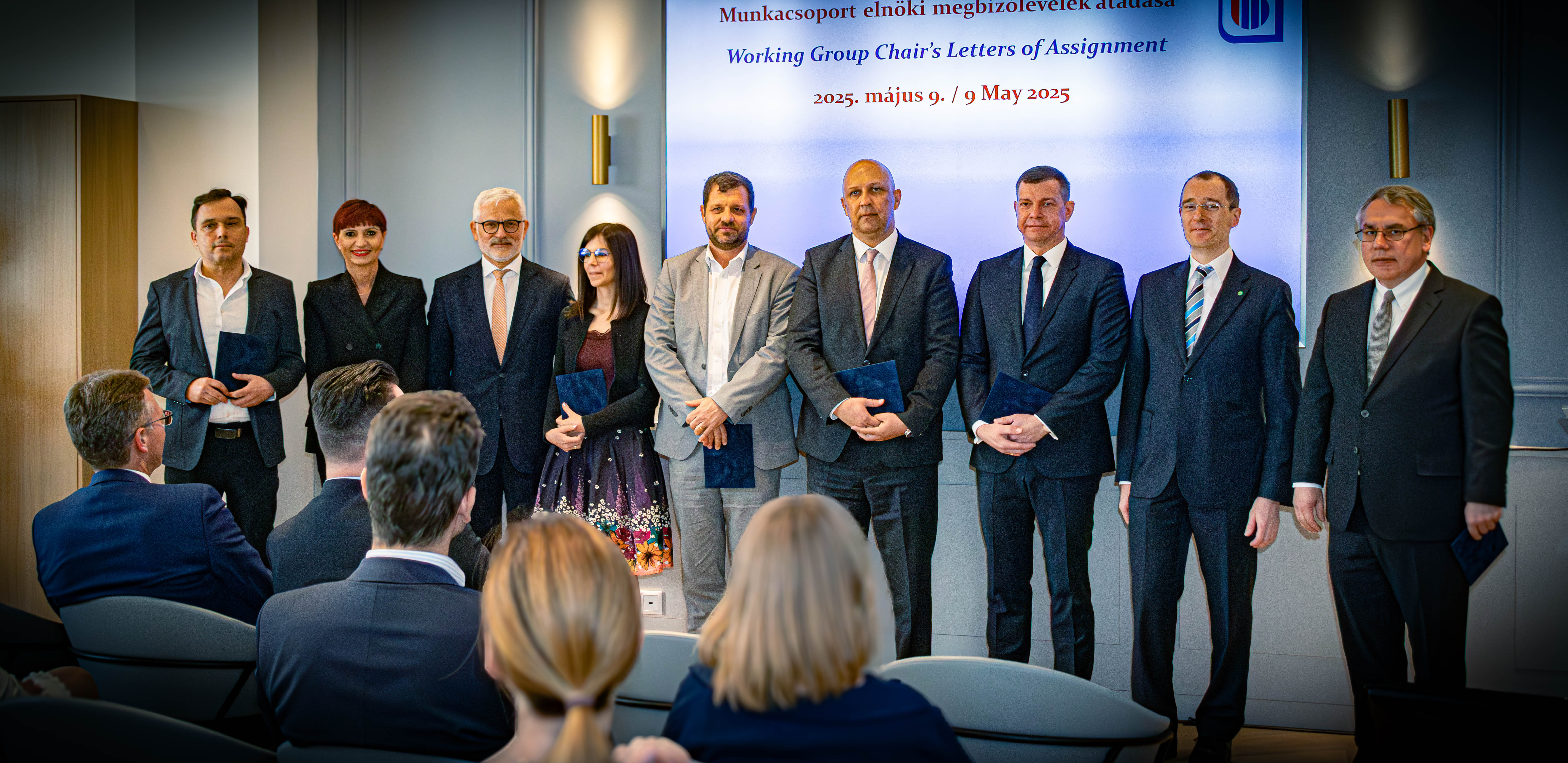
Budapest, 9 May 2025 Hungarian Banking Association
11th Hungarian Money Week - PENZ7 (March 3-7, 2025) is a great success all over the country
PÉNZ7 in Hungary developing financial awareness, entrepreneurial skills and cybersecurity knowledge, has reached 212,000 students in 1,413 schools across the country, with 15,613 lessons and 715 volunteers this year countrywide.
Watch our film of the HMW 2025: https://youtu.be/TCvNgIiKpFY (English subtitle is available)
Grateful thanks to the volunteers for joining us for the 11th PENZ7 with an outstanding number. Please see here the map representing the residency of the volunteers:
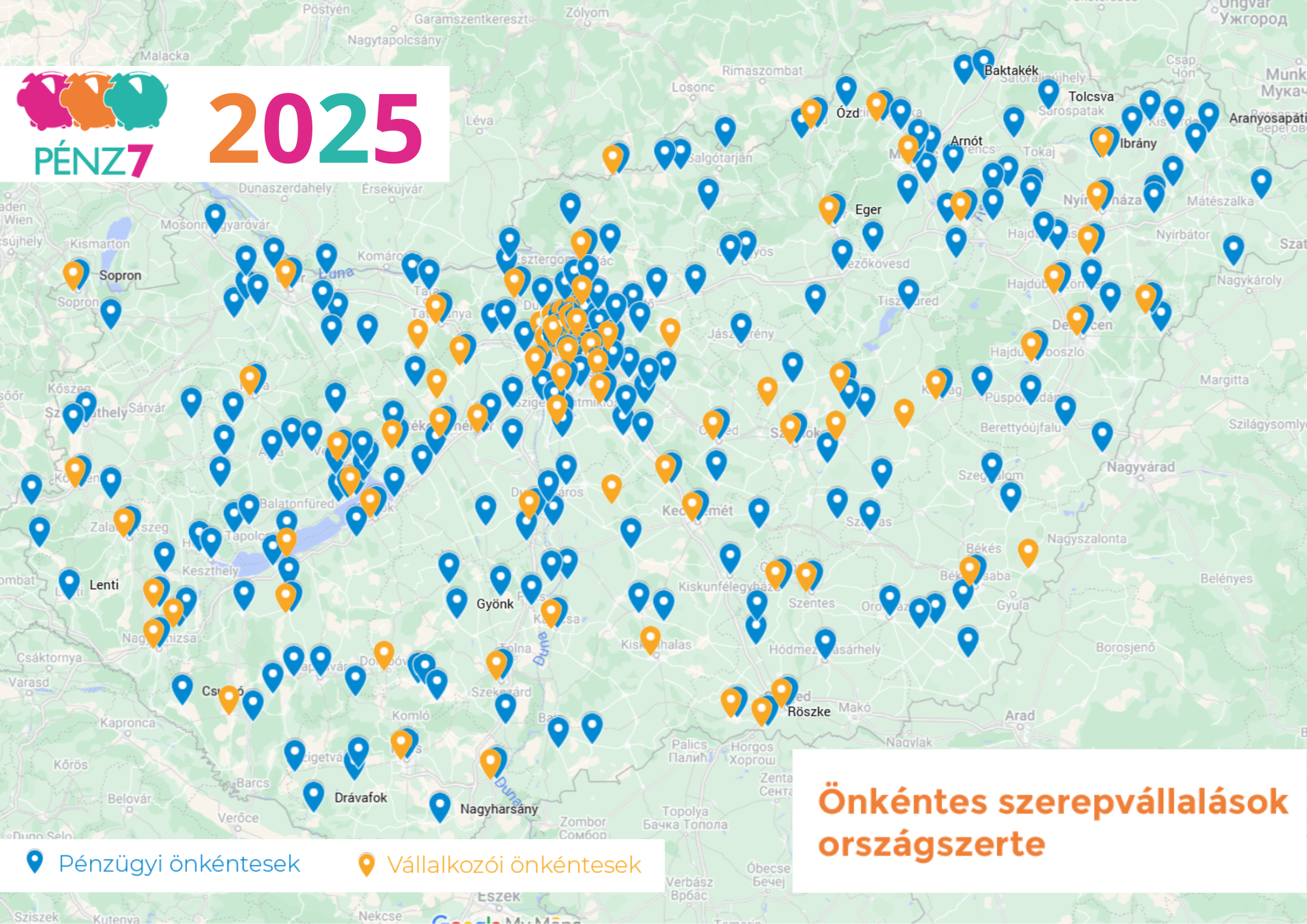
PENZ7 OPENING ceremony, 24 February 2025, Haris Park https://penz7.hu/hir-reszlet.cshtml?hirId=154&pg=0
The official opening event of the PENZ7 happened with the participation of the supporting ministries and the professional organizations.

PENZ7 award was presented to the most active corporate partners: Hungarian State Treasury and Money Museum.

PENZ7 youth adventure book introduction, 4 March 2025, Money Museum https://penz7.hu/hir-reszlet.cshtml?hirId=158
At the launch of the adventure book that forms the backbone of the cybersecurity curriculum, PENZ7 hosted the author of the book and the organisations involved in the development of the curriculum.
Financial Culture Ambassador Award was presented to Ákos Solymos, the author of the cybersecurity adventure book 'Frici, Fülöp és a hackerek', for his work and support on the PENZ7 cybersecurity curriculum.
Institutional award was presented to VISA for its activities in encouraging cyber awareness.

PÉNZ7 Digitális Szimat Kihívás (Digital Sniffing Challenge) https://penz7.hu/penz7-digitalis-szimat-kviz.cshtml
Digital Sniffing Challenge gives you, regardless of age, the opportunity to test your digital security knowledge.
This year renowned influencers tested their knowledge with us again:
https://www.youtube.com/watch?v=0Zh3pIX6Nlk&t=2s
https://www.youtube.com/watch?v=shGgvSOm4NA&t=1s
https://www.youtube.com/watch?v=DYHyWW033wg
Banners created with the influencers can be viewed online and offline countrywide:

PENZ7 supporting programs: https://penz7.hu/kiseroesemenyek.cshtml
PENZ7 classroom education is traditionally enriched with valuable complementary programs. This year, a diverse array of engaging and interactive activities provided additional opportunities for students to deepen their knowledge of PENZ7 topics.
FINTELLIGENCE International Scientific Conference (Miskolc) is one of the recurring programs among the PÉNZ7 events, which this year also offered many experts and excellent presentations: https://www.penz7.hu/hir-reszlet.cshtml?hirId=3
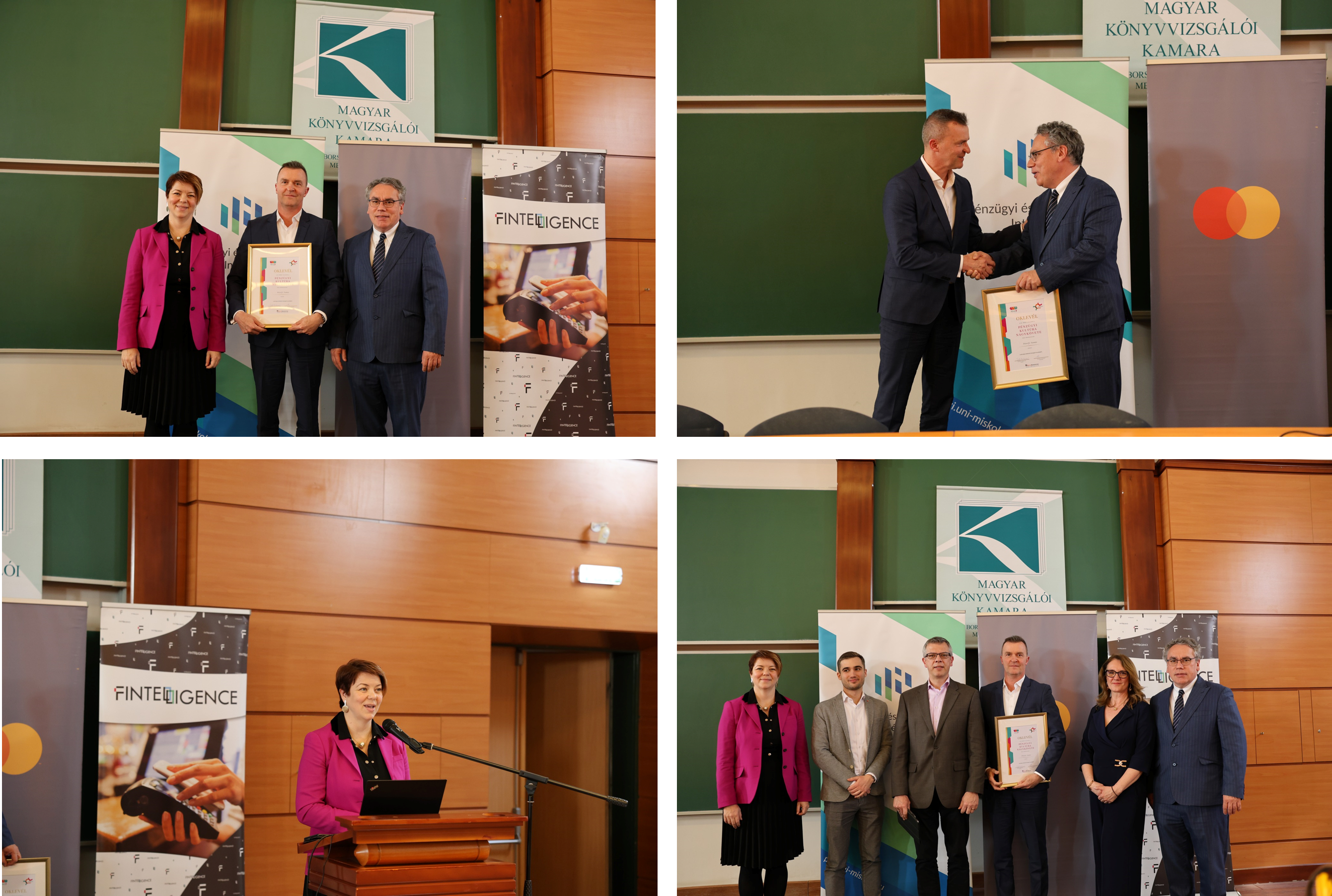
Médiaunió press release: https://mediaunio.hu/veszelyben-a-ferfiak-masfel-ev-alatt-duplajara-nott-az-atvertek-szama/
Grateful thanks to all the contributors, partners and organisers.
Hungarian Banking Association - Communication
PRESS RELEASE
The interest rate on Széchenyi Card investment loans, agricultural investment loans and leasing facilities will be reduced to 3%, and on Széchenyi Card overdrafts, tourism loans and liquidity facilities to 4.5%, in the spirit of burden sharing between the banking sector and KAVOSZ for new contracts signed after 1 March 2025. This will give businesses access to new loans at half the interbank reference rates. This measure can provide the funds required for further growth.
One of the banking sector's best-known core task is to finance sustainable economic development, which it can best ensure in a pure competitive market environment.
In order to be able to invest in operational efficiency and produce higher-quality or less energy-intensive products, businesses typically need substantial amounts of bank credit at prices matching their profit-generation capabilities. In the business sector, micro, small and medium-sized enterprises stand out for the way they span all areas of the economy, playing an essential role in innovation, the employment of a large workforce, flexibility, and in filling market gaps. With this in mind, the various Széchenyi Card credit schemes have become successful and popular among Hungarian micro, small and medium-sized enterprises, with significant Government support. Banks participating in the programme sell these products pursuant to the conditions set out in the KAVOSZ regulations, subject to its pre-screening and intermediation, with the guarantee of Garantiqa Hitelgarancia Zrt. and AVHGA.
In order to ensure that the growth of newly disbursed Széchenyi Card overdrafts, tourism loans, investment loans, agricultural investment loans, liquidity facilities and leasing transactions continues, participating banks and KAVOSZ - in line with the Government's previous measures, i.e. the Demján Sándor Programme, which, since 1 November 2024, has been offering investment-type Széchenyi card loans at a rate starting from 3.5% - will ensure the reduction of interest rates on the above loan products by a uniform 0.5% from 1 March 2025. This reduction can be ensured by participating banks and KAVOSZ by paying 0.4% and 0.1% of the fees, respectively. They are doing this in order to ensure that the credit volumes of relevant businesses can grow. The more favourable pricing offers another opportunity for Hungarian micro, small and medium-sized enterprises to start new investments, boost their efficiency and competitiveness, increase and improve their production and/or reduce their energy consumption.
3 February 2025 Hungarian Banking Association
CYBERSHIELD PRESS BRIEFING - Experts to expect increase in online fraud as Christmas approaches
The upcoming festive season could see an increase in cybercriminal activity and online fraud - as financial, law enforcement and banking experts warned at a press briefing in Budapest.
On 20th November, a press briefing was held about the CyberShield project, which was launched two years ago in cooperation with several organisations (Hungarian Banking Association, MNB, NGM, IM, Hungarian State Treasury, SZTFH, NMHH, NVSZ, NKI, ORFK). At the event, which was well received by the press, one of the points made was that the weakest link is still the individual person, who in most cases voluntarily gives over his or her data to cybercriminals. "Despite the technology and the effortful work of the digital experts working in the background for security, we often learn that people open the 'door' themselves and let the fraudsters in," said Ágnes Sütő, Deputy Secretary General of the Hungarian Banking Association.
They use sophisticated and evolving methods, often taking advantage of their victims' social situation, lack of information, shopping habits or loneliness. Fraudsters do not discriminate between social groups, gender or even age and can target any of us indiscriminately. As fraud increases rapidly during the festive season and other peak shopping periods, prevention and awareness are the main ways to combat against it, which is why the discussion in the ORFK building was highly well-timed and will be repeated at regular intervals to maintain interest and keep up to date with new fraud tricks and thus raise more awareness.
(based on MTI News)

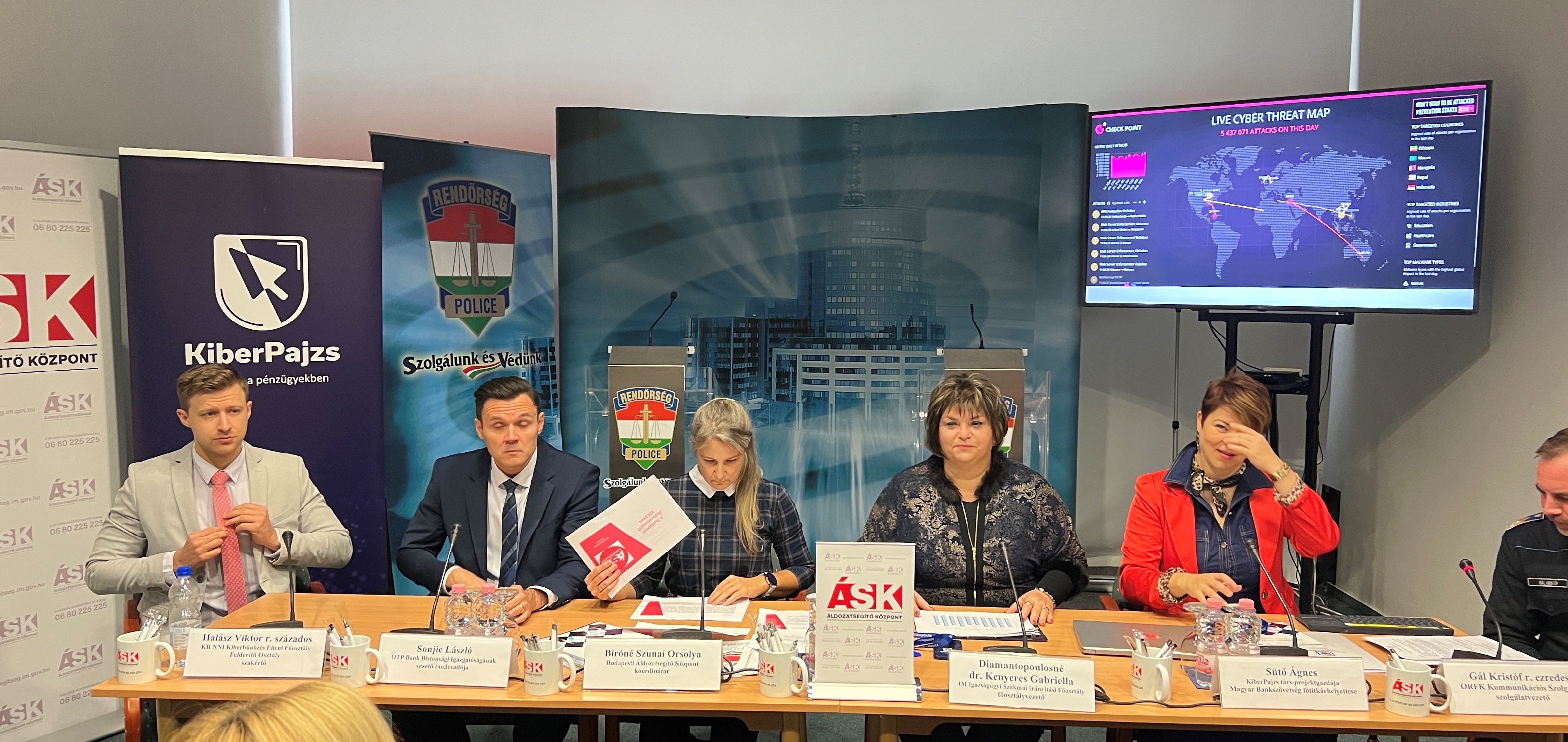
(Participants of the discussion:
Viktor Halász, Police Captain of the Investigation Department of NNI Cybercrime Division of the Rapid Response and Special Police Service
László Sonjic, Senior Advisor, OTP Bank Security Directorate
Orsolya Bíróné Szunai, Coordinator of the Budapest Victim Support Centre
Gabriella Diamantopoulosné Dr. Kenyeres, Head of the Department of Judicial Professional Management of the Ministry of Justice
Ágnes Sütő, Co-Project Manager of CyberShield, Deputy Secretary General of the Hungarian Banking Association
Kristóf Gál, Police Colonel, Head of the Communications Service of the Hungarian National Police Headquarters)
Banking Blood Donor Week celebrates its Jubilee! Sector-wide collaboration has begun for the 5th time
Bankers join forces to raise awareness of charity that heals and saves lives
Budapest, 14 October 2024
The Hungarian Banking Association and representatives of the Hungarian banking sector are organising the Banking Blood Donors' Week for the 5th time. The aim of the event, to which the National Bank of Hungary has been a partner for several years, is to raise awareness of the importance of blood donation among bank employees at sector level and contribute to the production of thousands of blood products through voluntary blood donations.
This year, the now traditional event has been extended to a whole month. The event titled Banking Blood Donor Month 2024 will take place between 8 October and 8 November 2024, with blood donations in 20 banking locations (18 in Budapest and 2 in the countryside). Management and staff members from the National Bank of Hungary (MNB) will also join the event series - expanding the programme into a true cross-sectoral collaboration scheme. The collected blood will be used to make thousands of life-saving blood products to help patients recover.
With the help of the National Blood Transfusion Service, which coordinates the professional tasks of the programme, and the Hungarian Red Cross, the staff members of financial institutions will volunteer to donate blood at banking locations and blood centres in Nyíregyháza and Békéscsaba, in addition to Budapest.
Speaking at the opening event at UniCredit Bank, Csaba Kandrács, Deputy Governor of the National Bank of Hungary (MNB), said ‘MNB has organised 10 blood donations in the past year, where our colleagues gave blood more than 1 100 times - an increase of about 10% year-on-year. This has helped more than 3 000 of our fellow citizens in their recovery, which is clear proof of the power of working together towards a common goal.
In his speech, Barnabás Virág, Deputy Governor of MNB, urged everyone who has the potential to do so, to donate blood, and if possible, more than just once a year. This is not only a contribution to the recovery of our fellow citizens, but such selfless acts of kindness also help us draw attention to the importance of social solidarity and to helping each other. He expressed his gratitude to the donors and his hope that more and more people will follow the banking community’s example.
Sándor Nagy, Medical Director of the National Blood Transfusion Service, thanked the banking sector for its continued and ever-intensifying blood donation efforts.
On the occasion of the 5th anniversary, the National Blood Transfusion Service awarded a certificate to the Hungarian Banking Association in recognition of its outstanding organisation of the event.
On behalf of the Banking Blood Donors' Week, Radovan Jelasity, President of the Banking Association, himself a regular blood donor right at the forefront of the programme with more than 50 donations to date, said thank you to all those who donate blood to support the recovery of others, and expressed his hope that the example set by the banking community will be followed by ever more people. Levente Kovács, Secretary General of the Banking Association, extended banking blood donations from one week to one month to ensure continuity of blood supply. Between 8 October and 8 November, a total of 20 blood donations will take place under this programme at external sites.
In Hungary, five hundred thousand units of blood are needed every year to ensure a safe blood supply, which, in turn, requires around half a million voluntary blood donors. It takes between 1 600 and 1 800 blood donors per day to help maintain a safe blood supply.
Every donation counts - it saves lives.
BACKGROUND:
Members of the banking sector united as one under the auspices of the Hungarian Banking Association during the Covid pandemic, when the GOOD DEED BANK initiative, a joint CSR programme of the banking sector, was created. GOOD DEED BANK embraces initiatives where joint action is required for success, such as
blood donation during the Banking Blood Donor Week. The activities of GOOD DEED BANK were recognised with Mastercard’s ‘Social Initiative 2021’ Special Award. One of the key events organised by GOOD DEED BANK is the Banking Blood Donor Week, during which bankers in Hungary donated thousands of units of blood in recent years to help patients’ recovery. In 2022 and 2023 the programme was extended to two weeks, increasing further to a full month in 2024, also reaching several locations in the countryside.
In 2022, as part of the Banking Blood Donors' Week, the Hungarian Banking Association launched a poster design competition to raise awareness of the importance of blood donation through the unique works of young artists from the Moholy-Nagy University of Art and Design. The posters have since helped raise awareness of this social duty.
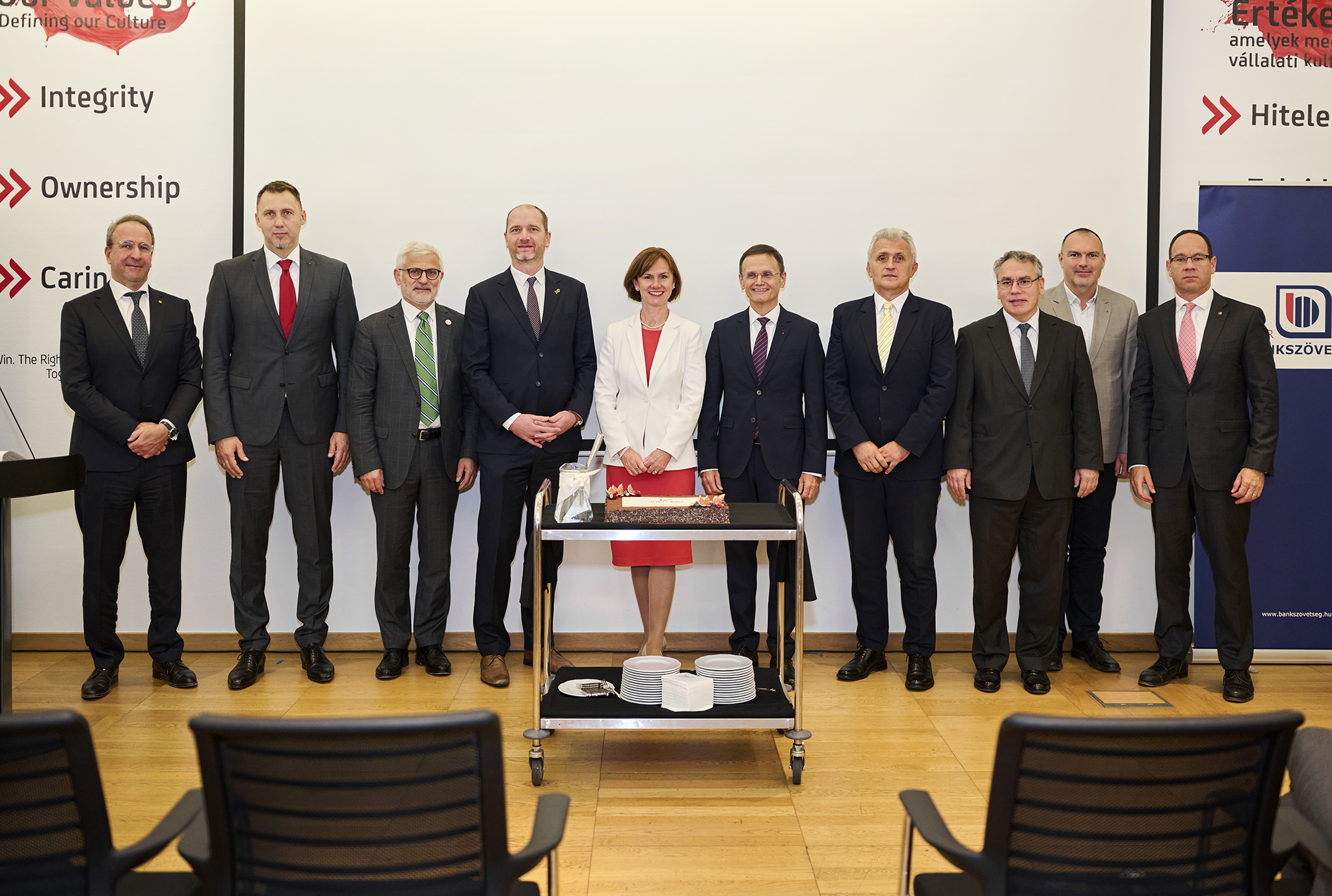
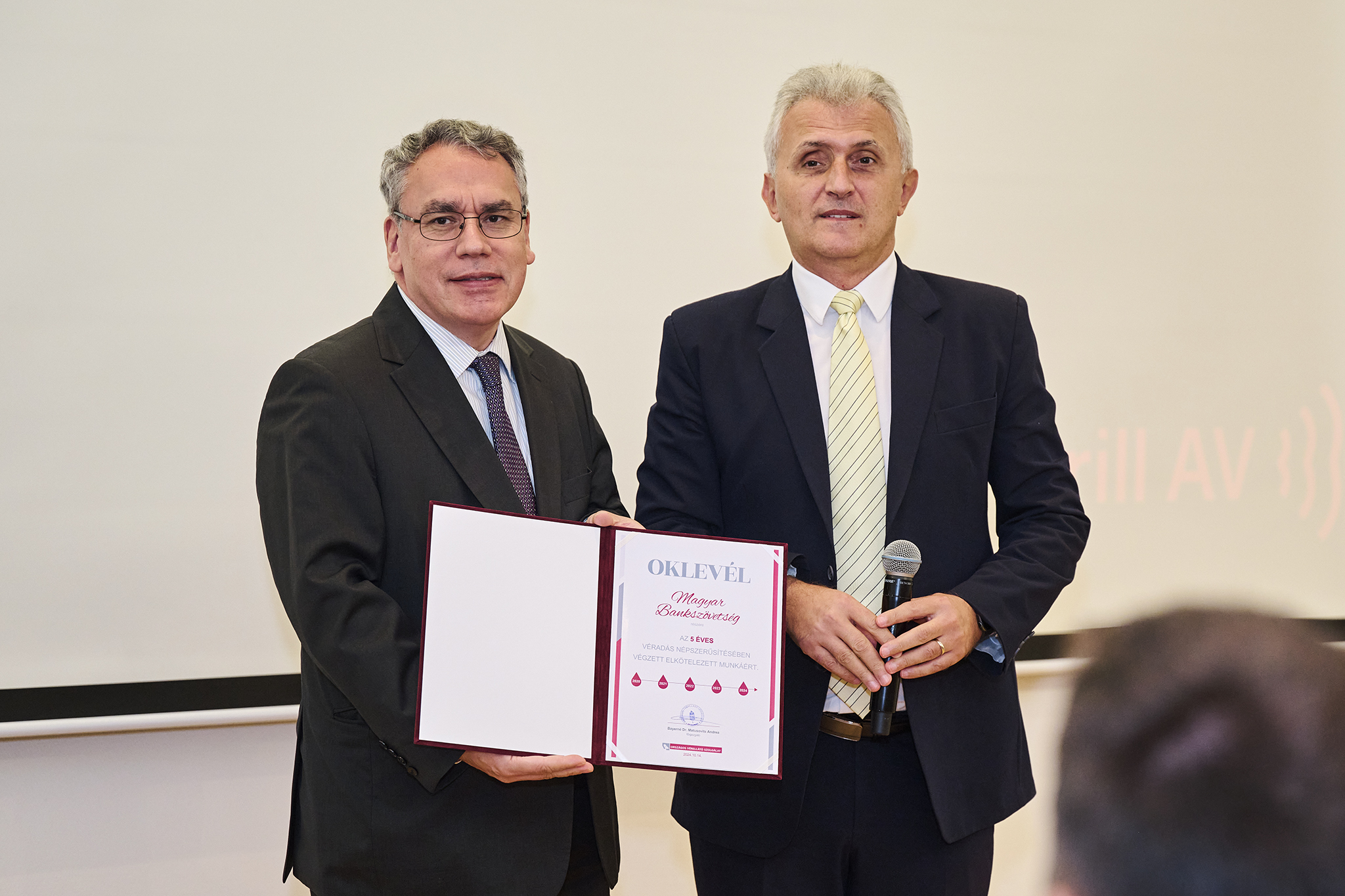

(Photos: Márk Kiss)
Hungarian Banking Association
14 October 2024
Press release - Apple subscriptions resolved
Budapest, 7 October 2024 – The sector-wide correction of erroneous Apple App Store subscriptions has been completed - no individual customer notifications were needed for resolving the items
The Hungarian Banking Association confirms that the sector-wide correction of duplicate credit card transactions affecting customers of the Apple App Store detected as of the night of 30 September 2024 has been successful.
The Apple error (the multiple booking of specific items) was also experienced in several countries outside Hungary, affecting customers of Hungarian banks through more than 440 000 incorrect transactions. The banking sector, without requesting the filing of individual complaints by affected customers, immediately made significant efforts, in close co-operation with the National Bank of Hungary and the experts of the card companies, to ensure that only legitimate monthly subscription items in force pursuant to their contract with the Apple App Store were debited and charged to their customers.
The Hungarian banking sector, in co-operation with the Mastercard and VISA card companies and with the continued involvement of the National Bank of Hungary, has paid particular attention to ensuring that duplicate items are only debited once.
Thus, for each affected customer in Hungary, the amount of multiple transactions initiated by Apple was deducted only once, which the affected customers can check in their account history.
We are confident that the competent regional and international authorities and bodies will take effective measures to support operators in drawing the correct professional conclusions, and prevent future cases similar to the transactions erroneously initiated in June and this time.
7 October 2024
Hungarian Banking Association
Another Apple case: both MNB and the Hungarian Banking Association are closely monitoring events
Budapest, 1 October 2024 - MNB and the Hungarian Banking Association are taking steps to ensure customer safety and financial market stability in the wake of the most recent Apple-related disruption.
The National Bank of Hungary (MNB) has been informed of repeated payment problems related to Apple. In response, MNB immediately contacted payment service providers and initiated measures aimed at protecting customers. The central bank is closely co-operating with the Hungarian Banking Association, which is in regular work contact with the central bank.
From the very first period of payment problems, it has been clear that most banks are better prepared than before and have taken immediate action to ensure customer safety. According to first, as yet unconfirmed data, this means that far fewer customers are affected by the disruption than in the past.
MNB, whose priority is the stability of financial markets and the safety of its customers, will keep audiences informed.
Budapest, 1 October 2024
Banks are working on the management of duplicate Apple transactions - with the cooperation of the MNB and the card companies
On the night of 30 September 2024, due to a technical error, Apple's App Store duplicated the booking of items that had been previously booked but not yet settled financially. More specifically, in certain cases Apple initiated the collection of the current monthly batch of outstanding subscriptions twice. The technology glitch is reportedly an international problem, affecting cardholders in around 20 countries.
As a result, affected Hungarian cardholders may come across temporary double-bookings on their outstanding subscriptions, which, however, have not been paid a single time.
Hungarian banks, in close co-operation with MNB, are monitoring the items, also taking into account the findings gained from the Apple technology glitch in the summer, and making sure each item is only debited once, in line with the update issued by Apple.
It is recommended that customers also check their account history in a few days’ time to make sure any sums outstanding under the current contract are paid correctly. Should they find any discrepancies, they should report them to the bank's customer service.
Budapest, 1 October 2024 Hungarian Banking Association
New law comes into force against online criminals
On 17 July 2024, the Ministry of Justice (MoJ), the Hungarian National Bank (MNB) and the Hungarian Banking Association (MBSZ) held a press conference to present the new legislation that will enter into force on 1 August 2024 to help combat online criminals effectively.
Minister of Justice Bence Tuzson said that a package of laws to use the law to take action against online criminals was submitted to Parliament this spring at the initiative of the IM, in cooperation with the Ministry of National Economy, the MNB and the MBSZ.
The government's aim with the new package of laws was to speed up the detection of criminal offences.
The MNB expects banks to use a real-time abuse screening system to detect transactions that could be suspected of abuse immediately, before they are executed, across billions of transactions.
More recently, fraudsters are increasingly using targeted phishing, where attackers use public information, including that available on social media, to lure potential victims with personalised messages. This is why it is necessary to look for points in the fight against fraud where it is necessary to strengthen defences," he said.
Levente Kovács, Secretary General of the MBSZ, stressed that it is necessary to be able to recognise cyber fraudsters and their methods, and preventive information has an essential role to play in this.
17 July 2024
Translated with DeepL.com
Press release
Almost all sectors, including the banking sector, have been victims of the war. As well as bearing the market consequences of economic uncertainties, the banking sector has been disciplined and cooperative in bearing the burden of many government measures, and therefore refuses to claim that it has made extra profits in wartime.
The unpredictability of a series of government burdens and measures severely limits the banking sector's lending capacity, international competitiveness and stimulative role.
In addition, the measures published in the Hungarian Gazette on Monday night will further increase the competitive regulatory advantage of fintech providers of cross-border services. The extra profit tax, bank tax and ATM deployment rules originally introduced for two years (2022 and 2023) will not apply to these providers, while the tightening transaction levy rules have been shown to have limited enforcement effect on them.
Meanwhile, the Hungarian banking sector, as the operator of the financial intermediary system, is one of the government's most important partners in the implementation of economic policy: from pandemic management to family policy, from SME financing to digitalisation and infrastructure building, it has proven and continues to prove its commitment every day.
9 July 2024
Translated with DeepL.com
Press release: Apple app store credit card payment problems
Apple's app store erroneously charged large volumes of Hungarian bank card accounts for several hours after 6pm on 26 June 2024.
Thanks to the swift reporting of the erroneous transactions by the affected Hungarian cardholders, the banking sector was informed and, as an intermediary, took immediate action to address the situation.
Accordingly, the banking sector contacted the service provider.
Based on the information available so far, the transactions concerned relate exclusively to past or current subscriptions or purchases with erroneous technical repetition. Purchases or cash withdrawal transactions on physical terminals are not affected.
According to Apple, there are no indications of misuse, no misuse of customer data, no data has been compromised. Apple is accepting related customer inquiries.
Based on their feedback, Apple is in the process of refunding the amounts incorrectly charged due to a technical problem.
27 June 2024
Hungarian Banking Association
Translated with DeepL.com
HELP! I have been a victim of cyber fraud! Who should I contact?
To facilitate effective and professional banking communication with victims of online financial abuse, the Hungarian Banking Association has issued a recommendation to its members
Anyone can become a victim of online fraud, regardless of age, gender, education, financial situation, upbringing, ideology or social status.
Experience has shown that, although some people are at higher risk of becoming victims of online fraud, it is by no means possible to clearly define and/or delineate psychological characteristics that can be identified as a characteristic of the target victim group.
The Hungarian Banking Association has prepared a recommendation in the framework of the CyberShield Programme, with the involvement of the Victim Support Centre of the Ministry of Justice, the Hungarian National Bank and the National Police Headquarters as professional cooperating partners.
The aim of the recommendation is to help bank customer services to communicate professionally and effectively with victims of financial abuse in the online space. It summarises the process for reporting online financial abuse by bank customers and the recommended principles for customer service communication to bank staff.
The technical material produced serves to harmonise two different aspects: on the one hand, to ensure that the bank's customer service is empathetic and compassionate in its communication with victims of online financial abuse. On the other hand, to accurately record the incidents reported by the victims, which the bank needs to investigate and then take the necessary measures to prevent further damage.
The full content of the recommendation is not made public because the technical details would help fraudsters to map out their customer handling processes, so that they could even more convincingly present themselves as "banking experts".
In case of abuse, it is essential that the customer should report the incident to the bank immediately! This is the REPORT. The most common form of reporting is to call the call centre/customer service, less often customers visit the branch in person. After contacting the bank, it is important that the REPORT is also made to the Police.
The technical material has been produced at the initiative of the Ministry of Justice (MoJ) in cooperation with the CyberShield Programme, to help banks communicate professionally and effectively with victims of online fraud.
IM's victim support service is linked to the CyberShield programme in several ways. In addition to consumer protection and victim assistance, the work of the recently formed legal sub-group also relies on the work of the Ministry. The experience gained since the IM joined the project confirms both the need and the usefulness of its participation in the project," said Dr Gabriella Diamantopoulos, Head of the Department of Justice Professional Management at the Ministry of Justice (MoJ). She said that the main focus is on communication with victims of online financial abuse, and that the programme is also trying to help with statistical data and, of course, legislative changes to reduce fraud.
In her presentation, Dr Julianna Dávidné Dr. Hidvégi, clinical psychologist, spoke about how bank counsellors can prevent customers who have become victims of online fraud from becoming secondary victims.
She stressed that it is important to prevent bank counsellors from being unprepared for the emotional reactions of victims of online fraud and to avoid, as far as possible, the client being victimised. Once an online fraud has occurred, it cannot be undone. However, the ability to become an active part of society again depends on the personal choice of the victim.
The press conference was hosted by OTP Bank. Six months ago, the bank decided to set up a special call centre for fraud victims at the Bank Security Directorate. As part of the restructuring, the bank's Call Centre has been replaced by a dedicated team to deal with victims. "The experience of the last six months shows that we have made the right decision to ensure that customers who have been victims of fraud can quickly reach us on the dedicated line. Today, we are receiving more and more calls where our customers ask for advice on how to prevent fraud, but recently we also had a case where fraudsters called our customer who became suspicious and called our Anti-Fraud Call Center, so with the guidance of our colleague they were able to prevent a remote access program from being downloaded to the customer's device," said Gábor Bucsek, Head of OTP Bank's Bank Security Directorate. OTP Bank has recently given its customers a new tool to fight fraudsters, introducing a transfer limit on 8 May, which most mobile bank users have already set much lower than the original HUF 1 million limit in the weeks since its launch.
The daily transfer limit is being introduced and successfully used by an increasing number of institutions in the banking sector, in line with the relevant MNB recommendation. As a bank customer, it is worthwhile to check it out and adapt your daily limit to your own needs based on your financial habits.
depends on.
The police have also sent a message of war to the perpetrators and have set a new basis for investigating this type of case.
The police's commitment to fighting cybercrime is also reflected in the numbers, with a 23% reduction in online fraud in the first quarter of 2024 compared to the first quarter of 2023.
Since 1 January 2023, investigators have arrested and questioned 688 people as suspects and identified more than 350 people as suspects.
In terms of their role, 48 persons are in managerial positions, 456 are stewards and 93 are organisers at different levels of the criminal organisation hierarchy. Since the beginning of last year, 105 arrests and 9 criminal supervision orders have been issued by the courts. Currently 56 persons are under arrest.
The perpetrators have caused more than HUF 30 billion in damages to nearly 17,000 people.
The units are paying special attention to the detection of fraudulent call centres, one possible way of which is to identify the IT system that enables the calls. The case was investigated by police at five locations and three people were handcuffed.
Proceedings against them for fraudulent use of an information system to cause significant damage to business are still ongoing.
Although criminals with the latest IT skills, banking, sociology and psychology are unscrupulous in their attempts to take money and personal details from unsuspecting people, the police are doing their utmost to prevent this from happening again.
www.kiberpajzs.hu
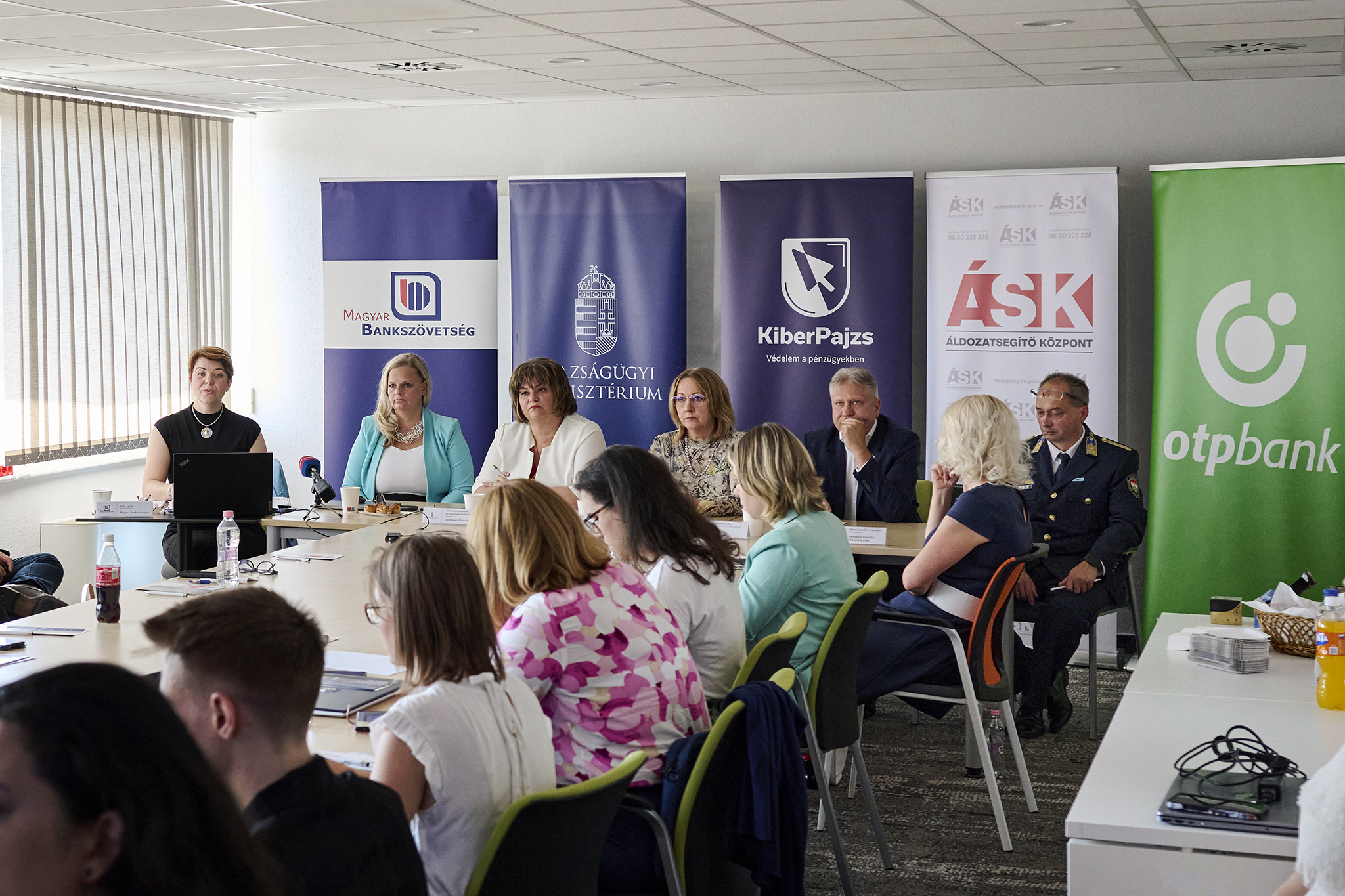
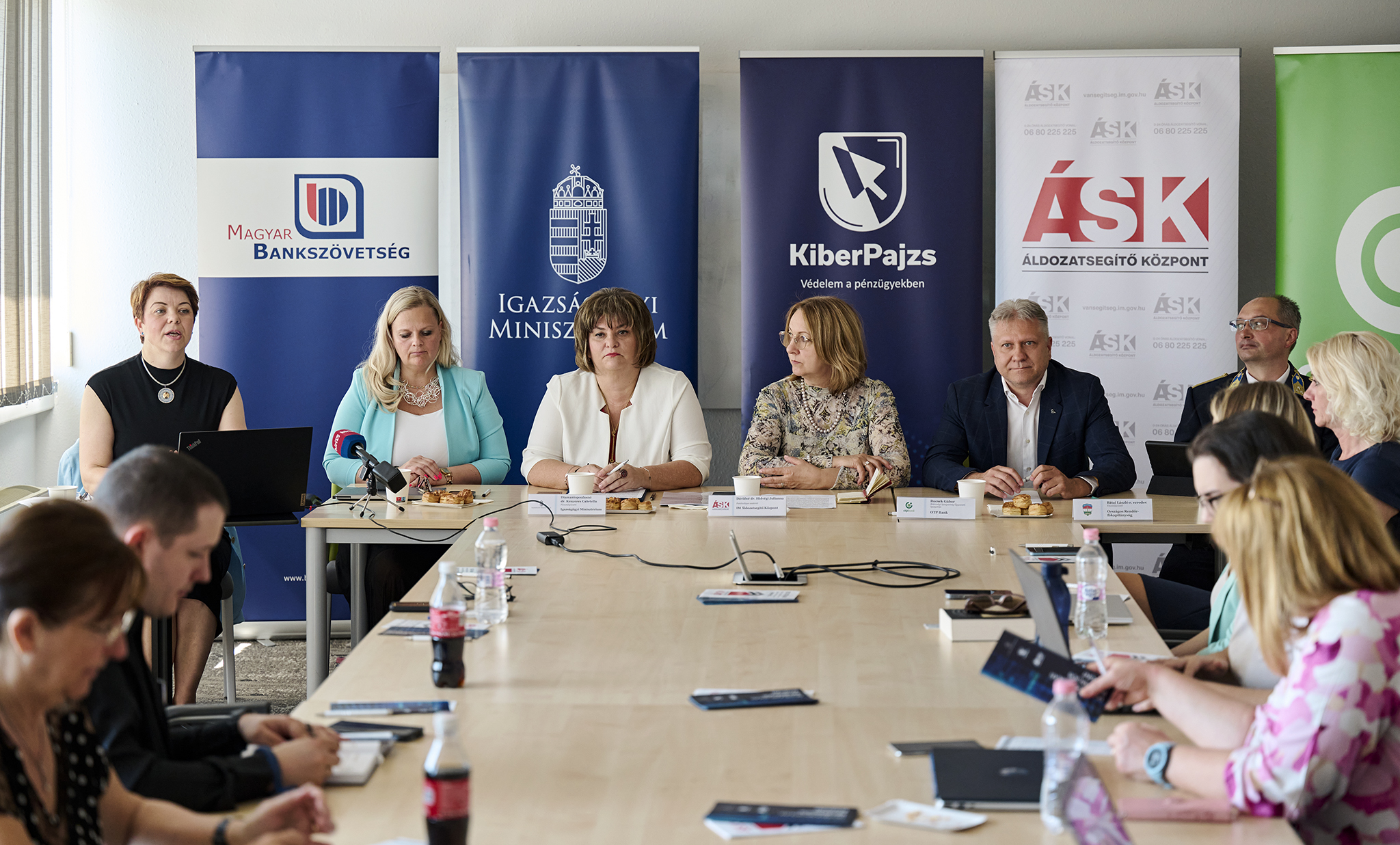
- End of the press release -
As background:
CyberShield
In order to prevent and curb financial abuse in the digital space, the Hungarian National Bank, the Hungarian Banking Association, the National Media and Infocommunications Authority, the National Cyber Defence Institute of the National Security Service and the National Police Headquarters signed an agreement called "CyberShield" in November 2022. The cooperation was later joined by the Ministry of Justice, the Ministry of Economic Development, the Hungarian State Treasury, the Regulated Activities Supervisory Authority and the National Defence Service.
The aim of the CyberShield programme is for customers, together with public authorities and market players, to create a "bulletproof" defence against digital criminals. Under the KiberShield project, a wide range of coordinated communication campaigns on cybersecurity risks and ways to protect against them are being conducted by institutions and market players, and the Media Union Foundation as a communication partner (kiberpajzs.hu, akulcstevagy.hu).
But CyberShield is more than just communication. Throughout the year, intensive cooperation will take place to analyse and further develop cybersecurity processes in the public authorities and the market. In addition, there is an ongoing exchange of professional knowledge and best practices at national and international level to achieve stronger and more effective financial cyber defences.
Translation: DeepL
Communiqué issued by the General Meeting of the Hungarian Banking Associatione General Meeting of the Hungarian Banking Association
Founded 35 years ago, the Hungarian Banking Association held its anniversary celebratory conference and General Meeting today, which was attended by, beside banks’ executives, government leaders responsible for the economy and finances, as well as 11 foreign banking association delegates. Márton Nagy, Minister for National Economy, informed participants about the as-is status the Hungarian economy. István Nagy, Minister for Agriculture, spoke about the best way of ensuring liquidity for businesses and sustaining the competitiveness of production under the current, more challenging circumstances; while Barnabás Virág, Deputy Governor of MNB, addressed the current challenges of monetary policy. A cooperation agreement between the Ministry of Agriculture and the Hungarian Banking Association was signed.
At the General Meeting, the members decided to publish the following communiqué.
The wars in our neighbourhood and in the world constantly pose a challenge to democratic countries, including the Member States of the European Union. War evolvements cause uncertainty in energy prices and supply chains, the rearrangement of foreign trade flows due to the sanctions, the sense of escalation of war and the financial expenditures required for self-defence constantly hinder predictable economic development opportunities. Hungary is particularly sensitive to this, as its opportunities are significantly limited by the foreign economic environment due to its highly concentrated foreign market relations and small and open economy.
In recent decades, the open economy based spectacular development has been ensured by the adoption of market rationale. This demonstrates that the banking sector can operate most effectively and contribute to economic development on a market basis. That is why we support market-based development, that is why we are committed to financing investments in Hungary and Hungarian investments abroad And that is why we fight against market-distorting effects such as the sectoral surtax resulting in over-taxation, the interest rate cap and over-bureaucratized rules, as well as such legal framework that regulates the same activity in a different way and gives an advantage to the banks' new competitors. Today, these are the main obstacles to increasing European and regional competitiveness.
The Ministry of Finance contributes to the stabilization of the budget and the reduction of high inflation through fiscal rigour, while the Magyar Nemzeti Bank contributes through the central bank's interest rate policy. And the Ministry for National Economy is trying to give a new boost to the Hungarian economy by increasing investments. We can responsibly welcome actions to curb inflation, the targeted interest rate-subsidized credit facilities and decisions to support market processes, all of which contribute to the rapid recovery of the economy.
Digitalization is penetrating banking processes more and more deeply. On the one hand, this means more competitive, more customer-friendly and, ultimately, lower-cost services. In-depth digitalization helps electronic financial solutions popular with customers to gain ground. Digitalization is also helping to displace the expensive cash that fuels the grey economy and leads to the emergence of new social norms. Another effect of digitalization is the emergence of cyber crime. Cybercrime is a criminal category that law enforcement agencies are responsible for eradicating. In addition to the banks' very significant preventive IT efforts, customers can be protected by providing information and developing their financial literacy. The Cyber Shield program, organized jointly with the MNB, government agencies and other partners, and the continuous awareness-raising media appearances implemented together with the Media Union Foundation contribute to this. This can help reduce the number of victims of cybercrime, but the ultimate solution will be successful crime detection.
At the anniversary event, recognitions were also given based on the results of the last year/decade.
The Golden Beehive Award honour was conferred on:
- Sébastien de Brouwer (EBF)
- Gergely Fábián (NGM)
- Judit Gondos (PM)
- Ágnes Hornung (KIM)
- Anna Kósa (Erste)
- Péter Kovács (MagNet)
- István Nagy (AM)
- Ákos Tisza-Papp (MBH)
- István Tresó (K&H)
- Katalin Werny-György (OTP)
The Golden Beehive Medallion Award was conferred on:
- Tibor Pataki (MNB)
- Katalin Szenes (ÓE)
The Polish delegation awarded the Copernicus Medal to Levente Kovács (Hungarian Banking Association) for his work in the development of the banking sector.
In addition, 8 persons were assigned for the positions of Chairman of Banking Association Working Group and chief advisor by handing over their credentials.
Budapest, 10 May 2024 Hungarian Banking Association
Visit of the Banking Associations of Croatian, Serbian and Slovenian Countries
On 11-12 April 2024, the Hungarian Banking Association hosted the members of the Boards and Secretaries General of the Croatian, Slovenian and Serbian banking associations. The two-day event provided an opportunity to discuss competitiveness, digitalisation and fraud prevention.
On 12 April 2024, Mr Gergely Fábián, State Secretary for Industrial Policy and Technology of the Ministry of National Economy, gave a presentation entitled "The current state of the Hungarian economy". From the Hungarian National Bank, Anikó Szombati, Managing Director, summarised the digitalisation situation of the Hungarian banking sector. Finally, Lajos Bartha, Managing Director of the Hungarian National Bank, gave an update on cyber protection and fraud prevention.
Translated with DeepL.com
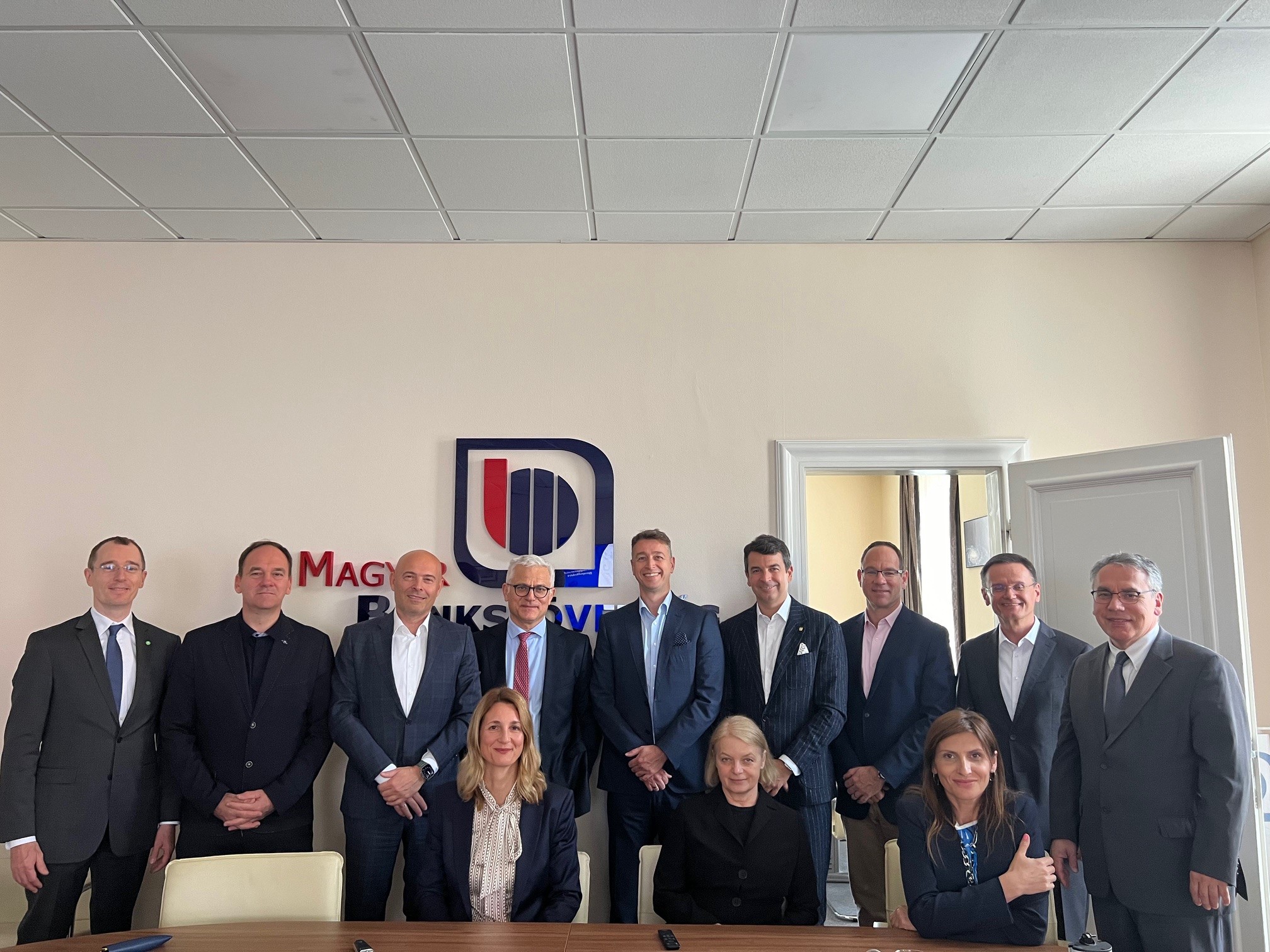
Hungarian Money Week (PÉNZ7) celebrates its anniversary!
OECD Secretary General Mathias Cormann has welcomed the Hungarian PÉNZ7 in a video message, highlighting Hungary's commitment to developing financial awareness and knowledge among young people.The 10th PÉNZ7 kicked off on 4 March 2024, with thousands of schools across the country hosting a week of unconventional lessons supported by expert volunteers. This school year, the focus is on "Financial Life Lessons" in finance and "Think and Do" in entrepreneurship.
More than 200,000 students in 1,250 schools across the country are already taking part in the programme, which aims to develop financial awareness and entrepreneurial skills through 15,000 extraordinary lessons, with the help of 650 volunteers. In 2015, Hungary joined the European Money Week initiative, which is taking place simultaneously in around 35 countries across Europe, as a founding member, and we have also been a key participant in the global Global Money Week programme organised by the OECD/INFE for several years.
Hungarian PÉNZ7 2024 will take place from 4 to 8 March across the country.
The Ministry of the Interior is the project leader, while the Ministry of National Economy, the Ministry of Finance, the Hungarian Banking Association, the Pénziránytű Foundation and the Junior Achievement Hungary Foundation are professional partners of the week - the partner organisations consider their mission to educate the future generation in financial and economic matters, to shape their entrepreneurial spirit and to manage financial situations in everyday life in a conscious way.
This school year, in view of the anniversary of PÉNZ7, the organisers have prepared a comprehensive theme entitled "Financial Life Lessons". Schools can choose from a range of different thematic packages and corresponding online games. The digital curricula of PÉNZ7, which develops entrepreneurial skills, have also been further expanded.
To help them prepare, all the learning materials from previous school years (including sample videos, e-learning materials and webinars) are available at www.penz7.hu. Whether it is in class, technology and engineering, maths or history, students can learn the basics of finance and management in an interactive and experiential way.
The PÉNZ7 programmes are further enriched by the possibility for students to participate in interesting competitions and contests, and for schools to host financial and entrepreneurial volunteers.
The PÉNZ7 programme also supports the implementation of the objectives of the National Strategy for Financial Awareness adopted by the Government in 2017 and the SME Strategy 2019-2030 (Strategy for the Strengthening of Hungarian Micro, Small and Medium Enterprises), which aims to develop Hungarian micro, small and medium-sized enterprises.
The detailed programme of the week is available at www.penz7.hu.

(Translateted by: DeepL)
Active bank lending is a key to economic growth
The banking sector has a key role to play in supplying the credit required for sustainable economic growth. Active lending is the primary task of the banking sector responsible for this, in which the Hungarian Government is seen as a partner. Co-operation is demonstrated by on-going dialogue, predictability and agreements that are honoured. The banking sector has finally been able to increase the real value of its capital from the P/L of recent times, which is an essential prerequisite for the credit expansion required for rebuilding the economy.
In recent days, at the initiative of the Ministry of National Economy, we have reviewed current challenges to economic development and the macroeconomic environment. From the discussions, we have come to the conclusion that even in a rapidly declining interest rate environment, the current level of lending rates is a possible temporary constraint to credit expansion. Accepting the proposal of the Ministry of National Economy, the Hungarian Banking Association draws the attention of its membership, in a supportive manner, to the campaign aimed at boosting corporate lending. During the campaign, the interest rate premium above BUBOR on market-term corporate loans contracted between 1 February and 30 April 2024 and, in the case of investment loans, disbursed this year, can be waived by individual lenders for a period of 6 months. Commercial banks may accept this invitation on a voluntary basis, at their own discretion, in line with their own business policy objectives. The Hungarian Banking Association is confident that the reduction in corporate lending rates will provide a boost to Hungarian companies open to investment to start and complete their investments.
The Hungarian Banking Association also welcomes the end of the corporate interest rate freeze introduced in 2022. We are convinced that the discontinuation of market distorting measures, the reduction of significant burdens imposed upon the sector and the provision of the right conditions for market competition will result in better prices and conditions for customers, including companies that are implementing key investments and creating jobs – both being keys to recovery. In this we count on the support of the Government, the Ministry of National Economy, Partner Ministries and the central bank.
Budapest, 30 January 2024 Hungarian Banking Association
Continuation of CyberShield - Strengthened collaboration protects our money in cyberspace
Budapest, November 15, 2023 – The first year of the CyberShield program, which enhances digital security, has been realized through unprecedented collaboration. The experiences of the cooperation were summarized at a conference, and the continuation of the CyberShield program was announced.
Fake bank calls, deceptive online commercial offers, caller ID spoofing, callback phone scams (wangiri), phishing emails – these are just a few of the deceptive actions we encounter every day in the digital space. In order to prevent and reduce financial abuses committed in the digital realm, the Hungarian National Bank, the Hungarian Banking Association, the National Media and Infocommunications Authority, the National Cyber Security Institute of the National Security Service, and the National Police Headquarters entered into an agreement called "CyberShield" in November 2022. Later, the Ministry of Economic Development, the Ministry of Justice, the Hungarian State Treasury, and the Regulatory Activities Supervisory Authority also joined the collaboration.
The goal of the CyberShield program is for customers, authorities, and market players to collectively create "bulletproof" protection against digital criminals. Within the framework of the CyberShield project, comprehensive and coordinated communication campaigns are conducted by institutions and market players to present cyber security risks and defense options. The Media Union Foundation is also a communication partner (kiberpajzs.hu, akulcstevagy.hu).
However, CyberShield is more than just communication. Throughout the year, there is intensive collaboration to analyze and enhance cybersecurity regulatory and market processes. Additionally, continuous domestic and international knowledge sharing and gathering of best practices are ongoing to achieve stronger and more effective financial cyber defense.
Following the summary of the experiences of the first year of collaboration signed until December 31, 2023, the partners announced the continuation of the program.
Dr. András Koltay, the President of the National Media and Infocommunications Authority (NMHH), emphasized that two significant topics affected the Authority in the first year of CyberShield: interventions by service providers to hinder caller ID spoofing and the review of regulatory opportunities related to these interventions, and the investigation of frauds that harm users of financial services using the names and branding of postal service providers. "We have made significant progress in these areas, both in technological and regulatory issues. Service provider interventions and the development of new regulatory frameworks have significantly contributed to strengthening the cybersecurity environment. The development of service provider interventions to hinder caller ID spoofing and the associated regulatory opportunities is currently one of our most important professional tasks," he added. He stated that NMHH is committed to continuing the work started to closely collaborate with its partners for further strengthening the security of the online space.
In his speech, Dr. Csaba Kandrács, Deputy Governor of the Hungarian National Bank (MNB), stated that the Hungarian banking and payment system is secure, but further action is needed since 72 percent of financial abuses are now due to phishing attacks against customers. Therefore, the CyberShield customer education program must be effectively continued in 2024. It is a significant success that the kiberpajzs.hu website, renewed in April this year, has been visited by 171,000 consumers in recent months, with two-thirds of them being aged 55 and older, belonging to one of the vulnerable groups.
MNB recently issued an anti-fraud recommendation focusing on the handling of frauds in banks, examined abuses related to online loan applications, and is actively participating in EU and national legislation (e.g., establishing a hotline between the police and banks). As the owner of GIRO, which processes payments, MNB is building a Central Abuse Monitoring System that will help banks prevent abuses on interbank networks.
"The establishment of rules and practices for fraud prevention and management aims at protecting consumers and restoring and increasing trust in financial services. We should handle our finances with attention and in a calm environment whenever possible. The basic principle is that if something goes wrong, we must act immediately: informing our financial service provider, our bank, and aiding the work of law enforcement agencies immediately helps if we take steps there as well," emphasized Dr. Anikó Túri, Administrative State Secretary of the Ministry of Economic Development.
János Balogh, Major General and National Police Chief, added that the police are at the forefront of the CyberShield initiative, as the number of offenses committed in the online space is increasing. He drew attention at the conference that neither the National Police Chief nor police leaders send payment demands, so if someone receives an email of this nature, they should be suspicious of an attempt to deceive. He also pointed out that the reimbursement of damages caused by crimes is a cornerstone of the police's crime-fighting strategy, which applies to online frauds as well.
He informed the attendees that in the fall of 2023, the National Police initiated the Matrix Project, in which 300 cyber investigators nationwide work to coordinate and uncover online crimes. There are already results from the first month of detective work, with arrests and charges made, and several offenders have been placed in custody. The police have a good international network, so it is likely that foreign offenders will also be identified. As a closing thought, he sent a message to the perpetrators: "Don't relax, because we will find them!"
Dr. Marcell Biró, President of the Regulatory Activities Supervisory Authority, emphasized in his speech at the conference: "In Hungary, our Authority is responsible for supervising the cybersecurity certification of digital products. Initially, we are preparing the certification rules for so-called IoT products (digital products connected to a digital network). We will coordinate the draft regulation with the European Commission in mid-November. It is necessary to conduct the technical notification procedure, which is expected to take a minimum of 3 months. The introduction, providing adequate preparation time, is expected by mid-2024, making Hungary the first EU member state to have the complete legal regulatory environment necessary for cyber certification."
Dr. Róbert Répássy, Parliamentary State Secretary of the Ministry of Justice, stated that the ministry is connected to cybersecurity in two ways: firstly, through raising awareness of consumer protection and taking decisive consumer protection authority action, and secondly, through aiding victims of crimes and offenses against property. He added that education targeting the general public is ongoing, and much work still lies ahead. Unfortunately, due to continuously changing and increasingly sophisticated methods, even people who have already informed themselves on the topic are successfully deceived by cybercriminals, sometimes losing millions of forints. Active and regular information and education are needed due to these constantly evolving and more sophisticated methods. Therefore, the Ministry of Justice will provide all necessary assistance to support the CyberShield program and to convey its messages to everyone.
Major General Csaba Kiss, Director-General of the National Security Service, emphasized that their goal is to achieve high-level cybersecurity, particularly focusing on government agencies and vital system elements. In addition to this, their main mission is to help people defend themselves against abuses in cyberspace and to support their preparation for future cybersecurity challenges. He emphasized that they are pleased to participate in the CyberShield collaboration and are committed to actively supporting its future activities.
Bugár Csaba, President of the Hungarian State Treasury, stated that due to the importance of the matter, the Treasury is an active member of the CyberShield collaboration. Its goal is to increase customers' awareness of cybersecurity and protect savings on securities accounts. To achieve this, new security features aimed at preventing phishing incidents will be integrated into the WebKincstár and MobilKincstár interfaces in the near future.
In his address, Levente Kovács highlighted that in the digital age, there are no longer telegram carriers, and bank robbers have disappeared. Instead, new risks have emerged – the scammers of cyberspace. The most effective way to defend against them is through collaboration and the CyberShield program. As a co-founder, the Hungarian Banking Association confirms its commitment to the continuation of the CyberShield program and will organize and coordinate extensive professional collaboration with the same enthusiasm in the future.
For more details about the program: kiberpajzs.hu
Joint press release of the CyberShield collaboration members.
Working together to improve students' financial and entrepreneurial skills (translation coming soon)
Today, six organisations have signed a cooperation agreement to develop students' financial and entrepreneurial skills in the framework of the MONEY7 week in the 2023/2024 school year.
The document on the implementation of the 10th PÉNZ7 was signed by the Ministry of the Interior as the project promoter, the Ministry of Economic Development, the Ministry of Finance, the Hungarian Banking Association, the Pénziránytű Foundation and the Junior Achievement Hungary Foundation as the cooperating professional partners of PÉNZ7.
Next spring, between 4-8 March 2024, PÉNZ7 will be held for the tenth time. Since its inception, the Hungarian PÉNZ7 programme has also been a participant in European Money Week, which takes place simultaneously in around 35 countries, and since 2016, in Global Money Week. Last year, over 145,000 students from 1,100 schools in Hungary took part.
In view of the Money7 jubilee, this school year the organisers are preparing a comprehensive theme entitled "Life Lessons in Finance". Schools will be able to choose from a range of different thematic packages and corresponding online games.
The cooperation agreement was signed on 8 November 2023 at the Ministry of Economic Development by Dr. Zoltán Maruzsa Zoltán, State Secretary for Education (BM), Dr. Anikó Túri, State Secretary for Public Administration (GFM), Judit Gondos, State Secretary for Public Administration (PM), Eszter Hergár, Chair of the Board of Trustees (Pénziránytű Foundation), Levente Kovács, Secretary General (Hungarian Banking Association) and Orsolya Musákné Gergely, Managing Director (JAM).
Translated with Deepl.com
In memory of Lászlóné Béke
Lászlóné Béke, President and CEO of Polgári Bank, departed this life on 27 October 2023, following a long illness. She was a renowned financial leader in the town of Polgár, who contributed to and, in her role as a banker, ensured the economic development of the entire region over a period of five decades. In reflection of her strong contribution, she was asked to participate in the management of the savings co-operative sector in a number of different capacities, at national level. She was one of those rare and valuable people who was always ready to take on the challenges that came with her pioneering roles both in the management of the countryside region and in her nation-wide responsibilities. She did so throughout her career, exuding professionalism, kindness and a human touch.
In the hope of resurrection, I bid farewell to Nórika, my dear and beloved banker Colleague.
Levente Kovács
Secretary General of the Hungarian Banking Association
Press release: Two weeks of blood donations in banks
In the framework of the Fourth Bank Blood Donation Week, bank employees contributed to the national blood supply with nearly 3,500 units of usable blood. With this initiative and the volume of blood donated, the Hungarian Banking Association is setting an example for other sectors to follow. In addition to the Government Officials' Blood Donation Weeks, the Magyar Nemzeti Bank also joined the Good Bank Blood Donation Programme for the first time this year. Since its launch, the success of the programme has been unbroken, with more and more people taking part in the Bank's blood donations each year, doubling the number of donors since its inception.
In 2023, Bank Blood Donors' Week ran for two weeks due to the high number of bank employees who registered to donate blood. The number of bank blood donors increased by 88 with the accession of the Magyar Nemzeti Bank. The National Blood Service is able to provide the blood donated to nearly 3,500 patients with blood products to help their recovery.
In a statement, Sándor Nagy, Deputy Director General of the National Blood Service (NBS), said that during the Bank Blood Donors' Week, the extra blood provided by bank employees means security and predictability for them. He specifically highlighted that 13 percent of blood donors were first-time donors. In their experience, many first-time donors become regular blood donors.
Levente Kovács, Secretary General of the Hungarian Banking Association, highlighted the importance of personal example and social responsibility. One person helps three fellow citizens by donating blood. He sees Jelasity Radovan, President of the Hungarian Banking Association, who gave blood for the 41st time this week, as a role model to follow. The number of credit institution employees signing up for the Bank Blood Donors' Week is growing dynamically every year, which shows that the initiative has achieved several goals. On the one hand, more and more people are getting involved in donating blood at a time when the OCBC has the greatest need for a planned replenishment of blood stocks. On the other hand, the exemplary good deeds encourage social cohesion, care for the needy and donations.
Joining the promotion of blood donation, Richárd Lévai, CEO of the largest laboratory diagnostics service provider in Hungary and Europe, announced at the opening event that the art posters, created at the request of the Hungarian Banking Association, will be displayed at nearly 100 locations in Hungary in their blood collection network. They were created by art students of the Moholy-Nagy University of Art and Design in 2022 to encourage their peers to donate blood.
In addition to the Bank's blood donors, he expressed his special thanks to István Nagy, Minister of Agriculture, and Csaba Kandrács and Barnabás Virág, Vice-Presidents of the Central Bank, who participated in the Opening Event of the programme as voluntary blood donors.
17 October, 2023 Hungarian Banking Association
(Translated by: DeepL)
Press release: The Hungarian Banking Association is a partner in economic development
One prerequisite to the thriving of the Hungarian economy is that the banking sector needs to keep up its lending activity, taking into account the conditions and risk factors prevailing on financial markets, as well as sustainability and stability criteria. In critical situations, an on-going dialogue is required between the Government and the banking community in order to allow the financial intermediary system to play an active role, along with a predictable and forward-looking regulatory environment and the consideration of the financial intermediary system’s ability to carry the burden.
In recent years, the Hungarian banking sector has shouldered significant financial burdens to safeguard the stability of the domestic economy. Looking ahead, it remains committed to preserving Hungary's financial stability, supporting economic development solutions and stimulating economic competition. Therefore, we supportively draw the attention of our Member Banks to the press release published by the Minister of Economic Development on the introduction of a voluntary interest rate cap. The setting of the interest rate levels of individual banks is a voluntary decision to be made by each Member Bank. We welcome the Hungarian Competition Authority’s (GVH) press release, which also draws attention to the importance of market competition in this area.
The Hungarian Banking Association trusts that the very costly financial burdens to be carried by the banking sector will help companies prepare for the busy year-end period and achieve higher turnover through the provision of working capital loans (granted, for example, for stock replenishment and/or raw material purchases) at very favourable interest rates. At the same time, low-interest housing loans will not only help restore transaction volumes on the real estate market, but will also create new opportunities for the construction industry.
We welcome the expected lifting of the interest rate freeze, which the Hungarian Banking Association has repeatedly objected to. We are convinced that its discontinuation will bring about a rapid recovery in market conditions and add new dynamism to lending.
The Government's economic policy can be most effectively supported by an internationally competitive banking sector with capital strength, which is at the forefront of digital processes. The Government's openness to the implementation of digitalisation proposals put forth by the banking sector is a forward-looking development, and therefore, the Hungarian Banking Association undertakes to submit to the Government, in the autumn of 2023, a package of proposals for the further digitalisation of lending processes, the exploitation of the benefits of digital citizenship and the efficient use of data assets. We wish thank the Government for its dedicated support of digital transition.
Budapest, 3 October 2023 The Hungarian Banking Association
Bankers will come together for blood donation and encourage others
PRESS RELEASE They will gather for blood donation and encourage bankers Budapest, October 2, 2023 For the 4th time, the Hungarian Banking Association and the domestic banking sector are organizing the Banking Blood Donors Week. This year, the Hungarian National Bank has also joined the GOOD DEED Bank program, in which hundreds of central bank employees, along with sector-wide support, will provide thousands of blood products together with bankers to draw attention to acts of goodwill that heal and save lives.
One of the traditional events of the GOOD DEED Bank initiative is the Banking Blood Donors Week. Within this program, bank employees donate blood to ensure a continuous supply of blood products needed for healthcare. The Banking Blood Donors Week will once again take place as a two-week event, with blood donation stations set up at 14 locations in Budapest and 2 locations in the countryside. The blood collected from hundreds of units will assist in the recovery of thousands of patients.
Leaders of the Hungarian National Bank (MNB) and several ministries are participating in the Banking Blood Donors Week. István Nagy, Minister of Agriculture, who is also a regular blood donor, personally greeted the blood donors at the opening event. István Nagy explained that in Hungary, annually, half a million units of blood are needed for safe blood supply, requiring around half a million voluntary blood donors. The participation of 1600-1800 blood donors daily contributes to maintaining a safe blood supply. Therefore, as a regular blood donor, he encourages everyone to join and help others recover. Be part of the community that can make a difference and save lives – the minister encouraged. He thanked the bank leaders and employees for their selfless donations and blood donations to aid the recovery of sick people. Together, through collaboration, we can achieve something truly valuable.
At the opening event held at CIB Bank, Kandrács Csaba, Deputy Governor of the MNB, participated as a blood donor leader. He emphasized in his speech that in the past year, MNB employees have performed nearly 1000 blood donations, saving the lives of around 3000 compatriots. The fact that Hungarian commercial banks announce and organize the GOOD DEED BANK - Banking Blood Donors Week year after year proves that the sector and its supervision not only contribute their blood but also allocate their financial resources and time for corporate social responsibility. This includes support for not only blood donation but also other educational, customer education, or consumer protection programs.
In his speech, Barnabás Virág, Deputy Governor of the MNB, highlighted the importance of social solidarity. Selfless acts of kindness, such as blood donation, are not only fundamental building blocks of our societies but also shining examples of the responsibility we take for each other. He expressed his gratitude to all those who support the recovery of others through blood donation and hoped that more and more people would follow the example of the banking community.
Nagy Sándor, Deputy Chief Executive Officer of the National Blood Supply Service, expressed his gratitude for the unwavering and even expanding blood donation activity of the banking sector and hoped that this remarkable example would inspire other sectors to engage in blood donation.
Jelasity Radovan, President of the Banking Association, stated the goal of achieving a new record in the number of blood donor donors during Banking Blood Donors Week. Jelasity Radovan is a regular blood donor himself, having already donated blood 40 times. His exemplary commitment was acknowledged with a certificate by Dr. Andrea Matusovits Bayerné, Director-General of the National Blood Supply Service, who thanked him.
Banking Blood Donors Week is not only taking place in Budapest but also in several other locations throughout the country. With the coordination of the National Blood Supply Service and the assistance of the Hungarian Red Cross, banking employees can sign up for blood donation in Nyíregyháza and Békéscsaba, as well as at blood donation centers.
Last year, as part of Banking Blood Donors Week, the Hungarian Banking Association announced a poster design competition to draw attention to the importance of blood donation through the works of young artists from the Moholy-Nagy University of Art and Design.
Richárd Lévai, CEO of the largest laboratory diagnostic service provider in Hungary and Europe, announced at the event that they will display blood donation promotional posters in all of their nearly 100 blood collection and laboratory units throughout Hungary, further promoting blood donation.
The members of the banking sector, under the auspices of the Hungarian Banking Association, united under one flag during the coronavirus pandemic. The GOOD DEED Bank initiative was born, which is the joint CSR program of the banking sector. The GOOD DEED Bank supports initiatives where collective action is essential for success, such as blood donation during Banking Blood Donors Week. The activities of the GOOD DEED Bank were recognized with the Mastercard "2021 Social Initiative" special award. One of the most important events of the GOOD DEED Bank is Banking Blood Donors Week, which is...
Press release on economic development
It is in the interest of all economic actors to recover from the economic recession. The banking sector is well prepared to play its core role in this process, including, in particular, the preservation of trust in financial markets and among investors, while continuing to fight inflation and fund the economy in a sustainable way.
At their meeting on Monday, Márton Nagy, Minister of Economic Development and the Board of the Hungarian Banking Association reviewed the financial and economic challenges ahead. They covered tasks related to lending, which serve as a pre-requisite to economic development; the preservation of Hungary’s attractiveness as an investment target and possible steps to curb inflation. To successfully achieve these, the Hungarian Banking Association is also calling for the acceleration of the process of removing cash from the economy and of digital transition. As a market effect, the moderation of inflation and the expected reduction in reference and lending rates will also contribute to the expansion of lending, which is a natural driver of economic growth.
The financial resilience of the banking sector is best reflected by its audited financial results. The audited net profit to equity ratio of the entire Hungarian banking sector stood at 4.0% in 2020, 8.7% in 2021 and 7.3% in 2022, which is far below Hungarian interest rate levels, the long-term (beyond one year) return expectations of savers and investors, as well as public perception. We will find out the audited financial results of 2023 in the spring of next year, which, by then, will reflect the economic results and the geopolitical impact of the full year. The shareholders of banks have provided and will continue to provide thousands of billions of HUF worth of capital to develop the Hungarian economy, while, in these challenging years, getting back a smaller share of expected profits in return for their investment and dedication compared to other industries. Preserving the capital strength of the banking sector is the key to future economic development.
The banking sector is convinced that the fast establishment of a regulatory framework for the digital era, the lending activity of a liquid banking sector and a competition-wise neutral market environment, which includes the lifting of interest rate freezes and the phasing out of the windfall tax, which, in turn, severely hampers international competitiveness, can together accelerate the growth of the Hungarian economy, and strengthen its regional role. In the spirit of collaboration, the Hungarian Banking Association is committed to the financial and economic growth of the country, and thus supports the Government's efforts to this end, including the initiatives of the Ministry of Economic Development.
26 September 2023 Hungarian Banking Association
The CyberShield alliance is expanding with two new members
Budapest, September 7, 2023 – The Ministry of Economic Development and the Hungarian State Treasury have joined the CyberShield project. The National Bank of Hungary (MNB), the Banking Association, the National Media and Infocommunications Authority (NMHH), the National Cybersecurity Center - National Cyber Security Institute (NBSZ-NKI), the National Police Headquarters (ORFK), the Ministry of Interior (IM), and the University of Public Service (SzTFH) have formed a collaborative educational and communication initiative aimed at preparing the public to defend against digital financial criminals who typically target consumers through emotional manipulation and deception. The institutions participating in the CyberShield project have come together to enhance the financial awareness of the public and more effectively manage cyber risks. The importance of this initiative is reflected in the fact that not only the member institutions of the project but also other market players and organizations are striving to improve customers' digital financial knowledge through awareness campaigns.
The Ministry of Economic Development and the Hungarian State Treasury have recently joined the CyberShield project, which was launched with active participation from the National Bank of Hungary in November of last year. This was announced during a press conference by the involved organizations. Representatives of the Hungarian Banking Association and the Media Union Foundation also provided information at the event about cybersecurity measures and research findings in this field.
Patai Mihály, the Deputy Governor of the National Bank of Hungary, welcomed the new members of this collaboration in his speech. He emphasized that various institutions and major players in the domestic financial industry are working together to ensure that consumers recognize and understand the risks associated with electronic financial transactions and can address them appropriately. To achieve this goal, they have revitalized the kiberpajzs.hu website launched almost a year ago, where they provide comprehensive knowledge, alerts, interesting articles, and simple video messages about various forms of fraud. The Deputy Governor also introduced a new recommendation issued by the MNB this summer, which sets various expectations for domestic banks to prevent and combat abuses successfully. These expectations include the development of bank abuse detection systems, emphasizing consumer awareness measures, and customer protection regulations. He also announced that, in collaboration with GIRO Ltd., they are planning to introduce a central abuse detection system that provides real-time additional information not obtainable from the financial service providers' own analyses.
The government is taking every possible measure to protect families and households, and financial security is no exception, said Dr. Túri Anikó, representing the Ministry of Economic Development. She added that with the increasing digitization, unfortunately, the number of frauds and abuses is also on the rise, making financial education and awareness more critical than ever for consumer protection. This is the purpose of the PÉNZ7 program and is further reinforced by the CyberShield initiative, which now includes the Ministry of Economic Development. The ministry's goal is not only to expand knowledge but also to draw attention to the immediate action required in case of any problems and to provide assistance and appropriate information to victims of fraud or deception, summarized the State Secretary of the Ministry of Economic Development.
The Hungarian State Treasury, a market leader in securities distribution with over 820,000 clients and a total government securities portfolio exceeding HUF 7,000 billion, has been involved in the CyberShield collaboration through the Hungarian Banking Association from the beginning. Due to the importance of the topic, they have now joined independently. The Hungarian State Treasury aims to increase its clients' awareness of cybersecurity and the protection of securities accounts. The President of the State Treasury, Csaba Bugár, emphasized that their systems are secure, continuously tested, and improved. Criminals do not target the State Treasury's systems but rather the clients themselves, who unfortunately provide their information to scammers.
Dr. Kovács Levente, the Secretary-General of the Hungarian Banking Association, highlighted during his presentation that the cyber threat in daily life is comparable to what COVID was in the health sector; it has invaded our lives and created new rules. Cybersecurity in cyberspace requires not only collective defense but also individual caution and conscious attention. Protection and vaccination are provided by CyberShield. According to data from the MNB, in the first quarter of 2023, the total value of abuse related to bank cards exceeded HUF 1.6 billion, while the value of successful abuses related to electronic financial transactions (primarily transfers) was nearly double, reaching HUF 3.1 billion. However, it is important to emphasize that in Hungary, the rate of abuses observed through electronic financial transactions remains low compared to the total financial transactions, even though their number and value increased in the first quarter, added the Secretary-General of the Banking Association.
The campaign of the 15-year-old Media Union Foundation, titled "You Are the Key!", draws attention to the dangers of cyberspace and online awareness. According to research conducted in collaboration with IPSOS, more than 22% of Hungarian users have fallen victim to online fraud. "Cybercriminals mostly aim to deceive users directly, using increasingly sophisticated methods. That's why the Media Union chose online data and financial protection as this year's campaign theme," said Ferenc Kardos, CEO of the Media Union Foundation. The research showed that the overwhelming majority (69.9%) of those who fell victim to online fraud knew who to turn to for help, which, in the case of financial fraud, was their account-holding bank. Among those who had not yet fallen victim, two types were distinguished: conscious users and those who were lucky. The "You Are the Key!" campaign website provides effective tools for both groups to navigate the online space with greater confidence.
In the face of increasingly intense cyber threats, institutions, financial service providers, and market organizations are continually working to improve customers' digital financial awareness through awareness campaigns throughout the year. The CyberShield project places special emphasis on young people, vulnerable social groups (including the elderly), but also conveys preventive messages to small and medium-sized businesses and other corporate clients.
Hungarian National Bank, Ministry of Economic Development, Hungarian State Treasury, Hungarian Banking Association, Media Union Foundation
Cyber shield against online criminals
Partner organisations participating in the CyberShield programme held a press conference to report on recent results such as successful police apprehensions, the CyberTuesday campaign and further opportunities for prevention.
Today, we are increasingly seeing fraudulent practices in the online space. In order to reduce this type of crime, in 2022 the National Bank of Hungary, the Hungarian Banking Association, the National Media and Infocommunications Authority, the National Cyber Defence Institute of the National Security Service and the National Police Headquarters decided to establish a joint educational and communication co-operation scheme under the name of CyberShield.
At the press conference held on 11 July 2023 at the Police Headquarters, László Oláh-Paulon, Police Lieutenant Colonel, Head of the Crime Prevention Department at the National Police Headquarters, first spoke about the fact that, in addition to crime prevention activities, the police are also engaged in significant investigation activities in cyberspace. He also reported on a recent successful case where, with the co-ordination of the National Bureau of Investigation of the Intervention Police Force, several people were arrested on 26 June 2023 in a nationwide operation involving several counties, on suspicion of money laundering and fraud.
On behalf of the National Cyber Defence Institute of the National Security Service (NBSZ NKI), Tamás Marsi, Head of Department, drew attention to two types of fraud related to online shops. The first type is where the sites actually sell goods, but instead of the ordered item, the customer receives a significantly cheaper and lower-quality product, or nothing at all. Another type of fraud is where there is no commercial intent behind the website at all, and the online store is merely a phishing site. These online shops can be identified, among other things, by the fact that it is almost impossible to find the shop or the merchants and operators, they have very long delivery times, the products are outstandingly good value for money and only card payments are possible, and only in advance. Recently, NBSZ NKI has received an increasing number of reports of fraudulent transactions where the seller asks the buyer to install a program on their computer where they can transfer out the price of the goods. If they do so, the criminals control of the device, steal their personal data and possibly loot their bank accounts.
Dr. Rajmund Dorogi, Chief Ministerial Advisor for Victim Assistance at the Ministry of Justice, explained that in 2023, the Victim Assistance and Consumer Protection area of the Ministry of Justice was also paying special attention to addressing offences in the online space, which is why the Ministry joined the CyberShield programme earlier this year. An awareness-raising and information campaign, CyberTuesday, was launched in early May to raise awareness of the dangers as widely as possible. Every Tuesday, the Victim Support Centre focused on topics such as "Nigerian-style fraud", wangiri, vishing, phishing and smishing on its social media platforms. As of 8 August 2023, other organisations will also join the CyberTuesday campaign, meaning that on the first Tuesday of each month, all participants in the programme will simultaneously communicate via their respective channels on the topic of digital security. In addition to the information and prevention messages, the Chief Advisor stressed that if someone is in trouble, they should contact their nearest Victim Support Centre or Point, or call the Victim Support Line, available free of charge 24 hours a day on 06-80-225-225.
11 July 2023

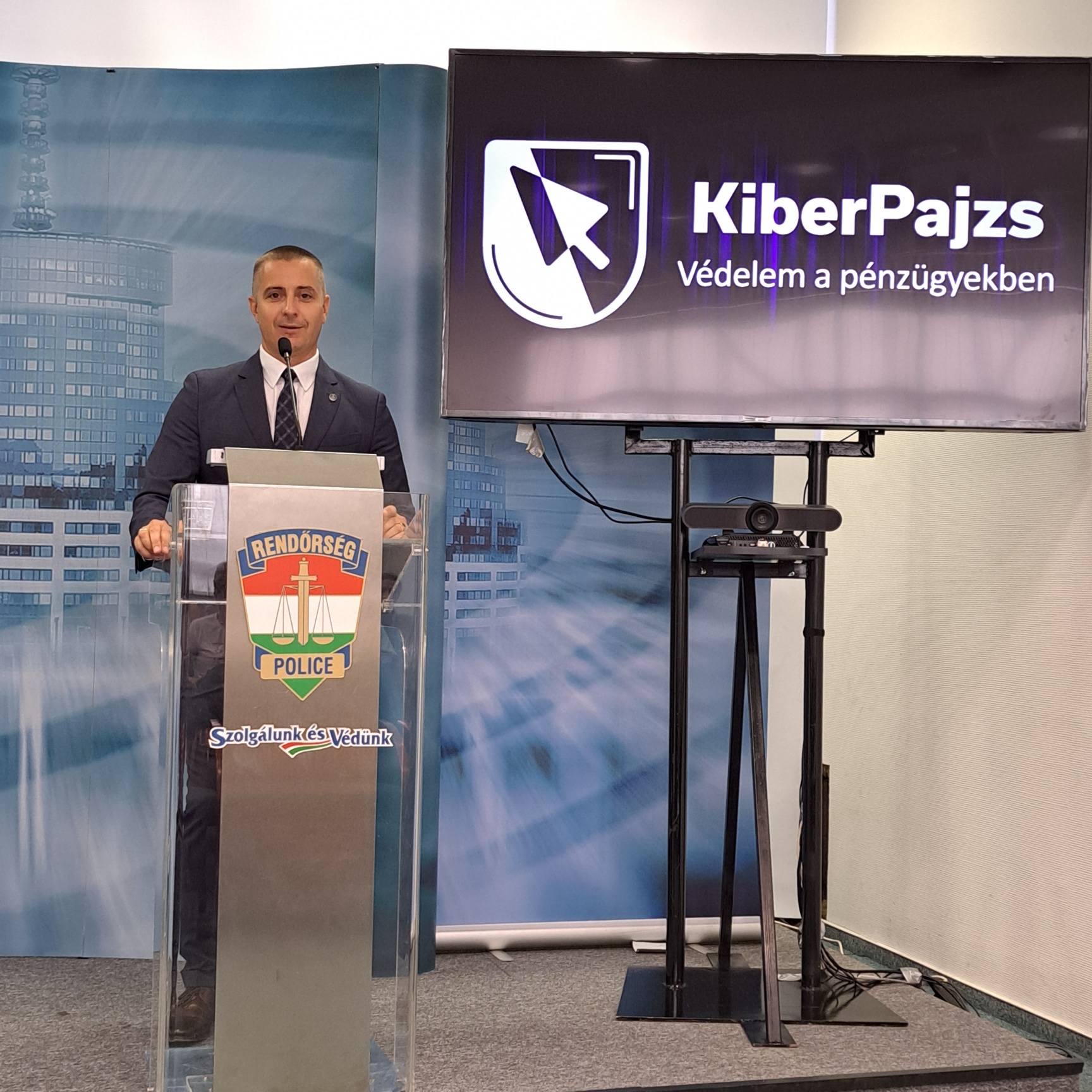
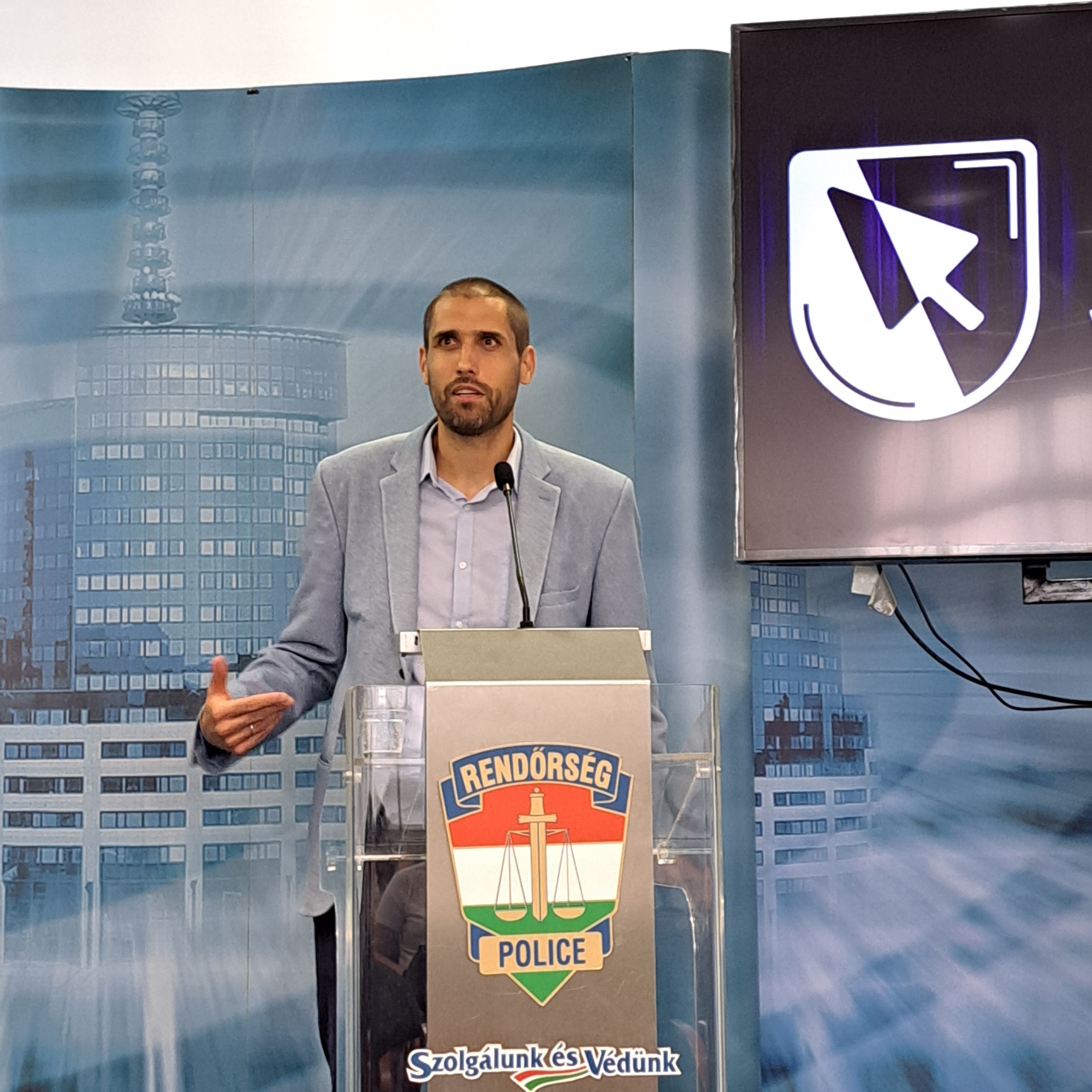
Budapest, 11 July 2023
Press Release: The Hungarian Banking Association calls for competition-neutral regulation
The Hungarian Banking Association sees it is a negative development that the extra profit tax (windfall tax) introduced in 2022 as a temporary measure, for two years, has been extended to 2024, contrary to earlier commitments. The additional purchases of government securities expected in exchange for the reduction of the windfall tax will have a negative impact on the Hungarian economy, reducing banks' liquidity and the amount of credit they can lend to businesses to invest. The Hungarian banking sector is already one of the largest creditors of the Hungarian state and will remain so, with the stock of government securities held by banks doubling in the last 10 years to around HUF 11 000 billion. The extension of the temporary windfall tax also weakens the resilience of the national economy.
While the Hungarian Banking Association also expects inflation and central banking interest rates to fall significantly and credit demand to pick up, keeping the windfall tax rate unchanged in 2024 will lead to a reduction in the income of financial institutions and thus in the amount of credit they can lend. Recent crises have shown that the Hungarian economy needs a stable and liquid banking sector to sustain lending in challenging times like the current one, and thus help the economy recover from recession.
The further taxation of savings could represent a significant backward step in the self-care of households. The past period has brought about significant changes in the investment and savings market, with the vast majority of the population reducing their consumption due to inflation, whilst also placing stronger emphasis on saving and showing a growing desire to keep their money in various forms of savings.
The further taxation of household savings, and, at the same time, the encouragement of significant investment into government bonds, will distort competition and push out the Hungarian financial sector from the savings market. It will also restrict the right of customers to free decision-making, as it limits all options to access a wide range of savings products. Every new tax and financial burden will reduce savings in Hungary, which, in turn, will take away the resources required for lending. This seriously limits confidence in long-term investment and reduces the potential for growth in the securities market and the Hungarian economy in general.
In view of the negative economic impact of these decisions, the Hungarian Banking Association calls on the Government to review the measures as soon as possible and, if possible, withdraw them or not introduce them.
Hungarian Banking Association
1 June 2023
Communiqué of the of the Hungarian Banking Association’s General Meeting
The Hungarian Banking Association held its Annual General Meeting earlier today. At the meeting, Mihály Varga, Minister of Finance, informed participants about the state of the Hungarian economy and the budgetary outlook, while Csaba Kandrács, Deputy Governor of the National Bank of Hungary (MNB), informed participants about current monetary policy challenges. Anikó Túri, State Secretary of the Ministry of Economic Development, summarised the challenges of economic development going ahead. At the General Meeting, the Hungarian Banking Association held a general election - electing a new Board, Supervisory Board and Ethics Committee. At the General Meeting, the membership decided to publish the following statement.
The Russia-Ukraine war that broke out in 2022 has fundamentally shifted the tasks of the European community. The war in our neighbourhood has resulted in a mass influx of refugees into the European Union, an energy crisis and, in large part as a result of these, a level of inflation unseen for decades. The Government responded to the higher interest rates prevailing on the market by introducing an interest rate freeze in respect of several loan types in 2022, which, although not supported by the Hungarian Banking Association, was responsibly implemented by the banking sector.The Banking Association's position in this matter has not changed: we see the interest rate freeze in its current form as a measure that is holding back bank lending, slowing economic growth and weakening financial awareness, and thus we call for its lifting.
The Ministry of Finance is contributing to the reduction of the rate of inflation by tightening fiscal policy, while the National Bank of Hungary (MNB) is raising interest rates. The Ministry of Economic Development is trying to bring new momentum into the Hungarian economy by boosting investment. The Hungarian Banking Association welcomes the steps taken to curb inflation, as well as targeted interest rate subsidised lending schemes and the allowing of market conditions to prevail, which together can contribute to fast economic recovery.
However, in order to catch up with the advanced economies of the European Union and to achieve sustainability, an actively lending Hungarian banking sector is indispensable. However, the interest rate freeze and the extra tax burden on banks make it impossible for financial institutions to raise the capital required for this. The burden on the banking sector must be reduced to allow steps of substance to be taken on market terms, to facilitate convergence. This is the only way for the Hungarian banking sector, in co-operation with the Government and the Central Bank, to become an engine of economic growth. As a result of this co-operation, the capital market can evolve further, along with the country's international weight and its ability to attract capital.
The banking industry continues to witness a strong proliferation of digital solutions; however, certain regulatory measures continue to preserve the prominent role of cash. The banking sector is actively pursuing the digital switchover in line with international trends, in co-operation with numerous relevant authorities and Governments. One of the key current challenges is the improvement of digital security. To this end, the Hungarian Banking Association has launched the CyberShield programme, supported by a comprehensive communication campaign.
At the General Meeting, awards were also presented based on the achievements of the past year. The winners of the Golden Beehive Award are as follows:
Orsolya Haller - CIB Bank
Péter Hidvégi - Raiffeisen Bank
Zoltán Illés - Duna Takarék Bank
István Lengyel - BAACE
Balázs Nagy - Garantiqa Hitelgarancia
Éva Schadl - Erste Bank
In addition, 11 people have been invited to take up the position of Chair in the Hungarian Banking Association’s Working Groups, following the presentation of their letters of appointment.
As a result of the general re-election of officials, the membership of the Hungarian Banking Association has elected the following members for the Hungarian Banking Association’s governing bodies for the next three years:
Board: President: Radován Jelasity (Erste Bank Zrt.), Vice President: András Becsei (OTP Mortgage Bank Ltd.), Board Member representing small and medium-sized banks: Éva Hegedüs (Granit Bank Ltd), Board Members: Zsolt Barna (MBH Bank Ltd.), Pál Simák (CIB Bank Ltd.), Balázs Tóth (UniCredit Bank Hungary Ltd), György Zolnai (Raiffeisen Bank Ltd.),
Supervisory Board: Chair: Guy Libot (K&H Bank Ltd.), Deputy Chair: Veronika Spanarova (Citibank Europe plc. Hungarian Branch Office), Supervisory Board Members: Tibor Bodor (ING Bank N.V. Hungarian Branch Office), Ágnes Erdős (Bank of China Limited Hungarian Branch Office), Zsolt Selmeczi-Kovács (Giro Ltd.),
Ethics Committee: Chair: Henrik Auth
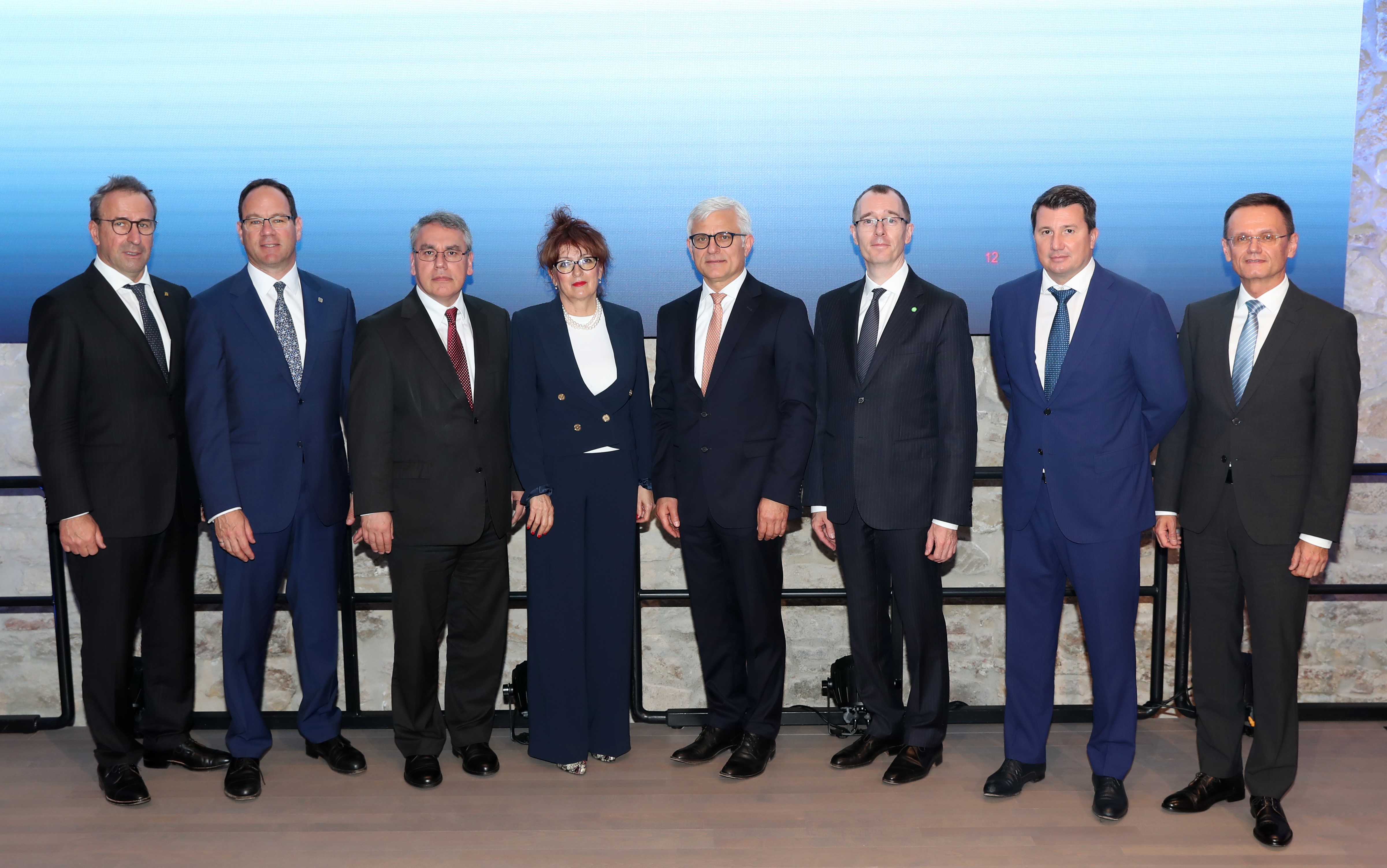
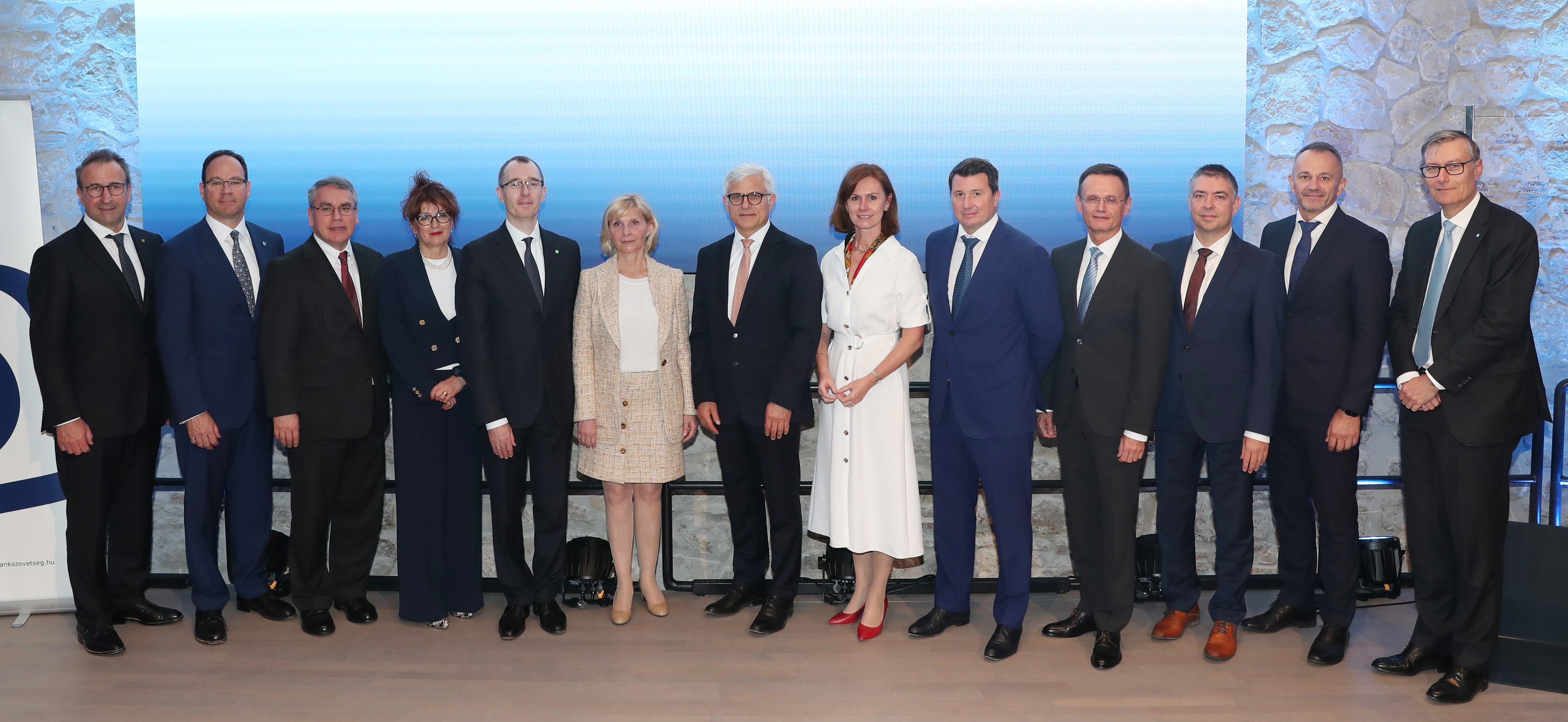
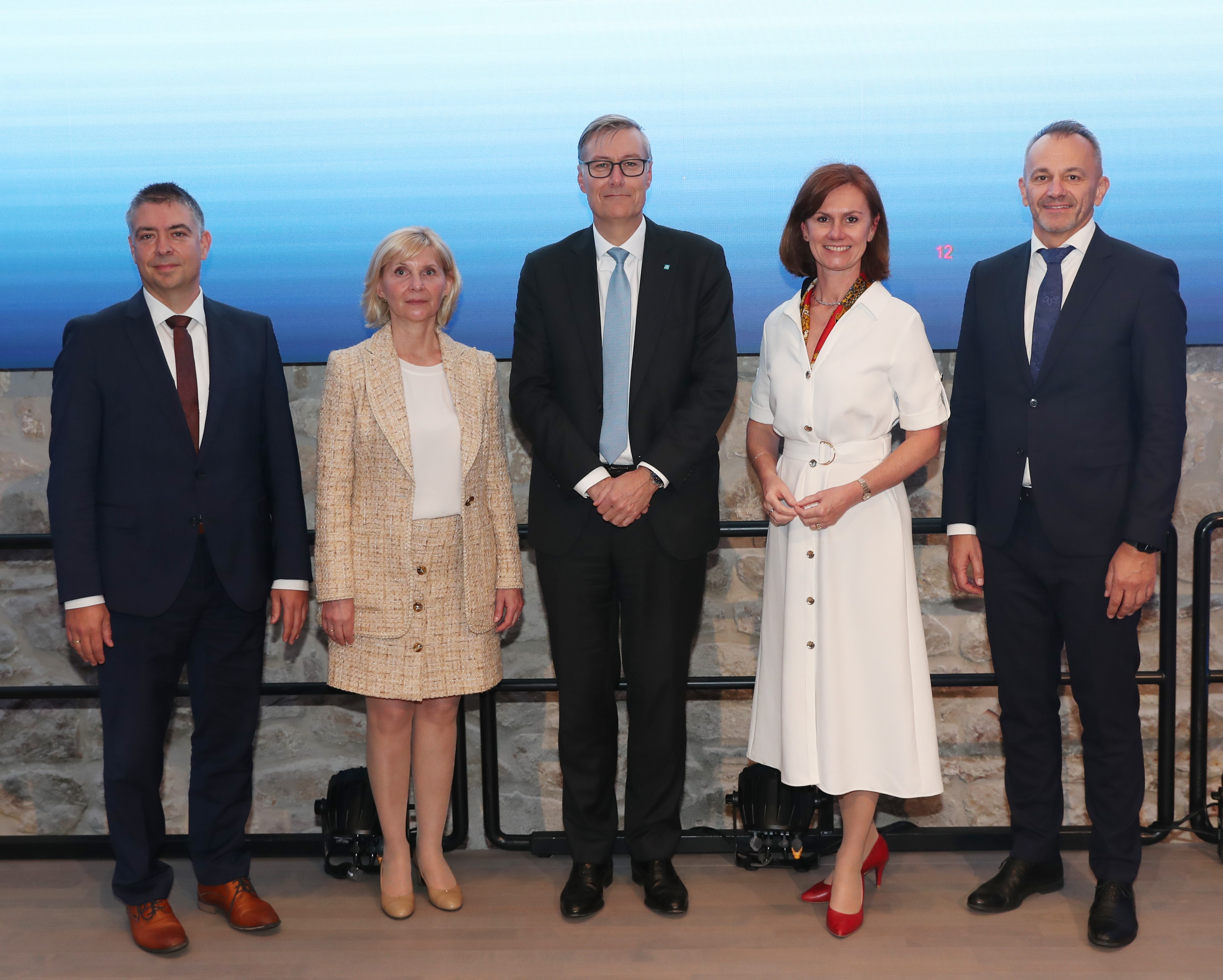
Budapest, 19 May 2023.
Press Release: Supervisory Authority for Regulated Activities also joined the CyberShield program
The Hungarian National Bank (MNB), the Hungarian Banking Association, the National Media and Inforcommunacions Authority (NMHH), the National Security Service-National Cybersecurity Institute (NBSZ-NKI) and the National Police Headquarters(ORFK) have launched a joint educational and communication cooperation called CyberShield (KiberPajzs), which was previously joined by the Ministry of Justice and today is also joined by the Regulatory Activities Authority. Against digital financial criminals is essential to ensure that customers recognise fraud patterns based on emotional manipulation and deception. The founding and affiliated organisations of the CyberShield cooperation are joining forces to raise financial awareness and to manage cyber risks as effectively as possible.
Budapest, 15 May 2023
Phone scammers disguise themselves as experts from the Banking Association
Please note that Hungarian Banking Association is not engaged in commercial banking activities for retail or corporate customers, and therefore NEVER approaches banking customers. Bank customers who have been contacted or have been victimised should contact the known customer services of their account-holding bank in the event of any suspicion (concerning their account).
The CEO of Garantiqa, a Member of the Hungarian Banking Association's Board, is granted a high state honour
Dr. Éva Búza received today the highest award of the Hungarian state, the Knight's Cross of the Order of Merit of Hungary. On the proposal of Prime Minister Viktor Orbán, the award will be presented by the President of the Republic Katalin Novák to the CEO of Garantiqa Hitelgarancia Ltd. for more than 20 years of successful work in the service of the state.
Congratulations on the recognition!
14 March 2023
Press Release : Don't fall for it! - Joining forces to combat online fraud
Nowadays, online frauds are becoming more and more common, so in order to reduce this type of crime, the Hungarian National Bank, the Hungarian Banking Association, the National Media and Infocommunications Authority, the National Security Service-National Cybersecurity Institute and the National Police Headquarters decided to establish a joint educational and communication cooperation called CyberShield. The programme was announced by the founders on 7 November 2022.
7 March 2023
Press Release :Teaching about finance and entrepreneurship
Between 6-10 March 2023, the ninth edition of MONEY7 will be held in schools, with the financial theme "Modern Money Management and Digital Security" and the entrepreneurial theme "Think and Do Business".
In 2015, Hungary was a founding member of European Money Week that takes place simultaneously in around 30 countries across Europe. This year again, MONEY7 will be linked to both European Money Week and Global Money Week, and will also support the objectives of the Government's National Strategy for Promoting Financial Literacy adopted in 2017 and the Strategy for Strengthening Hungarian Micro, Small and Medium Enterprises adopted in 2019.
The latest information on PÉNZ7 is available at www.penz7.hu.
The organisers of MONEY7:
Ministry of Interior
Ministry of Economic Development
Junior Achievement Hungarian Foundation
Hungarian Banking Association
Money Compass Foundation
Ministry of Finance
7 March 2023
Press Release: Hungarian Banking Association: The new financial obligation imposed upon banks is detrimental to the whole national economy
In the wake of the Covid pandemic and due to the economic consequences of the war in Hungary's neighbourhood, full co-operation is required across the nation to keep the Hungarian economy on a level footing, with the banking sector's primary role being the funding of economic growth.
According to an announcement by the National Bank of Hungary on Tuesday, as of 1 April, the central bank will raise the mandatory reserve ratio to 10%, with no interest paid to banks on 25% of the reserve. The increase in the mandatory reserve ratio is aimed at curbing demand; however, in the current market environment, interest unpaid in respect of the reserve ratio represents a significant disadvantage for both the banking sector and the economy.
In view of the above, the Hungarian Banking Association calls for the withdrawal of the announced central banking measure in order to maintain the ability of the banking sector to finance the economy.
2 March 2023
Hungarian Banking Association
Press Announcement: The Hungarian Banking Association proposes to increase the budget available under the successfully launched Baross Gábor Reindustrialisation Loan Programme
Companies with stable operations represent vital building blocks for a competitive national economy
Domestic companies typically participate in the chain processes of economic fields such as services or trade and industry, which make them vital building blocks of a competitive national economy. In addition to EXIM and MFB, there are close to 20 commercial banks providing funding to Hungarian companies in the total value of HUF 12 000 billion per year. Domestic banks are committed to providing a constant, stable stream of credit to Hungarian companies.
The Hungarian Banking Association is asking the Government and the Ministry of Economic Development to increase the budget of the Baross Gábor Reindustrialisation Loan Programme. The Hungarian Banking Association also calls for the development of an allocation methodology which, irrespectively of the size of the budget, ensures that banks and businesses can plan ahead with the allocation of funds, and that the national economy can use funds in an efficient and timely manner.
27 February 2023
Hungarian Banking Association
Obituary of Sándor Dávid (1958-2023)
The earthly existence of Sándor Dávid, an esteemed colleague and a distinguished payments specialist of the Hungarian Banking Association, came to an end today. His family and friends remember him as a loving husband and father, a man who was always cheerful and radiated calm.
His banking career linked him to the Hungarian National Bank and, armed with the experience built up in the central bank, more recently, to the Hungarian Banking Association. For the banking profession, he represented a combination of professionalism, the pursuit of perfectionism and professional humility. These traits have characterised him since before the regime change, when he started his career as a bank clerk, and also in the three decades since. This has always been his attitude in carrying out his responsibilities both in Hungary and abroad, as well as in his leadership of the Hungarian Banking Association’s various working groups and in his participation in the work of international payment organisations as Hungary's representative.
His greatness as a human being and his dignity must also be remembered. He did not talk about his illness until the last days, still preparing for the tasks ahead. Professionally committed, helpful, offering a friendly smile full of joy in spite of his pain – this is how he spent his time with us in the last months. In 2022, he was deservedly granted the Golden Beehive Award of the Hungarian Banking Association.
In the hope of resurrection, we bid farewell to our dear colleague Sándor Dávid.
Levente Kovács
Secretary General of the Hungarian Banking Association
Joining forces to improve the financial and entrepreneurial skills of students
Seven organisations have signed a co-operation agreement to develop students' financial and entrepreneurial skills as part of the MONEY7 theme week in the 2022/2023 school year.
Next spring, between 6-10 March 2023, the MoneyWeek programme aimed at improving financial and entrepreneurial awareness using interactive tools will be organised for the 9th time. Since its launch, the programme has been part of European MoneyWeek, conducted simultaneously in close to 30 countries, and since 2016, also of Global MoneyWeek. In the last academic year, more than 170 000 students from 1 000 schools participated in the programme in Hungary.
After professional discussions, documents on the implementation of MoneyWeek 2023 were signed by the Ministry of Interior as the project owner, the Work Organisation of the Minister of Economic Development, the Ministry of Culture and Innovation, the Ministry of Finance, the Hungarian Banking Association, the Pénziránytű (Financial Compass) Foundation and the Junior Achievement Hungary Foundation as MoneyWeek’s collaborating professional partners.
Budapest, 25 November 2022
Donating blood never goes out of fashion!
Pop-up exhibition showcasing the award-winning entries of the "GIVE BLOOD!" poster design competition opens
24 November 2022 - Students studying at the Graphic Design Faculty of the Moholy-Nagy University of Art and Design encourage people to donate blood, using posters created in the poster design competition titled "DONATE BLOOD!" organised by the Hungarian Banking Association and the Media Union Foundation. A pop-up exhibition of the completed entries and older posters can be viewed at the Hungarian National Museum.
The aim of the competition was to create timeless, attention-raising works of art that use unique visual and content components to engage the different generations present in our society, encouraging them to take an active role. The aim of the completed entries is to help young and older people understand the importance of blood donation. The competition was announced by the Hungarian Banking Association at the opening event of the Bank Blood Donors' Week organised in collaboration with the Moholy-Nagy University of Art and the Media Union Foundation.
A Jury of eight judges dedicated to the topic selected two grand prize-winning and two special award-winning entries:
- Winning entry (General category - Give blood!): Sára Torma
- Winning entry (Youth category – Go and give blood!): Zsuzsa Oláh
- Special Award winner (General Category - Give Blood!): Lenke Lamm
- Special Award winner (Youth category - Dare to give blood!): Bence Sáránszky
Budapest, 24 November 2022
Press Release : The Hungarian Banking Association welcomed the establishment of the Council of Banks Associations of the Turkic States
The Hungarian Banking Association, as the only EU Member State, participated in the inaugural ceremony of the Council of Banks Associations of the Turkic States (Azerbaijan, Kazakhstan, Kyrgyzstan, Turkey, Uzbekistan) in Istanbul on 4 November 2022.
The main objectives of the Council's activities cover the expansion of financial co-operation schemes and services, as well as the joint development of banking infrastructures.
Levente Kovács, Secretary General of the Hungarian Banking Association welcomed the participating delegations at the event venue. In his speech, he highlighted that our diverse relations, which are based on shared roots and historical experiences, will help further expand economic and financial relations. The timing of the Council’s establishment is appropriate, as it is the banking sector that is able to translate intense political relations based on common traditions into economic collaboration. He indicated that the Hungarian Banking Federation, as a member of the European Banking Federation, was able to play an intermediary role between the Turkic countries and the European Union.
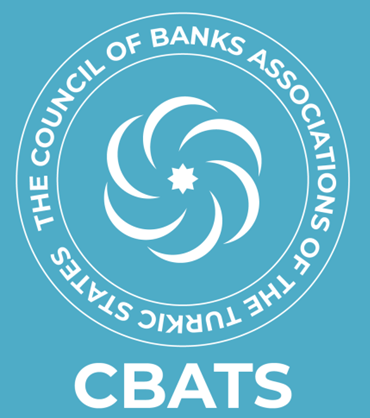
Budapest, 10 November 2022
Interview with Radovan Jelasity, President of Hungarian Banking Association
Hungarian Banking Association: The Hungarian banking sector has an advanced digital vision
There are certain things the Hungarian banking sector can be proud of, but there is, of course, also plenty of room for improvement. The sector must carry some heavy burdens, but also has some unique strengths. What are the most important pillars that can help preserve the sector’s competitiveness and what can the regulator, the Banking Association and market players do? In his opening presentation delivered at FinTechShow 6.0., Radovan Jelasity, President of the Hungarian Banking Association and President and CEO of Erste Bank Hungary, outlined the state of the sector and highlighted certain components of the sector's digital vision.
Forging a CyberShield to protect financial consumers against digital criminals
The National Bank of Hungary (MNB), the Hungarian Banking Association, the National Media and Infocommunications Authority (NMHH), National Security Service - National Cybersecurity Institute (NBSZ-NKI) and the National Police Headquarters (ORFK) have decided to establish a joint educational and communication co-operation scheme titled CyberShield (KiberPajzs). Digital financial criminals today attack primarily by way of emotionally manipulating and deceiving consumers. Thus, the organisers of CyberShield are joining forces to raise the financial awareness of retail customers and manage cyber risks as effectively as possible.
A co-operation agreement was signed in Budapest by Dr. Csaba Kandrács, Deputy Governor, Dr. Barna Fömötör, Director General (National Bank of Hungary), Dr. Levente Kovács, Secretary General (Hungarian Banking Association), Dr. András Koltay, President (National Media and Infocommunications Authority), Dr. Csaba Kiss, Director General (National Security Service - National Cybersecurity Institute) and Dr. János Balogh, National Chief of Police (National Police Headquarters) on the organisation of a joint cybersecurity education and communication campaign.
Under the CyberShield project, institutions and market players will launch a comprehensive education programme to improve the digital financial literacy of customers. A broad and co-ordinated communication campaign will also be launched to raise awareness of cybersecurity risks and show ways to protect against them.
The CyberShield project aims to analyse and further develop the cybersecurity processes of public authorities and markets. It also aims to share national and international professional knowledge and gather best practices to facilitate stronger and more effective financial cybersecurity solutions.
Digitalisation is triggering a proliferation of electronic payments; however, at the same time, although the domestic financial sector is considered to be very secure by European standards, the number and ratio of successful fraudulent transactions are also on the rise. Criminals do not directly attack financial institutions or infrastructure, but primarily target consumers (who are sometimes lost amidst all the rapid changes), deceiving them or manipulating their emotions. This is why it has become essential to raise the financial awareness of customers, who represent the ‘first line of defence’, and prepare them for addressing cyber risks.
The project focuses in particular on minors and highly vulnerable social groups (such as senior citizens), but, in addition to addressing consumers, it will also send preventive messages to small and medium-sized enterprises and other business customers.
Under the CyberShield programme, institutions will use simple messages with a shared imagery to explain the main forms of fraud, such as phishing, fake calls or text (SMS) messages from banks, fake banking websites, false forms for transaction approval, fraudulent investment or other online offers, and theft of personal data through social media.
During the first campaign to be launched in November, three 'everyday role models' whose life situations are similar to those of most digital financial consumers in Hungary, will tackle financial cyber risks on posters and in messages.
The organisers of the CyberShield programme trust that customers, public authorities and market players will together be able to offer 'bulletproof' defence against digital criminals.
National Bank of Hungary, Hungarian Banking Association, National Media and Infocommunications Authority, National Security Service - National Cybersecurity Institute, National Police Headquarters
2022.11.07.

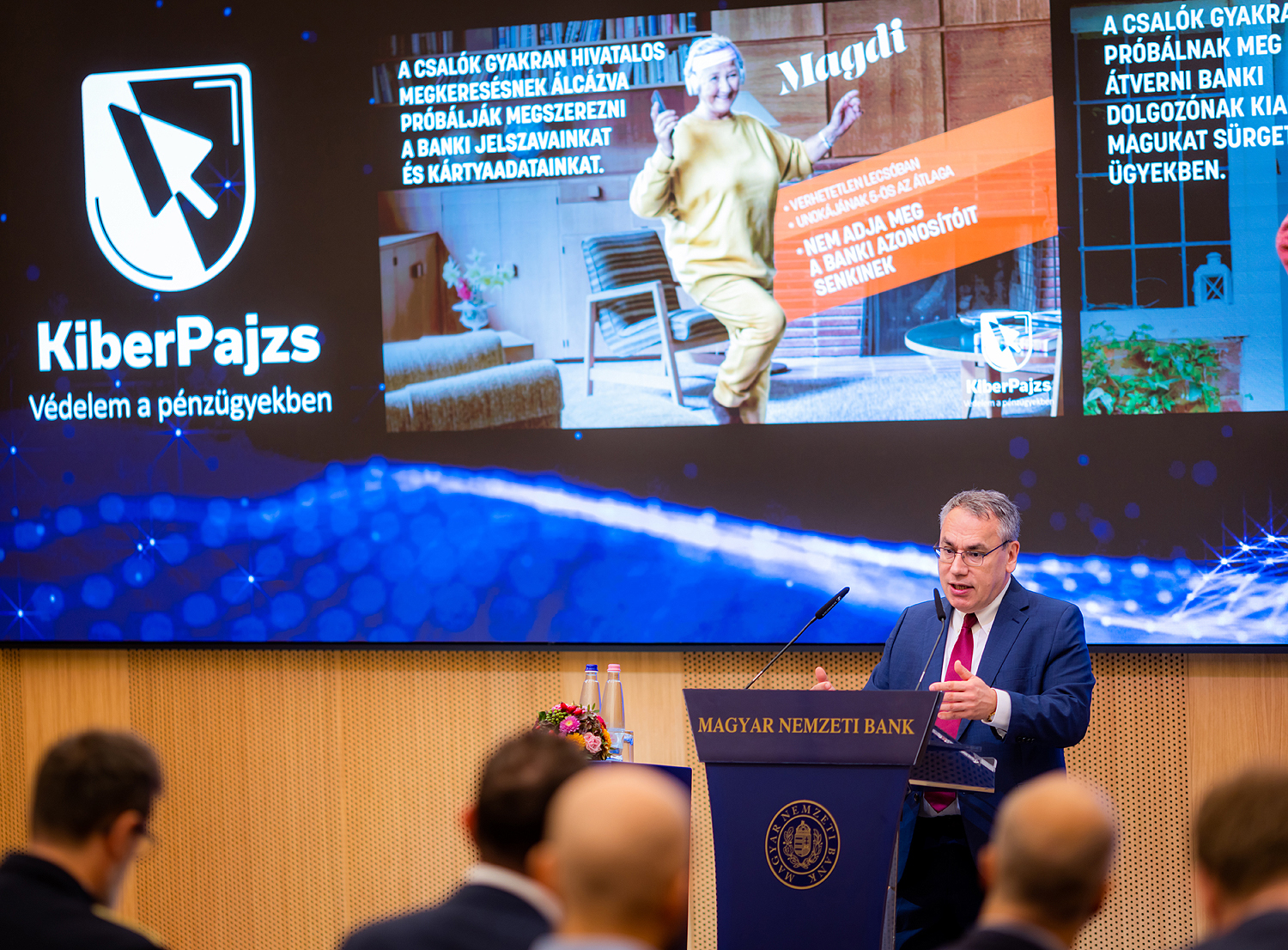
Press Release: the banking sector is the economy’s immune system
It is a basic economic notion that the economy and the banking system go hand in hand, ideally making each other stronger. The core business of the banking sector is to provide a continuous flow of credit to the economy, and in crises such as the current one it is particularly important that the sector's lending ability is not compromised. A banking system that operates under stable legal conditions and predictable market conditions is like an immune system that helps keep the economy healthy, but the formula also holds the other way round: legal uncertainty leads to distorted market conditions and reduced lending capacity, which, in turn, significantly reduces the banking sector’s ability to protect and strengthen the economy, and the weakening of the economy's immune system is inevitably associated with an increase in economic vulnerability and a slower convergence with the EU average.
One of the key pillars of SME lending during the Covid-19 pandemic was the range of products offered under the Széchenyi Card Programme, which made a significant contribution to satisfying the liquidity and investment requirements of SMEs. Adjusting these products to the higher interest rate environment would be of enormous help to businesses in the current period.
The Government Decree issued on the night of 26 October, which extends the interest rate freeze to SME loans in general, further distorts market conditions and calls into question the legal binding force of contracts concluded under private law. It is in the fundamental interest of banks to ensure that their customers, whether individuals or businesses, remain solvent, can meet their contractual obligations and evolve. Banks have always assisted customers in need of help in a targeted way, and continue to be partners in finding fair and proportionate solutions to this end. The interest rate freeze in its current form is neither proportionate nor targeted.
Such high levels of bank charges and the uncertainty caused by retroactive interference in contractual relations have now reached a critical level that can only result in a significant drop in retail and corporate lending. However, even in these difficult circumstances, we remain confident in the performance of the Hungarian economy and emphasise that only targeted measures represent an effective approach to supporting the economy, while the gradual phasing out of general instruments will help consumers and businesses adapt and operate under real market circumstances.
Budapest, 28 October 2022
Hungarian Banking Association
Interview with Levente Kovács, Secretary General of the Hungarian Banking Association
Hungarian Banking Association: we are dancing on a knife edge, all we can do is negotiate and negotiate again
In its current form, the interest rate freeze is neither proportionate nor fair - believes Levente Kovács, Secretary General of the Hungarian Banking Association. He is of the view that in the longer term the negative effects of market distortion can only be offset by even greater market distortion, which, in turn, will create an avalanche that will be detrimental to the Hungarian banking sector and the Hungarian economy as a whole. The Secretary General expects a significant slowdown in mortgage lending and believes that with the extension of the interest rate freeze to 3 and 5-year mortgages, the era of mortgage lending affordable by a significant portion of the general public is practically over.
He is of the view that the current situation is also unfair to more financially prudent customers who have opted for fixed-rate loans through the full tenor, and consequently pay higher interest rates.
Dr. Levente Kovács, Secretary General, HUngarian Banking Association
Visa Special Award 2022 - Joint cybersecurity education programme by the Hungarian Banking Association (MBSZ) and the National Bank of Hungary (MNB)
Through its special award titled ‘Visa Special Award 2022’, Visa aims to highlight a significant initiative carrying a social message, each year. This year, the award went to the cybersecurity education programme of the Hungarian National Bank and the Hungarian Banking Association for their initiative to bring together the entire sector into a broad coalition. The award was accepted by Dr. Csaba Kandrács, Deputy Governor of the National Bank of Hungary (MNB) and Dr. Levente Kovács, Secretary General of the Hungarian Banking Association




Press Release: Blood donation record in banks
On the Third Banking Blood Donor Week, bank employees contributed 3 000 units of ready-to-use blood to the national blood supply, under the Jótett (Good Deed) Bank programme. Through this initiative and the volume of blood donated, the Hungarian Banking Association is setting a forward-looking example for other sectors.
In 2022, the Banking Blood Donor Week lasted for two weeks, due to the high number of bank employees who volunteered to donate blood. Using the blood donated, the staff of the Hungarian National Blood Transfusion Service and the Hungarian Red Cross were able to provide blood and blood products to 3 000 people.
On the closing day of the programme, Sándor Nagy, Deputy Director-General of the Hungarian National Blood Transfusion Service (OVSZ) said that the extra blood provided by bank employees at mobile blood collection points during Banking Blood Donor Week offered them security and predictability. He specifically highlighted that 13% of the blood donors were first-time donors, many of whom may become regular blood donors.
Levente Kovács, Secretary General of the Hungarian Banking Association, emphasised the importance of personal example and social responsibility. He sees Radovan Jelasity, President of the Hungarian Banking Association, as a role model to follow, as he has donated blood for the 38th time. The number of employees participating in the Banking Blood Donor Week is growing dynamically year-by-year, which shows that there is a healthy rivalry among members of the Hungarian Banking Association to make it to one of the top three positions. He hopes that the initiative of the Hungarian Banking Association will be followed by other sectors, to make sure that fresh blood is always available for those who need it. In addition to his banking colleagues, he also expressed his special thanks to the leadership of the Ministry and the Central Bank who supported the event, including Minister of Agriculture István Nagy and Deputy Governor of the National Bank of Hungary (MNB), Csaba Kandrács.
In the context of the event series, the Hungarian Banking Association, in co-operation with the Médiaunió Foundation, is launching a blood donation poster competition for students of the Moholy-Nagy University of Art and Design. The aim is to draw the attention of today's Hungarian society and youth to the social obligation to donate blood, through the works of young, contemporary artists.
Press Release: Bankers are giving their blood once again
This year, the Hungarian Banking Association and the Hungarian banking sector are organising the Bank Blood Donors' Week for the 3rd time. At the beginning of the year, the sector's joint CSR programme, GOOD DEED Bank, was awarded the "Social Initiative of 2021" Special Award. One key event in the GOOD DEED Bank programme was Bank Blood Donors' Week, thanks to which local bankers have already donated more than 4000 units of blood, to support the recovery of patients. The programme will be extended to two weeks this year, and will reach even more parts of the country.
Budapest, 26 September 2022
Press release
The European and Hungarian economies need more loans than ever for economic development and liquidity in order to counter the effects of the recession caused by the war.
At today's interest rates, the six-month extension of the interest rate freeze would cause losses of around HUF 70 billion, the equivalent of a full year's bank tax, to the banking sector. With the extra tax included, the additional financial burden on banks already exceeds HUF 500 billion – approximately the equivalent of the banking sector's full-year P/L last year. All this is being borne by the financial sector amidst economic difficulties that are also impacting financial institutions. The highly regulated banking sector also faces the additional task of putting forth any necessary provisions necessitated by the risk of recession brought about by the war. The bearing of these extra burdens will prevent the placement of some HUF 4 000 billion worth of credit, which, in turn, will result in a loss of about 1% of GDP growth.
Over the past years, the Government, MNB and the banking sector have regularly drawn the attention of the customers concerned to the safety of fixed-rate loans. Since January last year, the 3-month BUBOR has risen from 0.75% to the current 13%. By applying a BUBOR rate of 2.02%, the risk and cost of the interest rate freeze is placed solely on the banking sector, while customers have received several notices on the risks of variable interest rate loans, in line with the law and MNB regulations, as well as multiple personalised letters calling upon them to switch to a safer fixed-rate loan. The above practice does not enhance the financial awareness of customers.
For the above reasons, the Hungarian Banking Association is of the view that, instead of the introduction of a scheme that distorts market conditions, the only appropriate professional solution to securing the growth of the Hungarian economy is the gradual phasing-out of the interest rate freeze.
Budapest, 19 September 2022
The Hungarian Banking Association
"MY PHONE WAS SMARTER THAN ME" – INFORMATION ISSUED BY THE Budapest Police Headquarters (BRFK) AND THE HUNGARIAN BANKING ASSOCIATION (HBA)
Cybercrime, phishing, spyware... these terms are no longer only found in movies, as anyone can fall victim to them. The Budapest Police Headquarters and the Hungarian Banking Association have launched a joint information campaign to make sure it doesn’t happen to you.
Press release on the agricultural credit moratorium
The extremely dry weather conditions across the region and in significant parts of Hungary are creating major difficulties for the agricultural sector, which banks are seeking to help farmers overcome. The recently published Government Decree on the agricultural credit moratorium offers a full moratorium for certain agricultural sectors, going far beyond the principal moratorium proposed by banks, which can be financially justified in certain cases. As a result of the extreme weather, and in order to maintain the dynamics of development, the agricultural sector will require additional, substantial bank credit. The banking sector is ready to provide this in the form of market-conform solutions. However, due to the deterioration in customer risk ratings resulting from international regulations, the Government Decree published will make it more difficult for applying customers to meet creditworthiness criteria, which also carries a significant financial risk. The Hungarian Banking Association calls upon businesses that are facing difficulties due to the drought or for other reasons to find an appropriate financial solution in consultation with their own bank, thus ensuring the predictable development of their business.
Budapest, 9 August 2022
the Hungarian Banking Association
Consultation between the region’s banking associations and the European Commission
In March 2022, the Foreign Representative of the Office Polish-Hungarian-Romanian Banking Associations in Brussels launched its operation in order to reinforce the ability of the region to represent its financial interests in EU matters. As part of its effort, on 28 June, the heads of the Polish, Romanian and Hungarian Banking Associations met Ms McGuinness, the European Commissioner for Finance. The meeting focussed on the role of the banking sector in sustainability, financial education and the situation in Ukraine, both from a national and regional perspective. The Madam Commissioner praised the steps taken and expressed her support for the delegation in respect of common objectives.
The delegation also held talks with the Hungarian and Polish Ambassadors of the Permanent Representations to the European Union, as well as with Members of the European Parliament, on major issues affecting the financial sector. The main topics of discussion extended to the challenges facing the economy, compliance with banking regulatory requirements and the long-term implementation of sustainability objectives in the long term. On behalf of Hungary, Ambassador Tibor Stelbaczky and his colleagues, as well as MEP Enikő Győri, reassured the banking sector of their professional support for the work it performs in the topics listed.
The Hungarian Banking Association was represented by Pál Simák, Chairman of the Board and CEO of CIB Bank, and Ildikó Kajtor-Wieland, Director of the HBA responsible for EU regulation. Olimpia Orbán, the Head of External Relations also attended.
2022.07.05
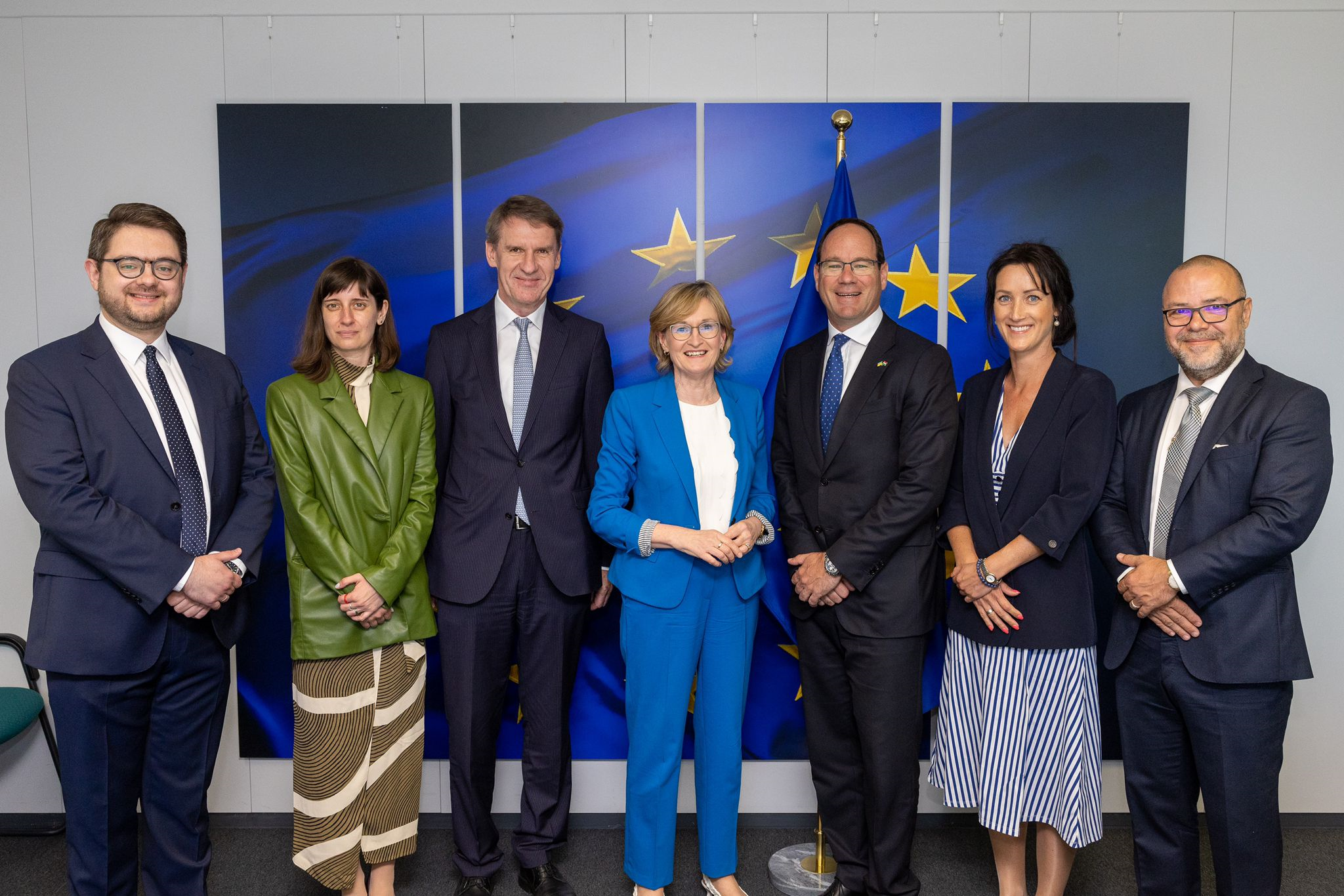
Piotr Gałązka (Polish Banking Association)
Cati Ursu (Romanian Banking Association)
Włodzimierz Kiciński (Polish Banking Association)
Madam McGuinness Commissioner
Simák Pál (Hungarian Banking Association)
Kajtor-Wieland Ildikó (Hungarian Banking Association)
Florin Dănescu (Romanian Banking Association)
Information about account opening for ukranian refugees
ІНФОРМАЦІЯ ПРО БАНКІВСЬКІ ПОСЛУГИ ДЛЯ БІЖЕНЦІВ З УКРАЇНИ
Метою цього документу є забезпечення загальної інформації про угорські правила відкриття банківського рахунку. Деякі вітчизняні установи у процесі своєї діяльності можуть відхилятися від окремих правил.
Перед відкриттям рахунку, будь ласка, поцікавтеся на вебсторінці або у філіалі банку про необхідні для цього дії та документи.
Банківський сектор надає підтримку біженцям, з цією метою банки на своїх вебсторінках надають загальну інформацію щодо умов, процесу, вимог відкриття банківського рахунку та необхідні для цього документи. Поряд з цим банки на вебсторінках надають інформацію про зняття готівки, про адреси банкоматів, в тому числі тих банкоматів, у яких можна зняти готівку за допомогою банківської картки, випущеної українськими банками.
Які дані необхідні для відкриття банківського рахунку?
- прізвище та імʼя
- прізвище та імʼя при народженні,
- громадянство,
- дата та місце народження,
- прізвище та імʼя матері при народженні,
- адреса, або за відсутності такої, місце проживання,
- тип та номер документа про посвідчення особи;
- податковий ідентифікаційний номер
Які документи необхідні для відкриття банківського рахунку?
Для іноземних громадян:
- закордоний паспорт
- документ, що підтверджує право на проживання. або документ, що надає право на перебування, наприклад, документ про визнання шукача притулку, дозвіл на перебування...
- документ, підтверджуючий податковий ідентифікаційний номер, або за відсутність такого, продиктований податковий ідентифікаційний номер (з метою складання декларації CRS)
- В тому випадку, якщо документ містить у собі виключно написані кирилицею дані, банк може запросити документ, що посвідчує справжніть документа, документів (наприклад, видану Посольством України в Угорщині довідку, або гуманітарний дозвіл на перебування для шукачів притулку) або переклад документа, документів.
Для тих, хто має угорське громадянство:
- офіційний документ, придатний для посвідчення особи (видане угорськими органами влади посвідчення особи, або закордоний паспорт, або картка-права водія)
- офіційний документ про підтвердження адреси (якщо місце проживання або перебування знаходиться в Угорщині)
Які додаткові дії, документи та заяви можуть бути необхідними при відкритті банківського рахунку?
- засвідчення джерела коштів (наприклад, виписка з отримання готівки, у разі внесення готівки, підтвердження про те, що про суму під час перетину кордону був повідомлений відповідний компетентний орган у справах іноземних громадян, а у разі внесення готівки, що зберігалася в іноземному банку, виписка з рахунку іноземного банку),
- заява щодо джерела майна (особливо у випадку активів на суму більш ніж три мільйони форинтів),
- заповнення клієнтом скринінгової анкети під час відкриття банківського рахунку,
- у випадку, якщо клієнт не володіє угорською або англійською мовами, банк може вимагати допомогу перекладача у спілкуванні.
Press release on the special tax
Since the 2008 global economic crisis, the banking sector has been facing new challenges and special extra taxes. In 2021, commercial banks contributed HUF 520 billion to Hungary's budget. On top of the bank tax, which was introduced in 2010 in a temporary manner, the special bank operating charges (OBA [Deposit Insurance Fund], BEVA [Investor Protection Fund], the Resolution Fund, supervisory fees etc.); the cost of offering two free cash withdrawals per month together with the financial burden of the transaction levy; the general corporate taxes, now a significant new obligation to contribute to the budget has emerged. Thus, the cumulative impact of these payment obligations is already threatening the ability of the Hungarian banking sector to boost economic development and act as the facilitator of capital flows. Thanks to EU regulations and the tax burdens imposed locally, the value of the banking sector focussed on Central Europe has already halved over the past ten years, relative to its global, US competitors.
The banking sector is closely intertwined with other economic actors at many different levels, and its success also determines the development of the national economy. Financial activities, which are increasingly becoming globalised and digitalised, require constant development, significant capital and the preservation of international competitiveness. Maintaining confidence in the banking sector is in the common interest of all economic players and decision-makers. Under the current environmental conditions, the domestic banking sector stopped generating profits in the first quarter of 2022. The Hungarian banking sector is opposed to the imposition of additional tax payment obligations.
The Hungarian banking sector now faces a double challenge: after the pandemic and in the shadow of the war raging in the neighbourhood, the goal is to maintain momentum in the Hungarian economy, and at the same time support the regional activities of Hungarian companies by helping them regain their competitiveness. The banking sector will only be able to perform these tasks if the credit moratorium is fully phased out without the imposition of extra tax obligations, and the interest rates of loans falling within the scope of the interest rate freeze scheme are aligned with commercial interest rate levels as soon as possible. The profitability of the Hungarian banking sector can only be assessed over a longer period of time. Over the past 12 years, the banking sector has achieved a ROE of 1%, without dividends. Even in the most favourable business environment, the banking sector has realised a single-digit profit, which it has typically used to improve and boost the intensity of business activity; i.e. no extra profit can be generated in a highly competitive banking sector with numerous players.
In an inflationary environment, rising revenues are matched with rising expenditures, and in financial markets the price of services is set by the market. Extra taxes imposed on financial service providers further reduce the efficiency and lending capacity of the banking sector, and oblige it to generate extra provisions. In the open EU money market, the extra financial burdens are already putting domestic banks at a competitive disadvantage in pricing, reducing the commercial profitability of the Hungarian banking sector, as well as the sector's contribution to the national economy. The extra financial obligations imposed on banks operating in Hungary lend an unequal advantage to foreign players offering cross-border services, as they can operate without extra burdens, in a less regulated and at the same time less secure way.
The banking sector can only repeat the outstanding performance it produced through difficult times, including the intermediation of government programmes and the provision of banking products, if it remains competitive. The rebuilding of the economy requires targeted government, development, foreign trade and central banking programmes, which can be effectively delivered to families and businesses by the banking sector. The foundations for Hungary's next decade and the country’s growth above the EU’s average can only be supported by a regionally competitive and stable banking sector that can offer the right answers to the challenges posed by digitalisation and green matters.
Budapest, 3 June 2022
The Hungarian Banking Association
Communiqué issued by the General Meeting of the Hungarian Banking Association
The Hungarian Banking Association held its Annual General Meeting earlier today. At the meeting, Finance Minister Mihály Varga informed participants about the outlook for the Hungarian economy, while Csaba Kandrács, Deputy Governor of the National Bank of Hungary (MNB), briefed attendants about the future vision for the Hungarian economy. The Members of the Hungarian Banking Association agreed to publish the following statement.
Looking back over the past year, in our efforts to defend ourselves against the Covid-19 pandemic, lockdown was replaced by living together subject to the observation of certain health protection rules. This has been facilitated primarily by high vaccination rates and virus variants causing milder symptoms.
The Covid-19 pandemic has resulted in a surge in digitalisation across all levels of society, as well as changes in consumption patterns and service requirements. Initially, demand and supply shocks, followed by rapid changes in needs, created disruptions in supply chains that have held back economic growth globally. In order to mitigate the negative economic effects, governments and central banks introduced stimulus programmes, and commercial banks increased their market activity. Through these measures, it was possible to avert a global economic downturn; however, inflationary pressures have emerged worldwide.
The Hungarian Government and the Central Bank also implemented innovative measures to support economic growth, extending the family support scheme, strengthening lending to small and medium-sized enterprises and corporate bond issuance, and the launch of the Green Home Programme for households under the National Credit Programme. The banking sector has successfully channelled these to customers. Due to the sharp rise in inflation in the autumn of 2021, the Government has imposed an interest rate freeze on variable-rate retail mortgages as part of its price measures. While these non-market instruments protect consumers from the impact of inflation in the short term, maintaining them in the longer term will create imbalances as they divert funds from other areas. A return to market conditions is desirable for real economic growth and competitiveness. Under the current circumstances, the stability and intermediation role of the banking sector must also be further strengthened to ensure economic development.
Economic growth above the EU average requires an active and strong banking sector in Hungary. Over the past year, the Hungarian banking sector has been able to further intensify its lending and deposit collection activity, as well as its portfolio of government bonds, whilst strengthening its capital position.
We are confident that the Hungarian banking sector, in co-operation with the Government and the Central Bank, will be able to continue to act as a solid driver of economic growth. Such a co-operation could increase the country's ability to attract capital, further strengthen confidence in banks, and, together, these factors could improve the country's international position, leading to a more appropriate rating. To strengthen the latter, the Hungarian Banking Association continues to play an active role in European and global financial organisations.
We are deeply concerned and feel compassionate about the situation in Ukraine, and will strive to lead by example in the support and assistance we offer. The armed conflict in our neighbourhood affects us deeply due to its proximity as well. The war has led to a decline in production, a freeze in direct economic relations, as well as international sanctions, which all exacerbate global supply chain disruptions and increase the risk of inflation. In this situation, the Hungarian Banking Association is committed to preserving the stability of the financial system.
At the General Meeting, awards were also granted to recognise achievements in the past year.
Winners of the Golden Beehive Award:
Magdolna Basáné Kovács (K&H Bank)
Péter Csányi (OTP Bank)
Ágnes Erdős (Bank of China)
Balázs Grenczer (Erste Bank)
László Gyula Nagy (Takarék Jelzálogbank)
Zoltán Tóth (Hungarian Leasing Association)
The Hungarian Banking Association elected new leaders in several vacant positions. New Member of the Board of the Hungarian Banking Association: Balázs Tóth (Unicredit Bank); new Chairman of the Supervisory Board: Guy Libot (K&H Bank); new Members of the Supervisory Board: Andrea Schopp (Oberbank), András Sándor (Takarékbank). The General Meeting elected the new Leaders until the next general election of officers to be held in 2023.
Budapest, 20 May 2022
Hungarian Banking Association
Banking support of Ukraine
Almost immediately after the outbreak of the war in Ukraine, Hungarian banks reacted to the humanitarian crisis by taking measures to help refugees in Ukraine.
Support provided by banks and action taken:
- Helping Ukrainian citizens to open accounts and perform bank transactions, providing information in their mother tongue in some banks.
- Several banks have introduced special services, including the exchange of Ukrainian hryvnias into Hungarian forints in designated branches, up to a certain value limit.
- Several banks have made bank transfers to Ukraine free of charge and do not charge any device fees in respect of this service.
- Some banks reimburse the bank fees charged for transfers from the accounts of private individual customers to Ukraine or from the accounts of private individual or business customers to charity organisations playing a key role in providing humanitarian aid.
- Instant grants, partly through own foundations and partly directly, to humanitarian organisations present in Hungary, including the Hungarian Maltese Charity Service, the Charity Service of the Hungarian Reformed Church, the Hungarian Red Cross, Interchurch Aid, UNICEF and the Bridge for Transcarpathia Programme.
- Collecting non-perishable food, clothing and other donations in kind; purchasing medicines and transporting them to collection points or even to the other side of the border;
- Transporting refugees from the border, providing accommodation and food;
- Assistance in obtaining residence permits in Hungary;
- Providing jobs for Ukrainian bank workers;
- Healthcare;
- Educational support for children, finding educational opportunities, providing laptops and Internet for distance learning, holding student sessions;
Employee initiatives:
- Collecting financial donations;
- Collecting and delivering donations in kind to families that have remained in Transcarpathia - where women, children and elderly people have been left alone; as well as to refugees who have fled to Hungary;
- Volunteering: mentoring, transport and travel arrangements.
Banks in Hungary will take into account the request of the European Banking Authority to ensure compliance with the sanctions, and facilitate access to basic payment accounts for refugees. The establishment of the customer relationship, the opening of payment accounts and the depositing of cash into the account always take place in accordance with the effective anti-money laundering and counter-terrorist financing rules, regardless of nationality. The Hungarian banking sector continually monitors the international situation and the sanctions introduced in the wake of the Russian-Ukrainian conflict, and acts accordingly.
CYBERSECURITY - Call centre scam on an industrial scale
The explosively growing digital world has become very attractive to cybercriminals. Attackers use sophisticated tricks or promises to scam money or valuable financial information. Yet it's hard to believe that fraudsters are now working on an industrial scale to cause us harm – until, that is, we get personally affected.
In recent days, a successful international police operation in Latvia and Lithuania has seen 108 people arrested for a multi-million Euro call centre scam.
A short video produced by the authorities on closing down fraudulent call centres:
Domestic authorities and experts in the banking sector are also closely monitoring current cyber risk factors and suspicious acts. Hungarian victims have also been at the receiving end of fraudulent cross-border calls. Be especially careful if a bank or some other official contacts you and asks you for information with an accent, using an unusual dialect or incorrect technical terms!
8 April 2022
Invitation to join EU banks for Ukraine fundraising campaign
Dear colleagues,
We are reaching out to you with an urgent invitation to support the European banks for Ukraine solidarity campaign launched today. We are aware and appreciate that your members may already have done a lot, but the simple reality is that much more help is urgently needed.
This initiative by the European Banking Federation (EBF) together with the Polish Bank Association and the Hungarian Banking Association aims to mobilize further donations from banks to where they are needed most: to local NGOs operating in countries neighboring Ukraine. You can help us promote the initiative to European banks by taking two simple steps:
- Invite your member banks to join the solidarity initiative using the fundraising kit, which includes clear instructions and a template invitation to the banks in your country.
- Use our campaign banner (also provided in the fundraising kit) throughout your organization in all your e-mails to promote the initiative and encourage donations from banks and other stakeholders.
We know that these are turbulent times and that many of you are already under tremendous pressure. For this reason, we appreciate any effort you can make to support this initiative even more.
Let us know how our team in Brussels can help with the implementation, we will be happy to assist you in any way we can.
Best regards,
Wim Mijs
CEO
With a GREE HEART and the diligence of bees for a greener future
Hungarian Banking Association
GOOD DEED (JÓTETT) Bank - GREEN HEART Programme
With a GREE HEART and the diligence of bees for a greener future
At the initiative of the Hungarian Banking Association, the Hungarian banking sector has planted 3 trees for each bank employee, a total of 120 000 saplings, for a more sustainable future. Dr. István Nagy, Minister of Agriculture, personally welcomed the "GOOD DEED Bank - GREEN HEART" initiative, and presented certificates of recognition to key sponsors.
Global Money Week - press release
On Monday, the 8th Money Week (PÉNZ7) programme was launched in Hungary. This year, 155 000 students from more than 1 000 schools have registered to participate in 11 000 unique lessons under the programme. As in previous years, hundreds of volunteering financial professionals and businesspersons are contributing their personal experience to make the lessons even more authentic for students. This year, their number exceeds 450.
Announcement concerning our joint fight against phishing
The number of unauthorised attempts to obtain data and commit fraud in cyberspace has increased significantly in recent weeks. Victims are typically unsuspecting people. To protect ourselves from such fraud, we need members of society to come together, by raising awareness among family members and acquaintances and sharing methods of protection. We kindly ask you to play your part in this process and in prevention.
The methods are constantly changing, but you can effectively protect yourself against the different types of fraud in the following ways:
- Everyone must protect their own data. Financial service providers and their staff will never ask you to share your financial details with them, and therefore they will certainly not ask you for your bank account balance, bank card details, passwords or PIN codes. Never give these out to others. Be careful, ask questions, and if the phone conversation does not proceed the usual way, or you become unsure during the call, terminate the call and contact your own bank through the usual channels and ask about any suspicious transactions.
- Never open links received through digital channels if they lead to a financial website! Often, fraudsters use fake pages that look deceptively similar to real banking websites. In all instances, type in your bank's website address all the way through to access the site, or open your familiar page from your favourites. Sending financial links is a favourite approach of fraudsters!
- Never download financial software or applications to a computer or mobile phone based on a phone recommendation. If you are unsure, you should always visit your bank in person or call your own bank or administrator.
Please, help us prevent fraud by following and disseminating the above advice.
24 February 2022 Hungarian Banking Association
Bank of the Year 2021 Competition: JÓTETT (GOOD DEED) Bank wins the Social Initiative of the Year Special Award, and Dr. Éva Búza gets elected ‘Banker of the Year’
The Hungarian Banking Association's JÓTETT (GOOD DEED) Bank initiative was granted a Special Award in the ‘Social Initiative of the Year’ category. JÓTETT (GOOD DEED) Bank is the joint social programme of the Hungarian Banking Association and the banking sector, which, in the period when COVID reached its most severe stage, enabled banks to increase the number of their good deeds by around 25% at sector level, instead of a drop. Through this initiative, the domestic financial sector also joined forces to help fight the pandemic.
Dr. Éva Búza Búza, CEO of Garantiqa Hitelgarancia Zrt., was elected ‘Banker of the Year’ in the Mastercard Bank of the Year 2021 competition – the most prestigious contest for Hungarian commercial banks. This year, the Award was presented jointly by the international payment technology company - the organiser of the competition for the past 16 years, and the Hungarian Banking Association. The winner of the Bank of the Year Award was again selected by the CEOs of Hungarian financial institutions. The winner of the Award is Dr. Éva Búza, CEO of Garantiqa Hitelgarancia, her employer for over ten years. She has previously worked for the Hungarian State Railways (MÁV), the National Bank of Hungary (MNB), the Hungarian Postal Service (Magyar Posta) and the Hungarian Development Bank (MFB).
Budapest, 11 February 2022
Press release - The Digital Prosperity Programme and the Hungarian Banking Association have signed a co-operation agreement
On 19 January 2022, the Digital Prosperity Programme and the Hungarian Banking Association formally concluded a co-operation agreement. The agreement was signed by Dr. András Levente Gál, Head of the Digital Prosperity Programme (DPP) and Professor Dr. Levente Kovács, Secretary General of the Hungarian Banking Association.
The co-operation between the two organisations is based on the shared notion that the advancement of the digital awareness of Hungarian users and consumers must also be a strategic goal in the financial sector, and co-ordinated action is required to achieve this goal. Under the agreement, co-operating partners will explore future professional connection points along a common set of objectives, such as promoting the development of electronic processes in the area of financial services, raising cybersecurity awareness and popularising financial services certified as trustworthy by the Digital Prosperity Financial Trademark.
Joint press conference of the authorities and representatives of the banking sector
On 16 December 2021, the Hungarian Banking Association, the National Cyber Defence Institute of the National Security Service and the Anti-Cybercrime Department of the National Investigation Bureau of the Rapid Reaction Force held a joint press event organised by the National Police Headquarters to raise awareness of currently prevailing types of fraud in cyberspace.
During the pandemic, the number of card payments and digital transactions increased significantly. At the same time, it was also proven that electronic payment solutions are safe. According to statistics from the European Central Bank, Hungary has the second lowest credit card fraud losses in Europe, earning the country a silver medal.
However, we must use our electronic wallets with caution. A few simple rules must be followed, as careless cardholders are also targeted by criminal groups.
Cybercriminals are likely to try and benefit from the festive season again this year by attempting to take advantage of unguarded shoppers.
Speakers gave a summary of common deception methods.
Working together to improve the financial and entrepreneurial skills of students
On 11 November 2021, six organisations signed a co-operation agreement to further develop the financial and entrepreneurial skills of students as part of the MONEY WEEK theme week organised in the 2021/2022 academic year. Co-operating parties include the Ministry of Human Capacities as the owner of the project, the Ministry of Innovation and Technology, the Ministry of Finance, the Hungarian Banking Association, the Pénziránytű (Money Compass) Foundation and the Junior Achievement Hungary Foundation. MONEY WEEK, the event series aimed at developing financial and entrepreneurial awareness through interactive tools will be organised for the eighth time between 7-11 March next year. Since the launch of the programme, it has been part of the European Money Week initiative, which takes place simultaneously in some 30 countries. In Hungary, 171 500 students from more than 1 100 schools participated in the programme in the previous academic year. In recognition of the outstandingly high number of participants, on three occasions the Hungarian programme was ranked among the best of the Global Money Week event series.
Joint statement about the meeting in Belgrade of the Presidents of the Association of Serbian Banks and the Hungarian Banking Association
In addition to discussing rapidly developing bilateral economic relations, representatives of the two countries' financial sectors also talked in detail about the effects of their co-operation on further rapprochement between the Balkans and the European Union in the two-day meeting series.
First of all, bank CEOs reviewed current financial matters, including, in particular, the financial challenges posed by the restarting of the economy in the wake of the COVID pandemic. They listened to a report on the results of Hungarian family support schemes, and compared the responses of the two countries’ banking sectors to sustainability and digital challenges.
The meeting held with the Chief Executives of companies that play a key role in bilateral economic affairs was focused on export/import issues, as well as on opportunities for mutual capital investments and the funding of various economic co-operation programmes. At a separate meeting held with the Vice Governors of the National Bank of Serbia, special emphasis was given to the development of financial relations between Serbia and the EU’s financial institutions, as well as to the supporting activities performed by the Hungarian Banking Association in this matter.
In his position as the President of the Hungarian Banking Association, Jelasity Radován himself emphasised with regard to the visit that "Hungary sees Serbia as a friend, an important partner in economic development and the gateway to the Balkans". He stressed that "Through this meeting we wish to promote not only the investments of Hungarian companies in Serbia and in the Balkans, but also the investments in Hungary of companies present in these regions. The common goal is to further boost trade and economic co-operation between our countries, in which the financial sector plays a key role." Finally, referring to the visit of Péter Szijjártó, Minister for Foreign Trade and Affairs to Serbia in August, he quoted the Minister’s words: "There is no strong European Union without enlargement and there is no enlargement without Serbia".
Representatives from the Association of Serbian Banks emphasized the importance of the support of the state and the National Bank of Serbia since the beginning of the crisis caused by the Covid-19 pandemic, as that support has positively impacted financial stability, access to services, as well as the position of both the banks and their clients. The role of associations is important in fulfilling these goals, and the Association of Serbian Banks is dedicated to helping its member banks in their efforts towards serving the economy, clients and public.
Both delegations agreed on the importance of the development of future initiatives between the two banking associations.
Budapest, 14 October 2021
Association of Serbian Banks Hungarian Banking Association
Information issued to customers by the National Deposit Insurance Fund (OBA) concerning the peremptory term of compensations
Information issued about the cessation of OBA's compensation obligation subject to a peremptory term. As of 26 December 2020, the concept of 'peremptory term' was added to the Financial Institutions Act, which stipulates that a person entitled to compensation may not demand the payment of compensation from OBA following a term of 5 years calculated from the day succeeding the date of the expiry of the compensation deadline.
Every drop counts – Banking Blood Donation week has collected 2 100 units of blood
In addition to the 11 organiser banks from Hungary, government leaders and other sponsoring banks also joined the blood donation events of the JÓTETT Bank programme series launched by the Hungarian Banking Association and elevated to a nation-wide event this year. On the closing day of Banking Blood Donor Week, employees and invited guests donated blood at the head office of Budapest Bank and the Service Centre in Békéscsaba, among other venues. More than 2 100 units of blood were collected during the week-long programme. The purpose of the event is to draw attention to the fact that, despite the pandemic, it is extremely important to have sufficient blood supplies, as blood products are essential not only in the case of accidents or surgeries, but also for the treatment of various illnesses.
Bankers donate blood once again
This year, Hungarian financial institutions will draw attention to the importance of social responsibility programmes once again at the Banking Blood Donors’ Week by participating in a joint blood donation event. The Hungarian Banking Association and the Hungarian banking sector launched a joint CSR program called JÓTETT Bank one year ago. During Banking Blood Donors’ Week, financial institutions help save lives. The idea is that the CEOs and staff of financial institutions should contribute to blood stocks by donating their own blood, thus supporting a continuous supply to those who need it.
The crisis caused by the pandemic has not only transformed the operation of the economy and society, but has also affected the social responsibility programmes of banks. Although relative to 2019, the number of bank volunteers and volunteer programmes may have declined, and thus fewer social projects and events could have been implemented with the support of banks, the value of grants, i.e. the amount spent on social purposes at sectoral level, increased by over 20% between 2019 and 2020. In 2020, the contribution of the Hungarian banking sector to society’s day-to-day life amounted to nearly HUF 10 billion, emphasised Jelasity Radován, President of the Hungarian Banking Association and President and CEO of Erste Bank, on the opening day of the second Banking Blood Donors’ Week.
Press Release by the Hungarian Banking Association on the extension of the credit moratorium and the settlement of interest in respect of credit cards and overdraft facilities
The Board of the Hungarian Banking Association has decided to publish the following announcement concerning the extension of the loan repayment moratorium and the settlement of interest for credit cards and overdraft facilities.
The Hungarian banking sector supports the repeated extension of the moratorium subject to the introduction of the principle of “need”, accepting that this will impose a significant additional financial burden on banks. Aiming to supporting a rapid economic recovery that is also noticeable at the level of society, we agree that the extension of the moratorium should not apply to the entire customer base. The Hungarian Banking Association's recommendation remains that whoever is able to do so, should continue or start repaying their loans. Being under the moratorium means a deferral of payments, and any outstanding debt must be paid after the end of the moratorium. Starting loan repayments as late as possible will increase the financial burden and extend the repayment period.
Through its record-breaking lending activity in recent times, the Hungarian banking sector has done much to support the V-shaped recovery of the Hungarian economy, whilst not receiving any direct financial support, unlike other economic players. Since the beginning of the crisis, we have been saying that, first and foremost, we need to support our customers in need. This is the reason why the Hungarian banking sector has been supporting debtors for a much longer period of time and to a much greater extent than other countries in the region. In addition, in order to safeguard the economy, in mid-2020 we agreed to pay extra taxes of HUF 55 billion into the central budget.
Taking note of its contribution so far, the Hungarian Banking Association acknowledges the Government's decision of 15 September to settle the debt resulting from the moratorium in respect of credit cards and overdraft facilities at significantly reduced interest rates, as of 18 March 2020, but we consider it important to note that, due to the very characteristics of these products, since the beginning of the moratorium we have repeatedly drawn the Government’s attention to our position that credit cards and overdraft facilities should be left out of the moratorium. It is not fair to recalculate interest on these credit products retroactively, bringing them on a par with the interest rate of cash loans, as the interest rates and risks of the different products are also different. Interest was calculated in accordance with the contract, and banks acted in compliance with the law during the moratorium. The banking sector kept customers informed about the interest rate payable in respect of their debt accumulated under the moratorium, allowing them to make a responsible decision on whether they wished to stay under the moratorium. This decision will have a negative impact on the financial awareness of customers, and is also unfair to clients who did not opt for the moratorium, and are repaying their loans in a responsible manner.
The Hungarian Banking Association continues to consider effective co-operation between the Government and the banking sector to be essential for the successful restarting of the economy.
Budapest, 16 September 2021
The Board of the Hungarian Banking Association
Announcement of the Hungarian Banking Association concerning the payment moratorium
The Hungarian Banking Association agrees with and supports the recommendations set out by MNB in its management circular on 2 July regarding the waiving of bank fees related to the settlement of debt accumulated by customers whilst under the payment moratorium.
Accordingly, the HBA recommends that its member banks universally introduce the procedure already used in individual cases, whereby they refrain from charging early repayment or contract amendment fees when a customer is repaying interest and/or fees accumulated during the moratorium.
In addition, it should also be generally possible for customers to be exempted from the payment of bank fees associated with the amendment of the contract in cases where the consumer agrees to pay a higher instalment with a view to reducing the extended loan term, and the new repayment instalment fulfils the 'debt brake' conditions.
Undoubtedly, the main purpose of the moratorium and, in this context, the core social function of the banking sector was to provide targeted, fast assistance to retail and business customers, in order to alleviate the payment difficulties resulting from the pandemic. We agree with measures that help maintain the solvency of borrowing customers in difficult times, and, in the improving economic situation, also support a return to the fulfilment of payment obligations.
We wish to point out, however, also in confirmation of the information issued by MNB, that those who remain under the moratorium will incur interest in respect of their debt. Therefore, we encourage everyone to resume the repayment of the instalments they had agreed to in their earlier contracts, as much as possible.
Announcement following the General Meeting of the Hungarian Banking Association
The Hungarian Banking Association held its annual ordinary General Meeting today. Finance minister, Mihály Varga, delivered an evaluation the current state of the Hungarian economy, and Governor of the National Bank of Hungary, György Matolcsy, presented a vision for Hungary following the pandemic, and both greeted the participants of the General Meeting in a video message.
The Members of the Hungarian Banking Association decided to issue the following statement concerning the current state of the economy:
The state of emergency caused by Covid-19 in 2020 has continued into the first half of 2021. The successive waves of the pandemic and the spread of the coronavirus have manifested themselves differently across the European Union. Governments have taken a variety of protective measures. In Hungary, the third wave has caused the most severe health challenge. The possibility of restarting the economy as quickly as possible is helped by an effective vaccination program.
Data available to us show that the Hungarian economic downturn in 2020 corresponds to European trends; whilst the rate of unemployment has been largely kept under control and real wage growth has remained stable for the majority of people who managed to keep full-time jobs. There are clear signs that in 2021 the economy is on the way to recovery. This has been to a great extent facilitated by the Hungarian banking sector's lending activity in coordination with the measures implemented by the Government and the National Bank of Hungary. Another significant factor at play was that the moratorium on loan repayments introduced in Hungary to ease the burden on retail and business clients caused by the pandemic turned out to be the most favourable scheme for customers across Europe. Sparing no effort or extra costs, the Hungarian banking sector has demonstrated its readiness to serve its retail and business clients despite the major challenges faced. In 2020, a year ravaged by the pandemic, corporate loan disbursements increased by 6% compared to the previous year, and, parallel with this, Government family welfare support programmes were developed and implemented by the banking sector, even as the aggregate cost of the loan repayment moratorium schemes is expected to exceed HUF 400 billion. The key goal of the moratorium, and, in particular, the core task of the banking sector is to provide targeted and effective support specifically to those who need it. A programme that goes beyond this goal can no longer be professionally supported by the Hungarian Banking Association, as there is no justification for incurring extra costs for the banking sector in respect of customers who have sufficient income and/or reserves to meet their financial obligations. The fast rebooting of the economy and the maintenance of the intensity of lending activity in the banking sector are guaranteed by the fact that both professional and social aspects are taken into consideration.
However, the extraordinary difficulties have yielded positive effects as well: banks have accelerated digital transformation, and in just a few months we made as much progress as we would normally have in a decade. This has an impact in all areas of the economy. Looking ahead, electronic payments are expected to increase, leading to a whitening of the economy and a rise in tax revenues, as well as a drop in the costs associated with cash usage. Paper-based transactions and related administrative duties are declining. New forms of engaging workforce are emerging, resulting in more flexible work solutions that may be better suited to individual life situations. New types of jobs are created, and their quick adoption brings competitive advantages. However, we must also be mindful that, due to the accelerated digital transformation, the number of attempts at fraud in the field of electronic banking is on the rise, and new forms of cyber-crime are emerging. These can only be countered effectively through extensive cooperation and professional assistance in the fields of IT and finance, the deepening of our clients’ financial knowledge and conscious customer behaviour.
Taking a look at the international scene, we see that the system of global relations is shifting, and in this process diverging interests come to the surface, often leading to conflict. In this complex and volatile period, Hungarian foreign economic activity progresses and defines its goals in the fields of investments, economic co-operation and export-import markets with an openness and readiness to seize new opportunities, including on export-import markets. The toolkit available the Hungarian banking sector makes a significant contribution to the success of these processes. The development of global integration and co-operation, with special focus on the European Union, also supports the stability and strengthening of financial markets, contributing to sustainable economic growth.
In recognition of last year's achievements, prizes were also awarded at the General Meeting.
‘Golden Beehive Award’ recipients:
- Katalin Baginyi (Unicredit Bank) for her outstanding achievements in corporate financing and the development of banking products,
- Tibor Gáspár (Raiffeisen Bank) in recognition of his unrelenting efforts in the fields of taxation and accounting,
- Erika Lakos (K&H Bank) for her outstanding work in the field of banking regulatory tasks,
- Erik Landgráf (Takarék Mortgage Bank) for his unique service in the field of legal regulation of the banking sector,
- József Polgár (KDB Bank) for several decades of outstanding work in the field of vault and cash management.
‘Ambassador of Financial Culture’ award recipients:
- Zsófia Strasszer (‘Keleti Károly’ High School of Economics, Budapest) secondary school student, winner of the 2021 European Union Financial Quiz (organised under the EBF’s European Money Week programme),
- Viktória Hegyi (‘Keleti Károly’ High School of Economics, Budapest) coach of the 2021 European Union Financial Quiz champion.
As the former chairman of the Hungarian Banking Association’s Supervisory Board, David Moucheron (K&H Bank) will continue his career at the parent bank, he resigned from this position. For the term ending with the election of new officials in 2023, the General Meeting appointed Balázs Tóth (Unicredit Bank) as Chairman of the Supervisory Board.
The bank CEOs attending the General Meeting expressed their special thanks to colleagues in the financial sector for their dedication over the past year. Concerning the handling of the pandemic situation, all key observers were highly appreciative of the performance of the banking sector and its employees. We are thankful for the recognition and acknowledgment of our work, and will remain committed in our effort to fully earn this trust in the future.
Budapest, May 26, 2021 The Hungarian Banking Association
In memoriam Oszkár Hegedűs
Oszkár Hegedűs (1936-2021)
The Hungarian Banking Association bids farewell and pays tribute to Oszkár Hegedűs, who passed away on 23 May 2021, at the age of 85 years. A significant part of his rich life and professional career was dedicated to the financial and banking sectors.
The Hungarian banking community will fondly keep the memory of Oszkár Hegedűs.
PRESS RELEASE - Recommendation and call for boosting vaccination rates for the benefit of the economy
The Board of the Hungarian Banking Association makes a recommendation to its members, institutions in the banking sector, to effectively promote the achievement of full vaccination. It is recommended that employees requesting and receiving the vaccine be given 1 day off by their institution's Chief Executive, either on or after the day of vaccination, thus supporting access to vaccination. The Hungarian Chamber of Commerce and Industry is requesting companies to register as many people as possible for vaccination at https://vakcinainfo.gov.hu. Given the importance of full vaccination for society in general, the Hungarian Banking Association and the Hungarian Chamber of Commerce and Industry encourage their partners as well as all businessesand institutions to consider these recommendations. We hope that through this recommendation we can also contribute to restarting the Hungarian economy as soon as possible.
Hungarian student triumphs over all of Europe thanks to her financial knowledge
The 55 national winners who competed in the finals of the European Financial Quiz organised as part of the European Money Week event series had been selected from 50 thousand students representing 28 participating European countries. Zsófia Strasszer of Hungary, a student at the Keleti Károly Specialised Grammar School in Budapest, beat the field with a flawless performance in the pan-European competition, which was held earlier in Brussels online, now for the second year running, due to the pandemic.
Launched by the European Banking Federation, the European Money Week event series aims to help students interested in finance expand their knowledge and boost their understanding of the importance of financial awareness in their daily lives, from an early age.
For further details, please, visit the EBF website: https://www.ebf.eu/europeanmoneyquiz/
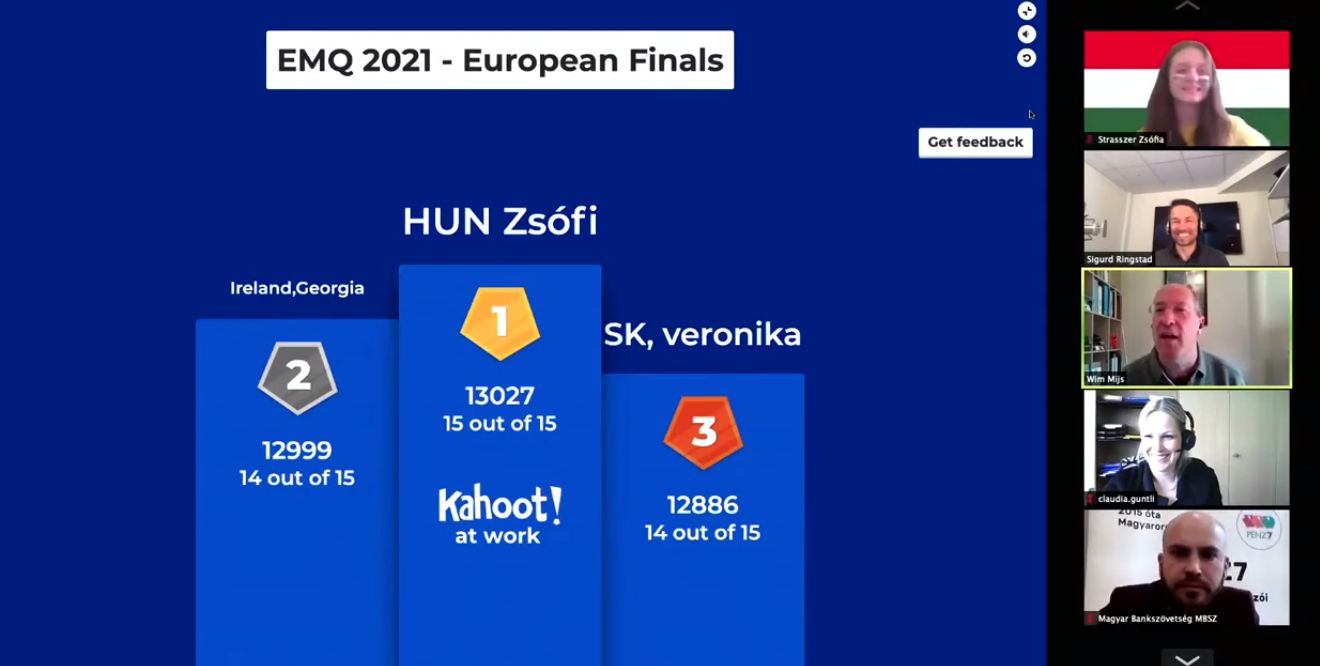

Have you received a notification informing you that a package is about to be delivered to your home? BEWARE! Fraudsters are trying to access our confidential data through text messages
A new type of phishing attack is actively spreading across several countries, and it reached Hungary in recent days. In the most recent fraud attempt, fraudsters are trying to access data by sending a text message about the impending delivery of a package.
The Hungarian Banking Association has confirmed the announcement of the National Police Headquarters and has called for intense caution by drawing attention to the wave of data theft attempts through text messaging.
MONEY WEEK has reached over 170 thousand students in 2021
The thematic week of the MONEY WEEK programme focussed on finance and business is launching
Due to the current situation caused by the pandemic, the MONEY WEEK programme helps teachers hold their lessons using solutions that can function in a digital environment. Online lessons and pre-recorded presentations are delivered, among others, by Mihály Varga, Csaba Kandrács, Deputy Governor of the Central Bank, as well as several executives in the Government sector and bank CEOs. This year, there is intense interest yet again in the in MONEY WEEK programme: approximately 170 000 students from more than 1 000 schools will join the programme through around 12 000 special lessons held with the participation of 700 volunteers. In 2015, Hungary was one of the founding members to join the European Money Week initiative, which takes place simultaneously in about 30 countries across Europe. This year, the school events of the Hungarian MONEY WEEK programme will take place in the March 1-5 period.
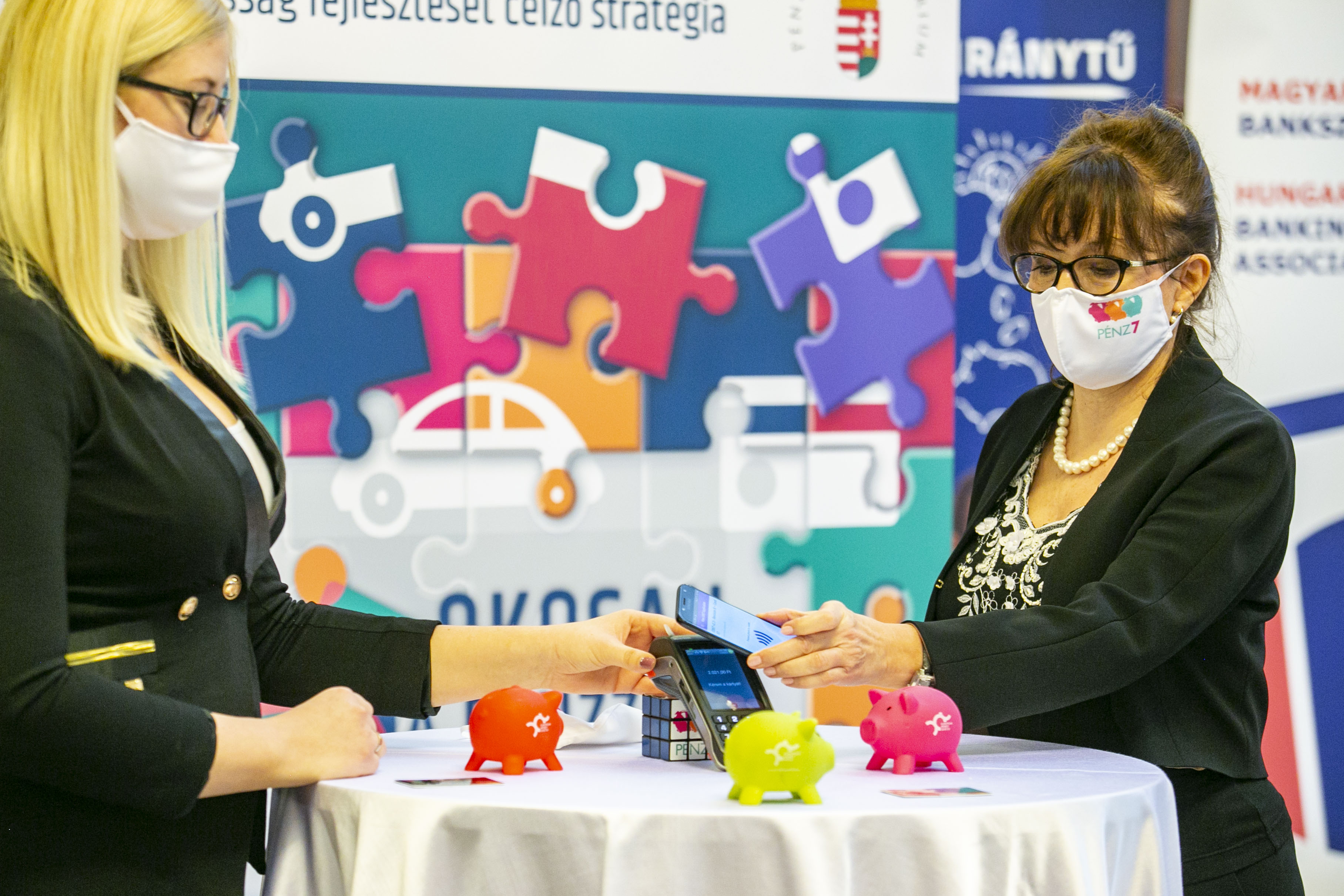
GOOD DEED Bank's Fast Track Lane programme
GOOD DEED Bank's Fast Track Lane programme is an educational donation drive, which aims to close the digital gap for schools and students in need.
https://www.bankszovetseg.hu/jotett-bank.cshtml?lang=eng
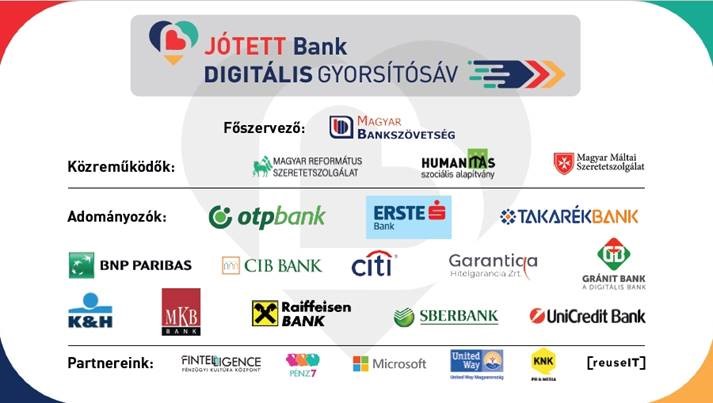
Co-operation agreement signed for the 2020/21 academic year, aiming to boost the financial and business knowledge of students
Six organizations have signed a co-operation agreement with a view to boosting the financial and business knowledge of students, as part of the thematic week of MONEY WEEK held in the 2020/2021 academic year.
It is for the 7th time that MONEY WEEK, a programme supporting the financial and business awareness of participants through interactive means is organised. Since its very launch, the programme has been part of the European Money Week initiative running parallel in approximately 30 countries. In the previous academic year, 217 thousand students from more than 1 200 schools participated in exactly 12 000 lessons in Hungary, with the involvement of 900 volunteers. In recognition of its high attendance rates, the Hungarian programme has been three times selected as one of the best in the Global Money Week event series.
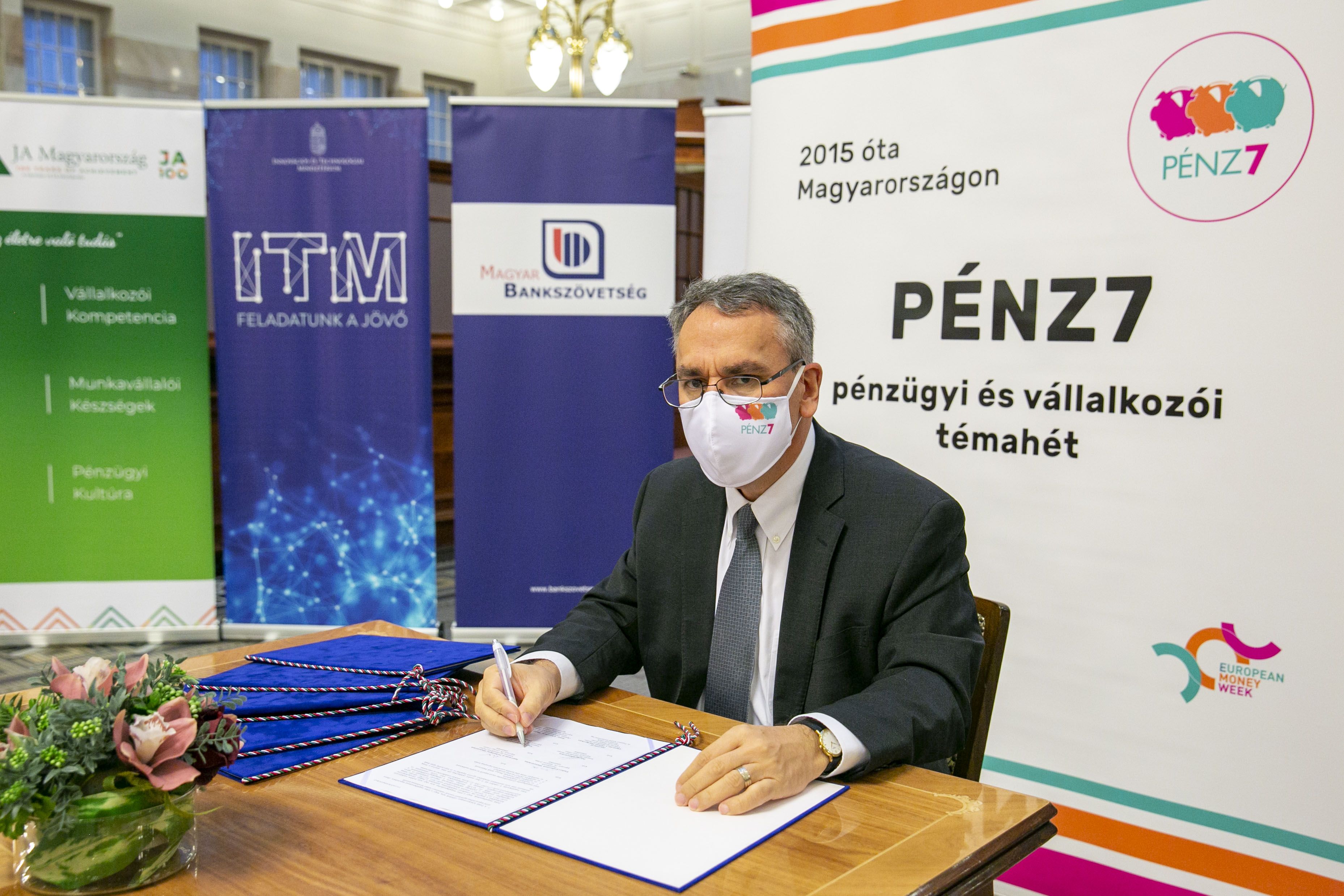
Strong Customer Authentication is coming in January for online purchases
Available only in Hungarian
Hungary’s banks take a proactive role in jumpstarting the economy
Hungary’s banks take a proactive role in jumpstarting the economy
Interview with Radován Jelasity, President, Hungarian Banking Association in Newsweek Hungary country report
GOOD DEED Bank is closing the week with nice results
PRESS RELEASE
A number of member banks joined the first event of the GOOD DEED Bank programme series created by the Board of the Hungarian Banking Association. On the closing day of Banking Blood Donation Week, Takarékbank’s staff and invited guests could donate blood in the bank’s head office building. Takarékbank was pleased to join Banking Blood Donation Week, the common initiative of the Hungarian Banking Association, the banking sector, the National Blood Service and the Hungarian Red Cross. “There's something you can't buy for money. It is blood, the liquid tissue that cannot be purchased and isn’t available on international markets - it can only be acquired through blood donation...”- stressed József Vida, Chairman and CEO of Takarékbank, who himself gave blood. “We estimate that by the end of the week we could potentially reach 600 blood donors in total. We wish to thank bank staff for participating in this noble initiative in such high numbers" - said Dr. Sándor Nagy, Professional Deputy Director-General of the National Blood Supply Service. In his welcome speech, Levente Kovács, Chief Secretary of the Hungarian Banking Association also pointed out the importance of setting an example and blood donation, and announced that after the Banking Blood Donation Week, a Digital Fast Track programme would also be launched at the end of the year to supply underprivileged students and schools with IT devices.
For further information on conducting interviews or with any queries please, contact Ágnes Sütő, Deputy Chief Secretary of Communications at the Hungarian Banking Association at suto.agnes@bankszovetseg.hu or on +36 70 9381609
Voluntary blood donation - also during the pandemic
PRESS RELEASE
Under the GOOD DEED Bank initiative, a sector-wide awareness-raising voluntary programme, today OTP’s staff and representatives of participating supervisory and government actors and invited guests could donate blood in the company’s office buildings. "Blood cannot be replaced by anything else, and thus it is equally important for everyone to ensure a smooth blood supply in Hungary, not only as part of day-to-day life, but also at times such as during the current pandemic, when co-operation and joint action are of paramount importance. " - said András Becsei, who donated blood in the bank's Deák Ferenc Street Office Building in the early hours of the morning.
For further information on conducting interviews or with any queries please, contact Ágnes Sütő, Deputy Chief Secretary of Communications at the Hungarian Banking Association at suto.agnes@bankszovetseg.hu or on +36 70 9381609
New bank on the Hungarian market - information provided by the Hungarian Banking Association about the GOOD DEED Bank programme
PRESS RELEASE
The Hungarian Banking Association and the domestic banking sector have launched a joint CSR programme under the name of JÓTETT Bank [GOOD DEED Bank]. In co-operation with the National Blood Supply Service and the Hungarian Red Cross, the Hungarian Banking Association will be organizing Bank Blood Donor Week between 12-26 October for the very first time, as the starting event of the GOOD DEED Bank programme. According to Radován Jelasity, President of the Hungarian Banking Association, it is symbolic that, on the very first occasion, GOOD DEED Bank, the new charitable programme initiated by the Association's Board, shows the strength of co-operation between financial institutions during the Covid-19 pandemic: "Banks help rebuild the economy by maintaining access to credit, while, by donating blood, we aim to help people recover and prosper" – explained the President.
For further information on conducting interviews or with any queries please, contact Ágnes Sütő, Deputy Chief Secretary of Communications at the Hungarian Banking Association at suto.agnes@bankszovetseg.hu or on +36 70 9381609.
Press Release of the HBA's General Meeeting
In Memory of Miklós Pulai
Miklós Pulai, former secretary general of the Hungarian Banking Association, who was an iconic character of the Hungarian banking history passed away at the age of 94. It is with deep sadness, the Hungarian banking community and the Hungarian Banking Association bid farwell to Mikós Pulai.
Entire memoriam available only in Hungarian
In Memory of Zsigmond Gábor Erdély
Zsigmond Gábor Erdély, the second president of the Hungarian Banking Association passed away on 15 April 2020. He was a respected member of the Hungarian baking community and his professional career was always linked the the banking sector. As he was one of the founders of the Hungarian Banking Association, we will always remember him and his lifework.
Entire memoriam available only in Hungarian
How to adjust to the challenges of the Coronavirus pandemic - Emőke Bagdy (Hungarian Banking Association Press release on 9 April - An excerpt)
The leaders of the banking system feel duty to pay attention to the colleagues and customers in those situations when we face unprecedented challenges. Upon the request of the Hungarian Banking Association, Professor Emőke Bagdy has made an advice titled How to Adjust to the Challenges of the Coronavirus pandemic. The advice is accessible on the homepage of the Hungarian Banking Association (How to Adjust to the Challenges of the Coronavirus pandemic), and the audio files can be downloaded from the digital channel of Professor Bagdy (https://soundcloud.com/bagdyemoke/). Only Hungarian.
Entire article available only in Hungarian
Press release on the sustainability of the financial services and on our lifes shaped by the changing working conditions
Banking services are lifeblood in case of emergency as well. Today there are 1,956 bank branches and 95 per cent of them are open. There are around 5,000 ATMs in the country and 147,000 POS terminal is in use for credit/debit card payments. Until 15 April the contactless payment limit increases to 15,000 HUF. These numbers and measures taken ensure that the Hungarian financial services are fully sustainable amid the Coronavirus pandemic as well.
Entire relelase available only in Hungarian
Statement of the President of the Hungarian Banking Association
The Hungarian banking sector has to fulfil its commitments on four fronts. First of all, we ensure that the payments systems operate steadily and safely. Secondly, we ensure that our customers and colleagues stay safe and we take every reasonable measure. Thirdly, we support lending in the hope of ensuring the functioning economy and financial services. Finally, we show solidarity with the entire society.
Finally we have to say thanks to the customers who have managed to adjust to the situation. Also we have to say thanks to our colleagues in the bank branches who make this adjustment possible.
Take care of yourselves!
Entire statement available only in Hungarian
Press release on the financial management of the Coronavirus emergency
The Hungarian Banking Association welcome the measures taken by the Government and the Central Bank of Hungary which strives for mitigating the impact of the negative economic effects of the Coronavirus pandemic. Also, they could contribute to the revival of the Hungarian economy. We have to point to the fact that the measures taken by the Government and the Central Bank of Hungary was timely and proportional.
Entire release available only in Hungarian
Press release: Advice on the opening hours of bank branches based on the restrictions on movement related to the Coronavirus emergency
In the interest of reducing the Coronavirus infection, the Hungarian government imposed restrictions on movement today. Taking this into consideration the Hungarian Banking Association issued the following recommendation for its members. The opening hours of the branches is to be reduced and the branches have to close at 3 pm on day of operation. The Hungarian banking sector strives for providing open bank branches in every region of the country.
Entire release available only in Hungarian
Press release on the lending moratorium
The global coronavirus epidemic brings complex challenges for the economy.
The Prime Minister has announced that he will take significant economic measures. The main financial element of these measures is the moratorium on retail and corporate loan repayments until December 31, 2020. This can be a quick and efficient aid for families and enterprises in need. On March 19, 2020 the financial sphere, i.e. banks and leasing companies, stopped collecting repayments based on the measures prescribed by the government decree. However, customers who do not wish to take advantage of the moratorium may continue repaying their loans with the original terms of their contract – they possess both the right and the opportunity to do so.
The banking sector will ensure that a declaration can be submitted to indicate such an intent, and that it will be possible to retract in the future. We are currently working on the sample declaration form, we ask for your patience until it is published. Please do not contact banks’ customer services with your anticipatory questions as they might be overburdened in this time of emergency. We especially ask that you avoid walking into bank branches.
The detailed rules and the implementation process for the Prime Minister’s announcement are being consulted and elaborated. We kindly ask our customers to be patient in the next few days. Once the above mentioned technicalities have been worked out, everyone concerned will receive detailed information. The government decision and its indirect impact are very significant. The banking sector possesses the liquidity necessary for it. The interest income, the collection of which will now be delayed, amounts to nearly 450 billion forints, whereas the free liquidity ensuring the stability of the banking sector is over 13 000 billion forints. This volume is made possible by the regulations instated after the 2008 economic crisis that necessitate the accumulation of capital, as well as by the liquidity of money markets.
The financial sector trusts that through the precise and strict implementation of the government measures the national economy has the chance to get through these critical times over the course of a few months.
The duration of the moratorium extends beyond the crisis management period and is likely to stretch into the relaunch period. In addition to implementing the measures, the banking sector is also preparing to relaunch economic activity after the epidemic is over. In order to do this, it is essential to have a harmonized and all-comprehensive common economic package where Hungarian banks will play a key role, just as they have in the past. In order to sustainably finance the rebuilding of the national economy, it is necessary to terminate the extra burdens on the financial institutions sector. Therefore, we ask for all levies and special taxes burdening banks to be phased out starting from January 1, 2020.
March 19, 2020 Hungarian Banking Association
Press release of the Hungarian Banking Association
Owing to the Coronavirus pandemic, many governments are turning to crisis measures. During this period we definitely need to make consequent, sober and careful decisions built on international best practices. The Hungarian Banking Association is working on maintaining the financial stability of those families and companies which are not indebted and face difficulties through no fault on their own. We try to give professional advice in the hope of helping the financial sector and our customers. Also we do our best to mitigate the impacts of the emergency.
Entire release available only in Hungarian
Preventive measures in the bank branches
The participants of the banking sector closely monitor the news and information on the Coronavirus pandemic and they are doing their best to maintain the operation of the financial services. According to the Hungarian Banking Association, the Hungarian banking sector is stable and is going to remain stable in the future as well. In the hope of reducing the possibility of the spread of the disease, we kindly ask the customers to follow the instructions of the bank branches.
Thanks to our customers for their efforts.
Entire release available only in Hungarian
Press release on the continued availability of the banking services
Various European examples from the past weeks confirm that the entire European financial system is capable of serving its customers. The Hungarian banking sector operates on the basis of the uniform European and Hungarian rules and supervision and it has been prepared for the Coronavirus pandemic and its related risks. The Hungarian banking sector is stable and will remain stable. The participants of the banking system closely monitor the news on the pandemic and they do their best to maintain the financial services.
Entire release availabe only in Hungarian
Press release on how to curb and manage the spread of viral infections
Budapest, 09 March, 2020
In collaboration with MGYOSZ and the Hungarian Leasing Association, the Banking Association has prepared its guidelines, entitled “Recommendations by the Banking Association for financial institutions and related economic service providers of priority on how to manage the threat of an epidemic and an epidemiological situation”. Scroll down to read the Hungarian Banking Association’s Press Statement (available only in Hungarian) and CLICK HERE to download the “Recommendation”.
The PÉNZ7 Volunteer Program wins an award
The night before International Volunteers Day, the PÉNZ7 Volunteer Program received the „Pro Bono Initiative of the Year” award. A big THANK YOU to all the teachers and volunteers who contributed to banks’, the entrepreneurial sector’s and the government’s joint social program. We are grateful to and recognize all volunteers.
In 2019 PÉNZ7 was held in 1,235 public educational institutions, and reached as many as 205 thousand students.
We strongly believe that with our combined efforts, we can involve even more schools and teachers, and therefore develop the financial and entrepreneurial skills and financial literacy of even more children.
More information on the award is available here, in Hungarian: https://www.penz7.hu/hir-reszlet.cshtml?hirId=58
On behalf of the children, we would like to thank you for your time, support and shared experience.

Press release V8 Ljubljana
The 16th meeting of representatives of 8 banking associations from Central and Southeastern Europe concluded today in Ljubljana, organized by the Bank Association of Slovenia. The subject of discussions were current topics of banking operations in the region with an emphasis on systemic risks, digitalization, implementation of PSD 2 and AML5, business model and regulatory changes, cyber security, sustainable finance and others.
Here.
Press Release of the Extraordinary General Meeting of the Hungarian Banking Association (1 July 2019)
Press Release of the Extraordinary General Meeting of the Hungarian Banking Association
On July 1, 2019 the Hungarian Banking Association held an extraordinary General Meeting, where a new President, Vice-President and Board Members were elected, as was necessary due to recent changes in bank leadership.
The General Meeting of the Banking Association elected as president, with unanimous support, Mr. András Becsei, who had previously served as Vice-President. Mr. Radován Jelasity, previously Board Member, was elected to fill the vacated post of Vice-President. Ms. Éva Búza and Mr. József Vida received mandates from the decision-making body to be new Board Members.
The ordinary renewal of officials takes place every three years at the Hungarian Banking Association, with the next due in the spring of 2020. Therefore the officials that were elected at this occasion have undertaken to serve in their posts until the spring of next year. At that point, the Association will elect a new Board, a new Supervisory Board and a new Ethics Committee as part of the full renewal of officials.
In his speech, the newly elected President emphasized that the Hungarian Banking Association wishes to continue its constructive cooperation with the government and the central bank, through which the banking sector can provide a stable financial background for our growth – which has surpassed the EU average.
Special topics about the national economy were discussed at the CEO’s Forum, an event that took place as part of the General Meeting. The guest speakers of the meeting were Dr. László György, State Secretary for Economic Planning and Regulation from the Ministry for Innovation and Technology, who gave an up-to-date summary through his presentation entitled “Challenges and Tasks to Improve Our Competitiveness”, and Mr. Miklós Vecsei, Commissioner from the Ministry of Interior, who discussed ways to help disadvantaged regions catch up to others.
1 July 2019, Budapest Hungarian Banking Association
Changes in the personnel of the Board of the Hungarian Banking Association
Due to his new duties, Mr. Mihály Patai has decided to step down from his position as President of the Hungarian Banking Association. Mr. Patai was Vice-President for 2 years, after which he took leadership of the Hungarian Banking Association for 8 years, as President. The first half of our current decade was spent trying to find solutions to the complex financial impact of the global economic crisis. The second half concentrated on starting to boost the national economy and then rendering it sustainable. Under the leadership of Mr. Mihály Patai the Hungarian Banking Association has become a defining and recognized advocacy group of the entire financial sphere. The Hungarian Banking Association wishes to say thank you to Mr. Patai through the professional and personal recognition of his work as President.
Based on the Rules of the Hungarian Banking Association, members will elect the next president from the Chief Executive Officers of member institutions within the next 3 months, at an extraordinary General Meeting. A new member of the board will also be chosen at this meeting, to replace Mr. Tamás Bernáth (Hungarian Development Bank).
The Hungarian Banking Association celebrates its 30th anniversary
In 2019 the Hungarian Banking Association celebrates the 30th anniversary of its establishment. On this notable occasion, the Hungarian Banking Association organised a two-day international event held on 4-5 April.
Our aim with the event series was to duly commemorate the jubilee and look back on the past three decades, summarising what we have learned, and evaluating the current position of the domestic banking sector, as well as its future opportunities, challenges and tasks. With the help of our high-ranking foreign presenters we reviewed Hungarian, Europe-wide and global financial and economic processes and trends.
The event was attended by the delegations of thirteen countries, including the banking associations of Central and Eastern European countries; high-ranking representatives of the Chinese financial sector, Government officials; the management of the Central Bank and the CEOs of banks present in Hungary.
On the opening day of the event series, the international financial leaders’ forum organised in MKB Bank was opened by Mihály Varga, Finance Minister, followed by the presentations of renowned speakers, such as members of the management of the National Bank of Hungary and the Hungarian Banking Association, as well as senior international bank managers, including representatives of Frankfurt Main Finance, the Asian Financial Co-Operation Association (AFCA), the China Development Bank and the Croatian Banking Association.
You may download the programme of the Financial Leaders’ Forum and the presentations delivered at the event from here.
After the Financial Leaders’ Forum, OTP Bank invited participants to a Gala Dinner, where Andrea Bártfai-Mager, Minister without Portfolio responsible for the management of national assets, Gergely Gulyás, Minister heading the Prime Minister’s Office and Sándor Csányi, Chairman and CEO of OTP Bank welcomed attendees.
On the closing day, in the morning of 5 April, the Hungarian Banking Association organised an international conference with the support of OTP Bank, opened by András Becsei, Vice President of the Hungarian Banking Association. On behalf of the Government, Balázs Rákossy, State Secretary at the Ministry of Finance Responsible for the Utilization of EU Funds also delivered a presentation, along with László Windisch, Deputy Governor of the National Bank of Hungary. Out of the representatives of the domestic and international banking sectors, Sándor Csányi, Chairman and CEO of OTP Bank; Mihály Patai, President of the Hungarian Banking Association; Wim Mijs, CEO of the European Banking Federation (EBF) and Zhang Fang, Deputy Chief Secretary of the Chines Banking Association also held presentations.
You may download the programme of the International Conference and the presentations delivered at the event from here.
Following the Conference, the delegations of European banking associations discussed the topic of co-operation between Europe and Asia with Yang Zaiping, Chief Secretary of the Asian Financial Co-Operation Association (AFCA).
The special jubilee events were concluded with the Annual General Meeting of the Hungarian Banking Association.
Downloadable material for lectures:
2019. április 4.
- Mr Hubertus Väth, Managing Director, Frankfurt Main Finance - The banking sector’s development before and after the Brexit
- Mr Zoran Bohacek, Chief Advisor, Croatian Banking Association - Tasks and challenges of the banking sector from the perspective of the CEE
- Mr Yang Zaiping, Secretary General, Asian Financial Cooperation Association - The AFCA Approach
- Mr György Zolnai, CEO, Raiffeisen Bank Hungary - Hungary, as a bridge between East and West
- Mr András Becsei, Vice President, Hungarian Banking Association - The Development and Prospects of Traditional Banks in Hungary
2019. április 5.
- Mr Sándor Csányi, Chairman & CEO, OTP Bank - The lessons of three decades, the future vision of the banking sector
- Mr Mihály Patai, President, Hungarian Banking Association - The role of the Hungarian Banking Sector in the Economic Growth
- Mr László Windisch, Deputy-Governor, the Central Bank of Hungary - Macroeconomic aspects of banking regulation and supervision
Communication of the General Meeting of the Hungarian Banking Association
The Hungarian Banking Association celebrated the 30th anniversary of its establishment on April 4-5, 2019 with a ceremonial program series. This anniversary date coincided with the 100th anniversary of the establishment of the Banking Association’s predecessor, the Association of Savings Banks and Banks (TÉBE). On the opening date the financial sector held an International Financial Leaders’ Forum, which was opened by Minister of Finance, Mihály Varga.* The closing event of the program series was the Hungarian Banking Association’s General Meeting, where the leaders of the Banking Association’s members decided to adopt the following communiqué:
On the occasion of our 30th anniversary, we are grateful to the banking leaders and their work who founded the Hungarian Banking Association in 1989. With the step they took, the Hungarian banking sector was able to reestablish its own advocacy group after forty years of forced suspension. In the past few decades the Hungarian Banking Association became a well-known and definitive professional advocacy institution. Its activities cover the entire financial sphere and its domestic and international involvement has become indispensable in the field of advocacy, cooperation for economic development and the raising of financial awareness. The Hungarian Banking Association has become the “voice” of the Hungarian banking sector that people expect to, from time to time, publish guiding opinions, resolutions on both domestic and international economic changes.
These days worry mixes with trust when we speak about Europe’s economic and financial developments. Despite the challenges we face, we still must represent our fundamental interest, which is for the European Union’s economy to grow, for the Union to strengthen and for all those nation states which are part of it geographically, economically and culturally to find their homes within it. It is based on sustainable economic growth that our sector’s fundamental interest is to moderate the uncertainties and detrimental consequences of BREXIT. This is also the reason why we support that our neighbors from the South should enter the EU as soon as possible. It is the common interest of the nation states of a unifying and growing European economy to play a definitive role in the development of the world economy. Here we must emphasize that the banking sector can ensure the growth of the European economy through the role it plays in individual countries and its existing liquidity. At the same time the foundations for increasing our regional and international competitiveness can only be laid down by an efficient and unified European regulatory environment.
Amidst the many extraordinary challenges of the past few years, the President of our Association, Mr. Mihály Patai, has quoted a Bible-derived expression for cyclical development several times: the seven years of famine and the seven years of plenty. The first period not only burdened the sector with many types of loss, but also, lacking the necessary sources, developments that would have been necessary lagged behind. The banking sector concluded a successful year in 2018. At the current state of the cycle, hopefully at the beginning of an upward trend, we must make up for what has been delayed both in terms of development and efficiency. This is the only way we can provide the necessary impulses to aid the development of sustainable economic growth in the age of digital transition. We cannot forget our seven years of famine, since on the one hand the true balance sheet is derived from the evaluation of both halves of the cycle, while on the other, lessons from society may greatly help new regulations to improve competitiveness, and with it, sustainable growth.
The upcoming period will concentrate on the digitalization of banking services. The entire banking sector is preparing to grant all the innovative services that can provide the customer experience through a truly safe IT interface. The banking sector is preparing to take the lead in the market as the provider of safe financial services, and the foundations for this endeavor will be its commitment to innovations, the capital power of the sector and its comprehensive experience in IT and knowledge about its customers. Today, the Hungarian banking sector is in the forefront internationally in customer safety, and this will continue to be so in the digital age. From the point of view of customer safety, it is also important that the regulator provide the same conditions and establish the same requirements for both the old and new, the classic and the innovative actors of the market.
As part of the anniversary program series, the Hungarian Banking Association’s Golden Beehive Awards were awarded to upper leaders who have played a significant role in developing the banking sector and to professionals who performed outstanding work for the Banking Association.
Award recipients:
For their work in the banking sector:
- Mr. Włodzimierz Kiciński, Executive Vice President of the Polish Bank Association,
- Ms. Erika Kovács, Chair of the Hungarian Financial Arbitration Board,
- Mr. János Nyemcsok, General Deputy Chief Executive Officer of MKB Bank
- Mr. Jenő Siklós, Deputy Chief Executive Officer of Gránit Bank,
- Ms. Andrea Wéber, General Manager at CIB Bank,
- Mr. László Wolf, Deputy Chief Executive Officer of OTP Bank.
For their work at the Hungarian Banking Association:
- Ms. Erzsébet Büki, Head of Product & Sales at Oberbank,
- Mr. Zoltán Fényi, Chief Legal Counsel at Sberbank,
- Mr. Csaba Molnár, Head of Department at Raiffeisen Bank,
- Mr. Zsolt Pál, Associate Professor at the University of Miskolc,
- Mr. Szabolcs Pintér, Chief Accountant at Bank of China.
*After the Financial Leaders’ Forum at MKB Bank, OTP Bank invited the delegates from 13 countries, the government and central bank representatives and the Hungarian bank leaders to a Gala Dinner, where they were welcomed by Ms. Andrea Bártfai-Mager, Minister without Portfolio for the Development of Public Assets, and Mr. Gergely Gulyás, Minister of the Prime Minister’s Office. On the second day, the morning of April 5th, the sector organized an international conference with the support of OTP Bank, where Mr. Balázs Rákossy, State Secretary for the Utilization of EU Funds at the Ministry of Finance, and Mr. László Windisch, Deputy Governor of Magyar Nemzeti Bank (the Central Bank of Hungary) both held presentations. Presentations were also held by guests from the Hungarian and the international banking sectors, by Mr. Sándor Csányi, Chairman and CEO of OTP Bank, Mr. Mihály Patai, President of the Hungarian Banking Association, and Mr. Wim Mijs, Chief Executive Officer of the European Banking Federation. After this, the delegates from the European banking associations consulted on cooperation between Europe and Asia with Mr. Yang Zaiping, Secretary General of the Asian Financial Cooperation Association (AFCA).
April 5, 2019, Budapest Hungarian Banking Association
The Hungarian Banking Association welcomes AFCA’s representative
The Asian Financial Cooperation Association (AFCA) is one of the most significant regional non-governmental and non-profit organizations in the financial industry. This cooperation platform is devoted to building economic and financial connectivity with Asia, aims to facilitate joint governance with shared benefits and places it in global perspective. The Hungarian Banking Association is one of its founding members and a well-known European representative of AFCA. In order to exchange experiences, strengthen the integration of financial resources and enhance international cooperation, Ms. Li Wen, Business Supervisor of AFCA came to work with us in Budapest for a longer period.
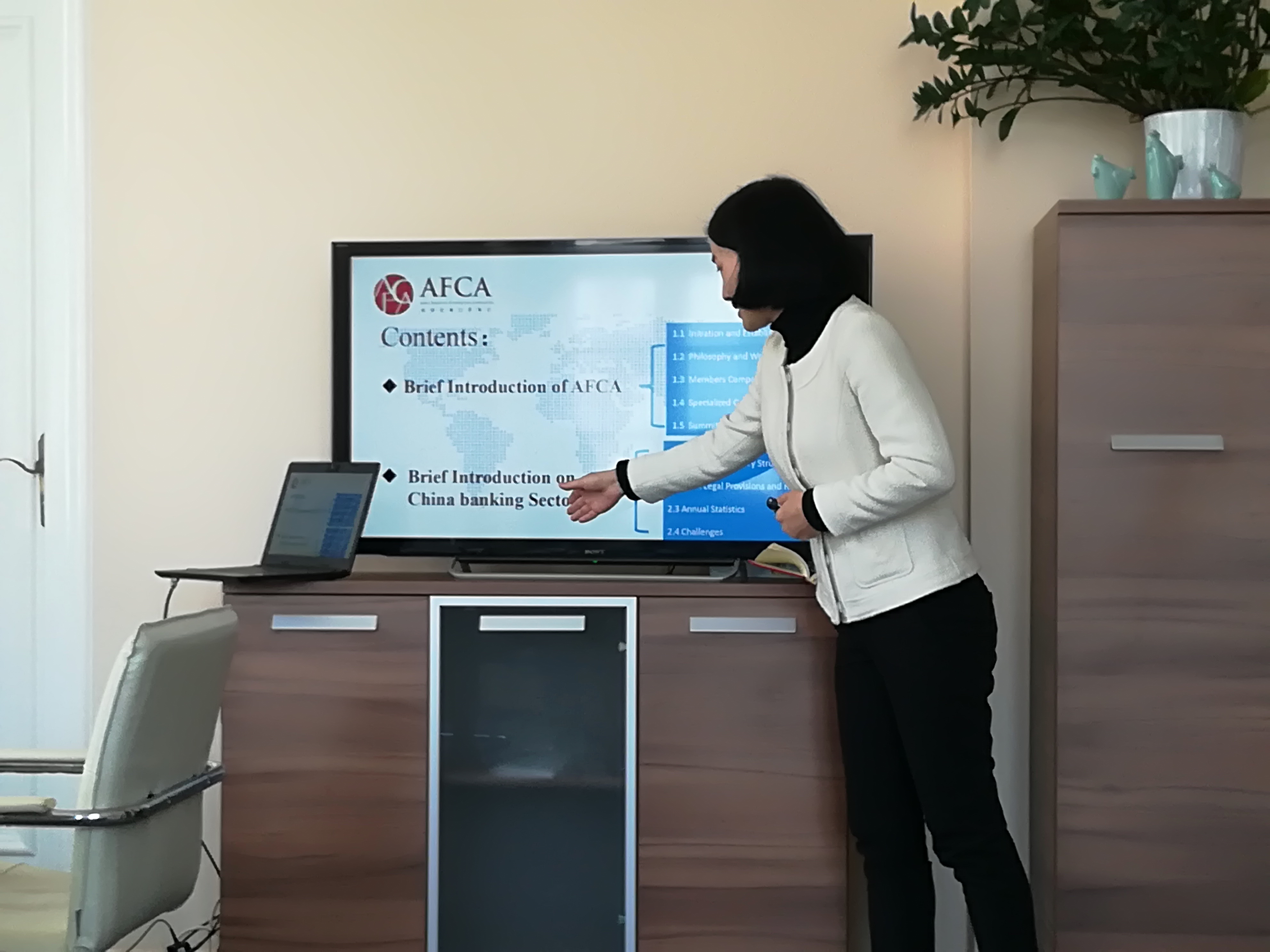
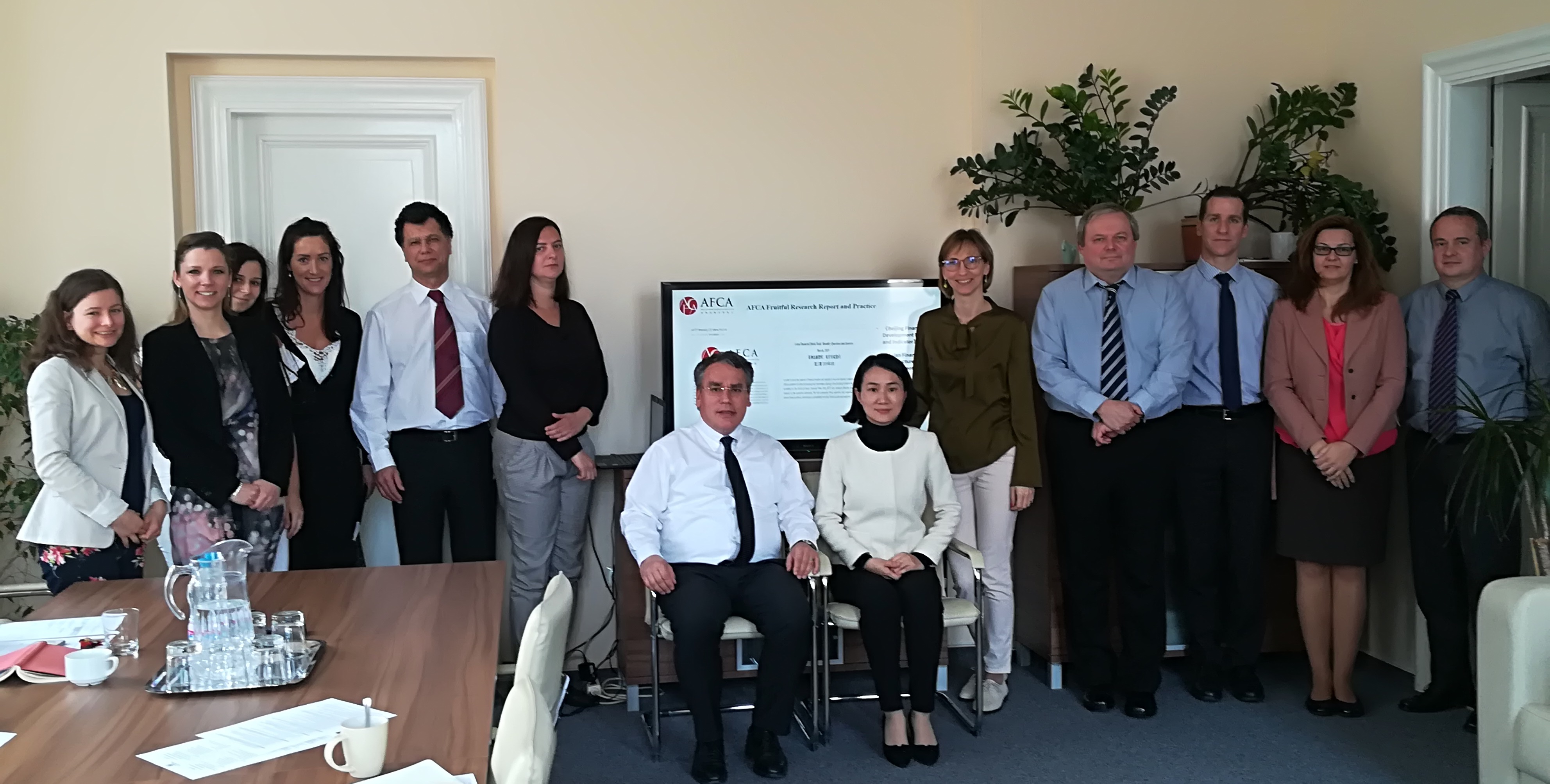
Money Week
Sorry, this entry is only available in Hungarian.
Best of Budapest Stock Exchange – A member of HBA staff receives the Investment Literacy Award
The BÉT Legek (Best of BSE) Awards Gala is one of the key events for the Hungarian capital market, which this year recognized outstanding performances on the stock exchange in 2018. In January, the Hungarian Banking Association’s employee, Ágnes Sütő, Deputy Secretary General, Communications received the Investment Literacy Award. The laudation mentioned Ms. Sütő’s enduring achievements in adopting the Hungarian program series (PÉNZ7) from the European Banking Federation’s International Money Week. Each year, the PÉNZ7 program series reaches an exceptionally high proportion of students and teachers on a European scale. The program’ organizers, the Ministry of Human Capacities (the project administrator), the Ministry for Innovation and Technology, the Ministry of Finance, the Hungarian Banking Association, the Money Compass Foundation, and Junior Achievement Hungary all collaborate in order to make PÉNZ7 as successful as possible. Ms. Sütő, winner of the award, is also the curator of the central bank’s Money Compass Foundation and has played an essential role in making this exemplary, cross-sectoral and trans-professional collaboration possible.
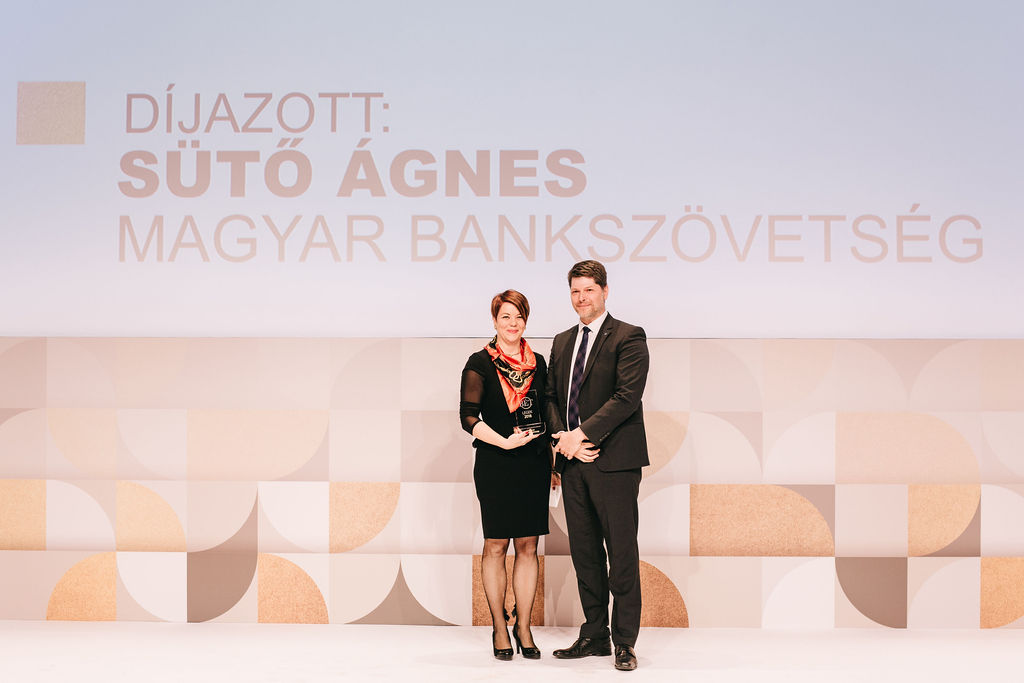
Ms. Ágnes Sütő from the Hungarian Banking Association accepts the Investment Literacy Award
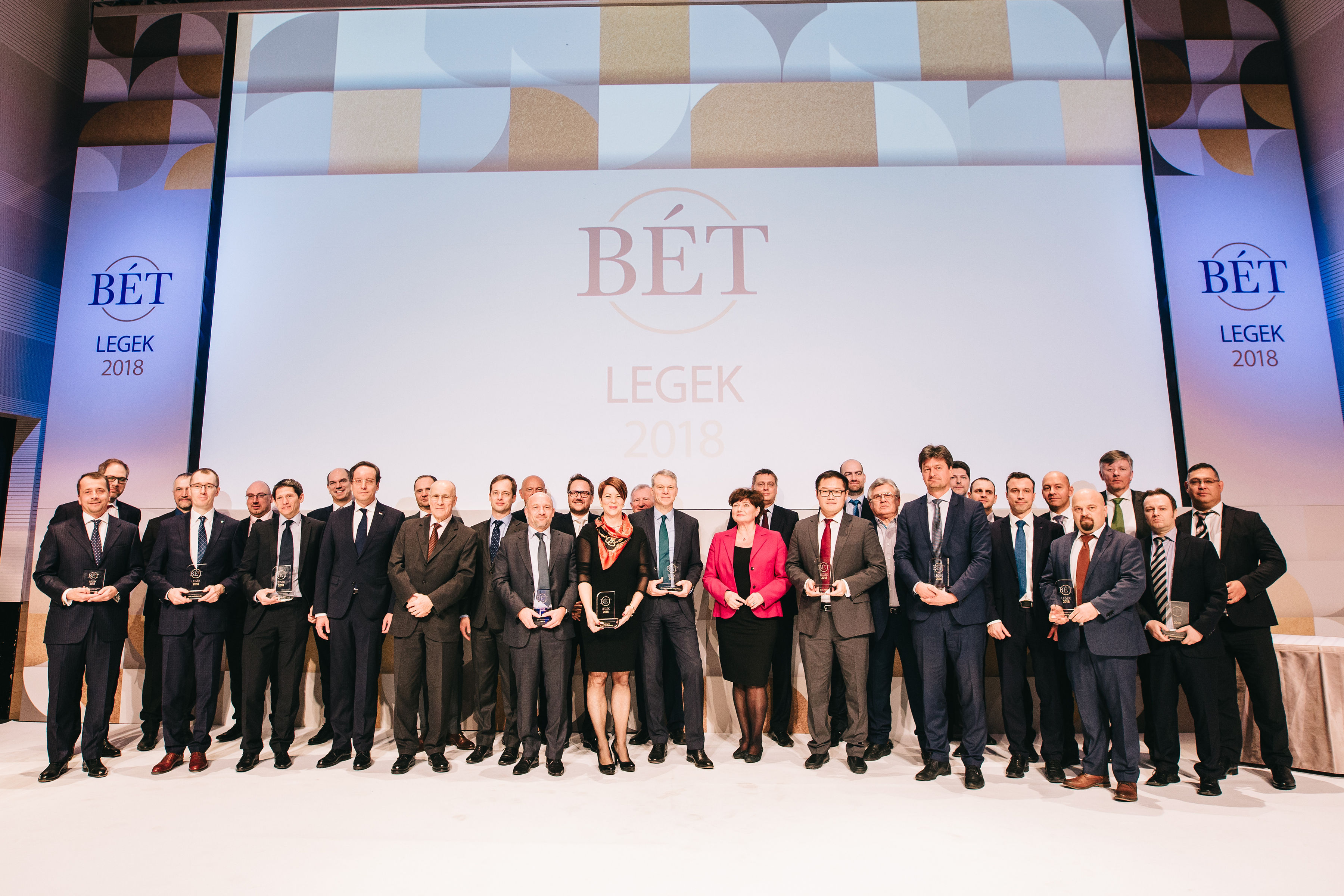
About the “BÉT Legek” Awards
For nearly twenty years, the Budapest Stock Exchange has held an annual ceremony, the “BÉT Legek” (Best of BSE) Gala, to recognize the best performances of the domestic capital market. A panel consisting of the members of the Stock Exchange Advisory Board decides on award recipients. In most of the categories, winners are selected on the basis of a quantitative methodology (for example, turnover data). In the case of the Online Trading Platform of the Year and the Financial Literacy Award, the winner is chosen after evaluating the entries received and - it the case of the former - on the basis of user ratings as well.
Central European Covered Bond Conference
Sorry, this entry is only available in Hungarian.
Cyber Security Month (October 2018)
Sorry, this entry is only available in Hungarian.
How not to get caught up in the web of fraudsters
PRESS MATERIALS
October 9, 2018
How not to get caught in the phishing net
Each month over 100 people in Hungary fall victim to phishing
Although companies in the market are continually improving their security systems, customers must also be more cautious
Over 100 cases of phishing are reported in Hungary each month according to statistics by authorities and corporations. This number, however only represents a fraction of the actual frauds committed: it is estimated that the number of people who fall victim to telephone and online fraud every year is among the thousands. Domestic market actors (credit institutions, telecommunication companies and utility service providers) apply advanced defense systems against phishers and alert their customers when they realize that fraud is being committed. Still, we must always pay just as careful attention to the money on our bank accounts as to the money in our wallets. With the aid of their joint press event and statement, the Hungarian Police Headquarters, the Hungarian Banking Association and the National Cyber Security Center would like to emphasize that preventing cyber crime is a common social interest and task.
Communiqué by the General Meeting of the Hungarian Banking Association
On 20 April 2018, the Hungarian Banking Association held its annual General Meeting, attended by the CEOs of financial institutions, as well as Mihály Varga, Minister for National Economy and Deputy Governors of the National Bank of Hungary: Ferenc Gerhardt.
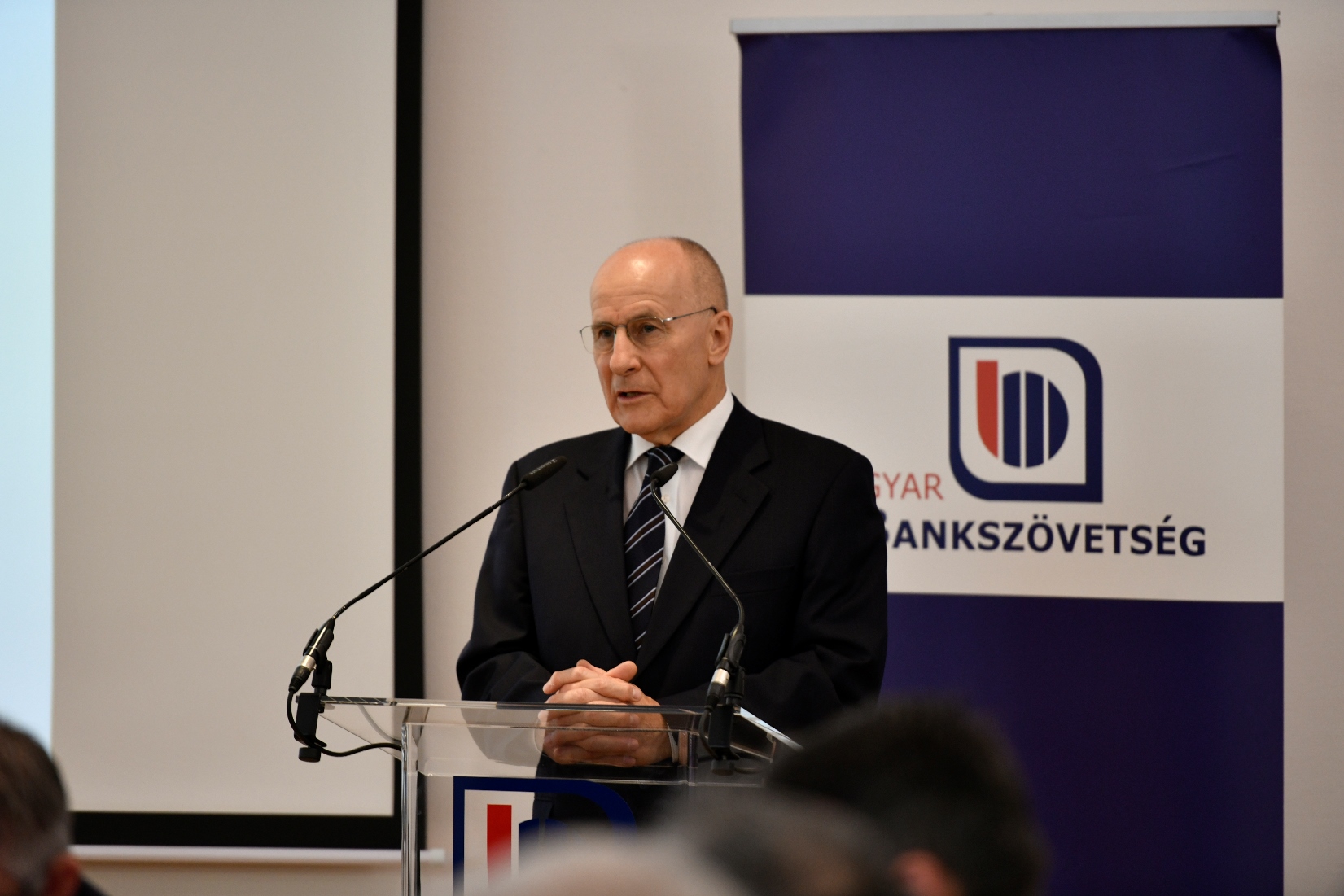
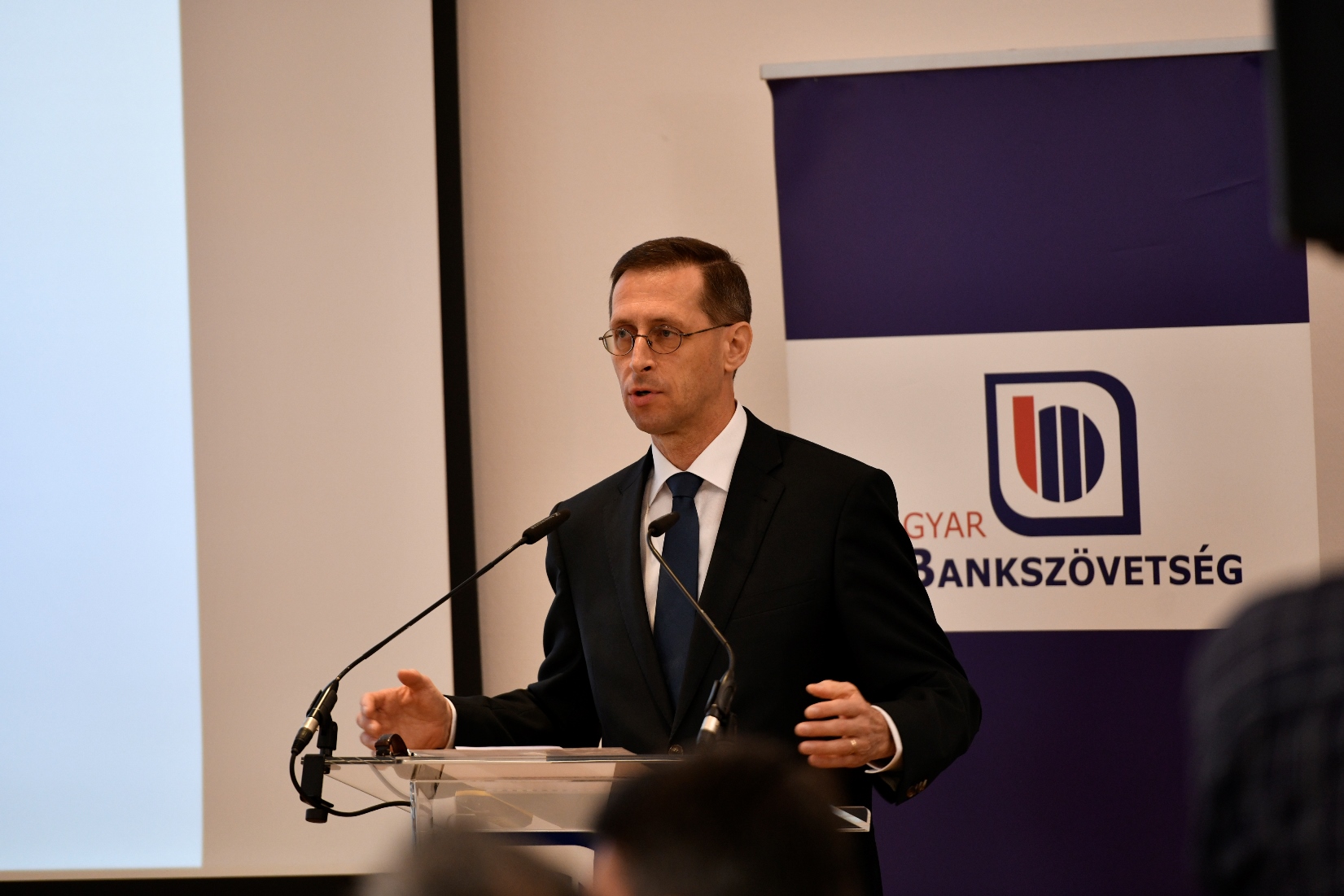
The General Meeting commemorated Mr Zoltán Urbán, Member of the Hungarian Banking Association’s Board and former CEO of Eximbank, who had passed away tragically and unexpectedly.
The General Meeting elected Tamás Bernáth (MFB - CEO) as the new Member of the Hungarian Banking Association’s Board.

The CEOs of the Hungarian Banking Association’s member institutions have decided to issue the following statement:
Communiqué
We can report that after a long and difficult period following the year 2008, in 2017 the Hungarian banking sector closed an outstandingly good year. Last year’s profitability fits in with international and regional trends. The profits realised typically went into profit reserves, which, due to more intense lending activities, support the accelerating growth of the economy. The foundations of the banking sector’s positive results were laid down by the sector’s stable operation and the favourable evolution of lending costs. At the same time, keeping up with the dynamic rate of technical evolution and changing customer needs requires on-going rejuvenation, adaptation and innovation on the part of the sector’s players.
‘The banking sector can only serve the economy’s development in an economic environment offering predictable legal, taxation and governance conditions, and other economic players also expect a similar environment. Therefore, in our relationship with the legislator and the authorities, we continue to place the emphasis on co-operation and scrupulous professional discussions.’ – explained Mihály Patai, President of the Hungarian Banking Association.
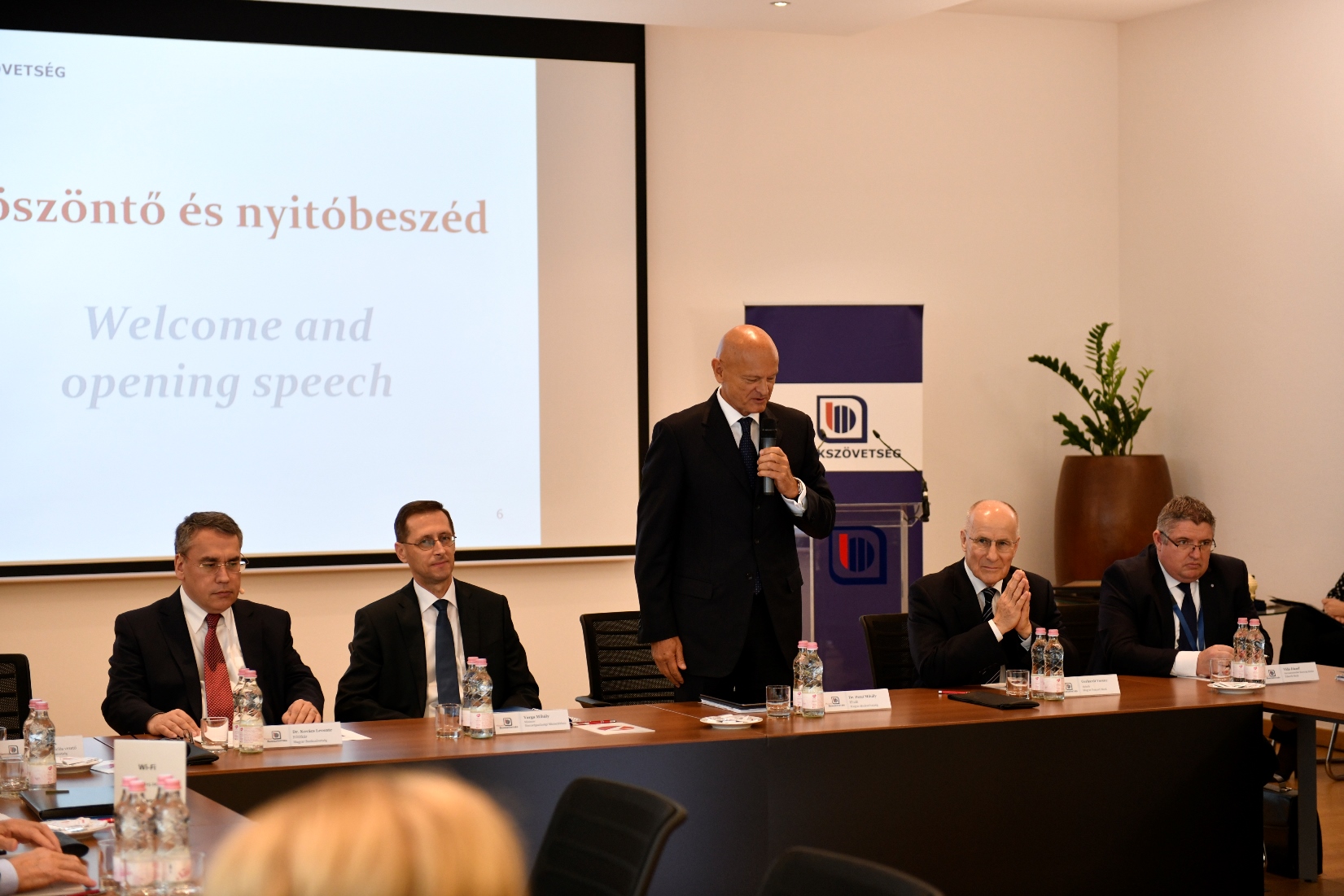
All players in the Hungarian banking sector support the key joint objective of strengthening continuity and predictability in financial policy. This can ensure the successful short-term and long-term operation of businesses and creditors alike. After the dynamic utilisation of EU funds, a new era is approaching, where each economic player is compelled to find the competitive development path that will determine its future. The domestic banking sector has sufficient capital strength and liquidity for funding any necessary reorganisation and developments.
We must not forget about the international competitive situation either. In order to improve our competitiveness, it is essential that in the years ahead of us we quit the regulatory race taking place amongst European states, by overcoming bureaucratic over-regulation at national level. The achievement of this objective could be greatly helped if the legislator involved representatives of the financial sector in the preparatory process of legislation from an early stage in the regulatory process. To allow the Hungarian economy to perform well and in a sustainable way, and to facilitate its extension beyond national borders, the financing Hungarian financial institutions must reclaim and retain their regional competitiveness. Therefore, we consider the lifting of extra burdens, initially imposed as crisis management solutions, inevitable. They include
- the staged discontinuation of special taxes imposed on banks and financial institutions,
- the whitening of the economy and the reduction and eventual withdrawal of the transaction levy, which goes against the elimination of cash, including, in particular
- the abolishing of all forms of taxes and levies imposed in respect of free banking services (such as the free cash withdrawal allowance of 150 thousand HUF/month).
The Hungarian financial market is part of the European and global markets. At times when protectionist trends also threaten the Hungarian economy, the assertion of our interest can only be achieved subject to the harmonised development of the European Union and the deepening of economic integration, and therefore we are committed to these objectives. We also believe that the conclusion of Brexit negotiations in a way that allows existing economic connections to be retained, is to be commended. In terms of global bank regulations, we consider the globally consistent application of regulations desirable, to ensure that the development of the European Union’s financial system and the extension of its economy can take place free of competitive disadvantages, in a sustainable manner.
The Hungarian Banking Association traditionally grants awards to bank colleagues who have made a significant contribution to the operation and development of the banking sector, at its General Meeting. In 2018, the Hungarian Banking Association’s Golden Beehive Award was granted to:
- Bence Gáspár (OTP Bank) for his outstanding communication activities and dedication in the banking sector;
- Rita Jeges (Erste Bank) for her dedicated and constructive support for the Hungarian Banking Association’s work;
- Marcell Király (K&H Bank) for his outstanding work in the corporate financing and SME development areas of the banking sector;
- Róbert Nagy (Garantiqa Hitelgarancia) for his outstanding and innovative activities contributing to the growth of guaranteed lending to small and medium-size enterprises;
- Attila Rankó (Deutsche Bank) for his outstanding professional activities in the area of payments and in the adaptation of European banking regulations.
20 April 2018
Photo: Dániel Németh
Hungarian Banking Association
Opening Ceremony of the Money Week Financial Literacy Conference and the Fintelligence Center
Sorry, this entry is only available in Hungarian.
The Central Bank’s Recommendation on Real Estate Risk
Sorry, this entry is only available in Hungarian.
Opening Ceremony of the Money Week Financial Literacy Conference and the Fintelligence Center in Miskolc
Sorry, this entry is only available in Hungarian.
In memory of Zoltán Urbán
This content is only available in Hungarian.
Contactless card security - Press Conference
This content is only available in Hungarian.
Further strengthening Chinese-Hungarian financial and economic relations
This content is only available in Hungarian.
Joint international campaign to prevent money laundering - a short summary of the European Money Mule Action (EMMA3)
This content is only available in Hungarian.
Certified Consumer-Friendly Housing Loans may crush interes rates
This content is only available in Hungarian.
All significant banks now offer consumer-friendly housing loans
This content is only available in Hungarian.
June opens the road for banks to grant Certified Consumer-Friendly Housing Loans
This content is only available in Hungarian.
Communication from the Hungarian Banking Association's General Meeting (12 May 2017)
Statement issued by the General Meeting of the Hungarian Banking Association
On May 12 ,2017 the Hungarian Banking Association held its annual General Meeting, which, next to the CEOs of financial institutions, also hosted guests Ágnes Hornung, Secretary of State at the Ministry for National Economy and the Deputy Governors of the National Bank of Hungary. At the General Meeting, elections were held for each member of the management.
The CEO’s of the Hungarian Banking Association’s member institutions have decided upon issuing the following statement:
Official statement
We can report about the year 2016 with confidence that the positive signs of a turning trend are already showing, which can be a stabilising, what’s more, invigorating factor in the growth of the local economy.
This is of special significance, given the fact that the financial sector has been suffering significant losses since 2008. As a result, internal cost levels were reduced to exceptional levels. At the same time, cost-cutting was marked by the transaction levy, booked as cost, as well as the exceptionally high level of special taxes. In the last decade, this went hand-in-hand with the inevitable postponement of numerous investments.
In 2016, the improvement of the economy in general, along with market recovery, created a one-off opportunity to cut back on bank provisions. The sale of card company stocks and dividends originating from foreign markets created revenues that were significant at sector level, but were also one-time or unique in nature.
’In response to market and innovation challenges, in the following years the banking sector will implement significant IT developments and investments. At the same time, banks will also have to maintain tight cost control, which will result in moderate growth even in the medium term, falling significantly short of the European average.’ – explained Mihály Patai, (RETIRING/RE-ELECTED) President of the Hungarian Banking Association.
The activities of the banking sector are characterised by a constructive evaluation of past events and a positive outlook, as well as intense competition not only on the domestic market but also in an international context. Hungary’s international position and its regional significance require the extension of both production and international co-operation, for which the banking sector can provide the development resources required. At the same time, the bilateral confidence structure of financing necessitates the reinstatement of the banking sector’s reputation, which is the responsibility of all decision-makers. To be able to support the fast and plannable development of the economy, financing entities also need a predictable regulatory environment. This involves the reduction of special taxes to European levels, the abolition of the transaction levy and the drafting of legislation offering mortgage lenders the possibility to enforce their rights in an appropriate manner. The latter requires that changes are based on impact analyses, and are pre-planned and pre-agreed.
Digitalisation changes the services offered by financial institutions at an unprecedented rate. The costs of digitalisation developments will stay with the banking sector as key cost items for many years to come, while the effects of income / cost reduction will only be felt in the longer run. Digital progression can only be achieved in a safe manner if developments take place to the extent of real customer requirements, and in line with any changes in these. For this, as a core condition, we rely on deeper and more intense professional co-operation in both the Hungarian and European legislative process, and also in banking supervisory activities. We believe that human resources essential for such developments can be ensured by reducing bureaucracy and the administrative burden.
World economy is undergoing a process of change, and new challenges are diverse. It is the partnership and financial co-operation of the European Union and the North American economic zone – the world’s two most developed economic regions – that will ensure appropriate living standards and offer the possibility of on-going development. Therefore, boosting the international role the European Union plays is in our shared interest – and therefore is also in the interests of Hungary. Over the past years, the financial role of China has taken on a new dimension, while Russia’s influence in world matters has not diminished. By showing mutual respect for our differing historical development paths and cultures, we will see further economic and financial opportunities open, on the grounds of dialogue and shared interests. The continued organic development of the global economy and financial markets requires that key representatives of the world economy work in close co-operation. This can be significantly helped by international bank groups with a long tradition, which pursue intense activities in key countries of the world, and also locally, in Hungary.
As representatives of our sector, we must take a position on the direction and speed of Europe’s economic progression. International bank groups serve the entire European retail and business clientele along the same principles and in the same quality, also taking local requirements into consideration This also proves that Continental Europe can only be a strong, influential and stable area from an economic and financial aspect if it can ensure that and reduce, and in the long term eliminate the economic disparity still hindering progress. European international bank groups can facilitate this economic progress, which helps the elimination of disparity in the long term, by collecting funds, facilitating money flows and offering credit. In doing so, they have shared interests with financial institutions in Hungarian ownership, which also offer services to European standards, motivated by the sustainable development of Hungary, which is both their objective and a pre-condition to their existence.
The Hungarian Banking Association elects a new management once every three years, for which the time has come at the present General Meeting. At the General Meeting the Hungarian Banking Association HAS ELECTED XY AS ITS PRESIDENT/re-elected Mihály Patai, as its President; and HAS ELECTED/RE-ELECTED XY/András Becsei as its Vice President; XY/Henrik Auth as Chairman of its Ethical Committee. For the next three years, the following Board Members have been elected: XY/ Éva Hegedűs, Radovan Jelasity, Pál Simák, Zoltán Urbán, György Zolnai /XY.
It is by now a tradition that the Hungarian Banking Association recognises banking and partner colleagues who have made a significant contribution to the operation and development of the banking sector. In 2017 the Hungarian Banking Association’s Golden Beehive Award was granted to the following recipients:
• Anna Batka (Hungarian Banking Association) – for her dedicated management of the accounting, taxation and data reporting work groups over more than a decade,
• dr. Attila Bógyi (OTP Mortgage Bank) – for his active and outstanding activities in the legislative process affecting the banking sector,
• Zoltán Makó (Riot Police; National Bureau of Investigation) – for his outstandingly effective efforts in preventing and combating bank card fraud,
• Gyöngyi Németh Szűcs (Unicredit Bank) – for her outstanding efforts in the area of accounting regulations,
• Gábor Weissmüller (Citibank) – for his high-quality professional contribution to the prevention and combating of financial fraud.
Budapest, May 12, 2017
Hungarian Banking Association
Bearing responsibilities responsibly
This content is only available in Hungarian.

